






















































































































































































































































Instrumentation
Rendering/Biofuels

18 Rise of animal fats in biofuels
The use of animal fats in biofuels has been growing and is set to rise to meet the demands of the renewable fuels sector
Rendering/Sustainability
24 Circular protein in feed
The easing of EU regulations on using PAPs to feed pigs and chickens has opened up a sustainable feed source which can reduce EU imports of soyabean meal
Plant, Equipment & Technology
28 Global round-up of news
34 MIR for real-time plant monitoring
The use of MIR spectroscopy offers more accurate and precise real-time information to monitor and optimise oils and fats production

36 Latin America emerges
Although global palm oil production is dominated by Indonesia and Malaysia, Latin American countries are emerging as important players in the sector, showing leadership in adopting sustainable practices
39 The path to sustainability
How prepared is the oils and fats industry for the EU Deforestation Regulation and similar legislation in the USA? OILS & FATS
OFI reports on some of the latest projects, technology and process news and developments around the world


Comment
2 Individual choice?
News
4 EU approves merger of Bunge and Viterra
Biofuel News
10 EU imposes duties on Chinese HVO/FAME
Renewable News
12 Adani Wilmar acquires 67% stake in Omkar Chemicals
Transport News
14 Grampet opens new rail terminal in Romania
Biotech News
16 Bayer seeks protection from lawsuits
Diary of Events
17 International events listing Statistics
41 World statistical data
OFI International 2024
42 Show catalogue

VOL 40 NO 7
SEPTEMBER/ OCTOBER 2024
EDITORIAL:
Editor: Serena Lim serenalim@quartzltd.com +44 (0)1737 855066
Assistant Editor: Gill Langham gilllangham@quartzltd.com +44 (0)1737 855157
SALES:
Sales Manager: Mark Winthrop-Wallace markww@quartzltd.com +44 (0)1737 855114
Sales Consultant: Anita Revis anitarevis@quartzltd.com +44 (0)1737 855068
PRODUCTION:
Production Editor: Carol Baird carolbaird@quartzltd.com
CORPORATE:
Managing Director: Tony Crinion tonycrinion@quartzltd.com +44 (0)1737 855164
SUBSCRIPTIONS: Jack Homewood subscriptions@quartzltd.com +44 (0)1737 855028
Subscriptions, Quartz House, 20 Clarendon Road, Redhill, Surrey RH1 1QX, UK

© 2024, Quartz Business Media ISSN 0267-8853
WWW.OFIMAGAZINE.COM

A member of FOSFA
Oils & Fats International (USPS No: 020-747) is published eight times/year by Quartz Business Media Ltd and distributed in the USA by DSW, 75 Aberdeen Road, Emigsville PA 17318-0437. Periodicals postage paid at Emigsville, PA.
POSTMASTER: Send address changes to Oils & Fats c/o PO Box 437, Emigsville, PA 17318-0437
Published by Quartz Business Media Ltd
Quartz House, 20 Clarendon Road, Redhill, Surrey RH1 1QX, UK oilsandfats@quartzltd.com +44 (0)1737 855000
Printed by Pensord Press, Merthyr Tydfil, Wales
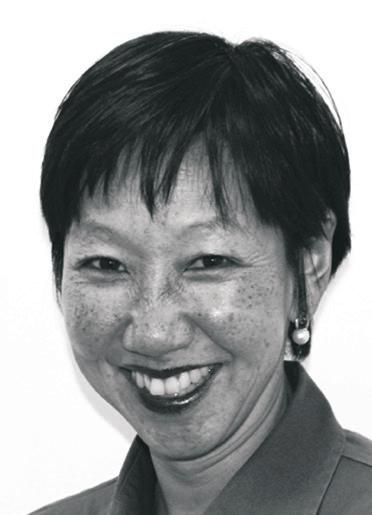
Tobacco, ultra-processed foods, alcohol and fossil fuels kill 19M people globally and lead to 34% of all deaths, says a new World Health Organization (WHO) report.
The blame for this lies not on individuals making poor choices but on “big industry” wielding significant power and undermining measures to reduce smoking, drinking and obesity, according to the ‘Commercial Determinants of Non-communicable diseases (NCDs) in the WHO European Region’ report.
“A small number of trans-national corporations … wield significant power over the political and legal contexts in which they operate, and obstruct public interest regulations which could impact their profit margins,” WHO says. With goals to generate profit, maximise product sales and drive consumption, industry tactics include marketing strategies targeted at children and young people, misleading consumers, making false claims about products or environmental credentials, political lobbying, and funding research or consumer groups for influence.
Launching the report on 12 June, Belgian deputy prime minister Frank Vandenbroucke said: “For too long, we have considered risk factors as being mostly linked to individual choices. We need to reframe the problem as a systemic one, where policy has to counter ‘hyper-consumption environments’.”
The report says 53% of the world’s population are now overweight or obese, with the idea that individuals are the problem illustrated by PepsiCo’s chief executive saying “if all consumers exercised … did what they had to do, the problem of obesity wouldn’t exist”.
Promoting the idea that individuals – rather than businesses – are responsible for NCDs allows companies to present their own products, such as ‘low fat’ or ‘low sugar’, as solutions and portray themselves as protectors of individual freedom, WHO says. However, people may live in unhealthy living or working environments, or do not have the time or resources to make the “right” choice, the report says.
Individual-level policy interventions – which require changing, often addictive, behaviours – are also less effective than population-level policies and therefore least likely to reduce commercial sales and profits, WHO adds.
The report is damning but FoodDrinkEurope food safety, research and innovation director Rebeca Fernández, has countered this, saying: “To connect the consumption of processed foods with the tobacco and fossil fuel industries is irresponsible and outrageously misleading. We all need food – and we all need processed food.”
Wherever the responsibility lies, the scale of the NCDs problem is not in doubt.
WHO estimates that tobacco accounted for more than one million deaths a year or 10% of all deaths in the WHO European region in 2021. This was followed by alcohol (426,857 deaths, 3.84%) and diets high in processed meat, salt, sugary drinks and trans fatty acids (*ultra-processed foods) – said to be behind more than 350,000 deaths (3.52%).
WHO says there have been positive contributions to public health when companies implement health interventions such as reformulation to reduce salt content in food and the elimination of trans fats from the global food supply.
The challenge is whether individual, environmental, public policy and political economic systems can go far enough to tackle cardiovascular diseases, cancers and diabetes, and their risk factors.
Health policies, as well as government and industry regulations, will be among some of the many topics being addressed at OFI International 2024 on 9-11 September in Rotterdam. This issue contains our show guide and we warmly welcome everyone to our event.
Serena Lim,
serenalim@quartzltd.com
*Ultra-processed foods can be described as industrially-manufactured ready foods, with low nutritional value and high levels of sugars, sweeteners, salt, fat, trans fat and other additives, lacking in dietary fibre and vitamins and minerals found in unprocessed foods
Spain’s imports of Argentinian olive oil more than doubled in 2023 compared to the previous year due to a poor harvest and rising prices, according to a 26 June Olive Oil Times report.
At 660,000 tonnes, Spain’s 2022/23 harvest was its lowest in more than a decade, the report said. In addition, harvests had been poor across the Mediterranean basin, while Turkey – one of the few countries where production exceeded expectations – had introduced a bulk export ban.
Meanwhile, Argentina’s bumper 2023 harvest of 35,000 tonnes, had given the world’s largest producer outside the Mediterranean basin increased export capacity.
According to Argentine agricultural association Rural Rosario, the country’s virgin and extra virgin olive oil exports increased by 137% in the first 10 months of 2023 – reaching a record high 30,567 tonnes – against the same period in 2022. Spain was the largest market for Argentine olive oil exporters in 2023, with 34% of exports by value and 33% by volume. The USA and Brazil were other leading destinations.
CANADA: The government will invest up to C$3.04M (US$2.16M) over five years to support research for grain and oilseeds producers in the Atlantic region, World Grain wrote on 15 July.
Expected to focus on regional issues such as growing conditions, production challenges and agronomy, the funds would be given to the Atlantic Grains Council via the AgriScience Program – Projects Component, an initiative under the Sustainable Canadian Agricultural Partnership.

The European Commission (EC) has approved Bunge Global’s acquisition of Viterra on condition that the companies divest of Viterra’s oilseed businesses in Hungary and Poland and logistical assets connected to those operations, World Grain wrote on 2 August.
Last June, the two companies announced they had agreed to a merger that would create one of the world’s largest agribusiness companies, moving it closer in size and scope to leading agribusiness giants Cargill and ADM, the report said.
“We had concerns that the transaction could affect the supply chains of rapeseed and sunflowerseed in Central Europe, with potential ramifications across the food, feed, and biofuel industries," the EC said on 1 August.
However, following positive feedback during market testing, the EC concluded that the transaction would no longer raise competition concerns if its conditions were followed.
"The divestiture of Viterra’s entire oilseeds business in Hungary and Poland will preserve
competition in these markets.”
The EC decision was conditional on full compliance with its recommendations, which would be monitored by an independent trustee under commission supervision.
“Preventing market concentration in agricultural supply chains is crucial for both farmers and consumers,” EC executive vice president in charge of competition policy Margrethe Vestager said.
Regulatory approval for the transaction would also be needed in North and South America and China, World Grain wrote.
Headquartered in the USA, Bunge is mainly active in processing, selling and trading of oilseed meals and oils. The company also sells grains, milled products and unprocessed oilseeds, sugar and other agricultural products.
Viterra, which is headquartered in the Netherlands, trades agricultural commodities including grains, oilseeds and oilseed-based meals as well as oils. The company also sells other unprocessed products, such as cotton and milled products.

A California-based startup – backed by Microsoft co-founder billionaire and climate tech investor Bill Gates – has developed a dairy-free butter alternative, The Guardian reported.
Savor had developed the new product following trials to create dairy-free alternatives to ice cream, cheese and milk using a thermochemical process to build fat molecules, creating chains of carbon dioxide, hydrogen and oxygen, the 16 July report said.
According to the company, its product will have a significantly lower carbon footprint, potentially having less than 0.8g CO2 equivalent per calorie compared to “real” 80% fat unsalted
butter’s standard climate footprint of approximately 2.4g CO2 equivalent per calorie.
“We are currently working through regulatory approval to be able to sell our butter. We are not expecting to be able to move forward with any kind of sales until at least 2025,” Savor’s chief executive Kathleen Alexander said.
Although meat and dairy alternatives have become increasingly popular, replicating the flavour of butter had not always been achieved, The Guardian wrote.
According to Savor, the flavour of its butter alternative is more exact. “We had informal taste panels … and we expect to perform a more formal panel as part of our commercialisation and scale-up efforts,” Alexander said.
Speaking about the dairy-free initiative in an online blogpost, Gates wrote: “The idea of switching to lab-made fats and oils may seem strange at first. But their potential to significantly reduce our carbon footprint is immense. By harnessing proven technologies and processes, we get one step closer to achieving our climate goals."
According to the United Nation’s Food and Agriculture Organization (FAO), the livestock industry – comprising all dairy and meat agricultural farming – accounts for 14.5% of global greenhouse gas (GHG) emissions.
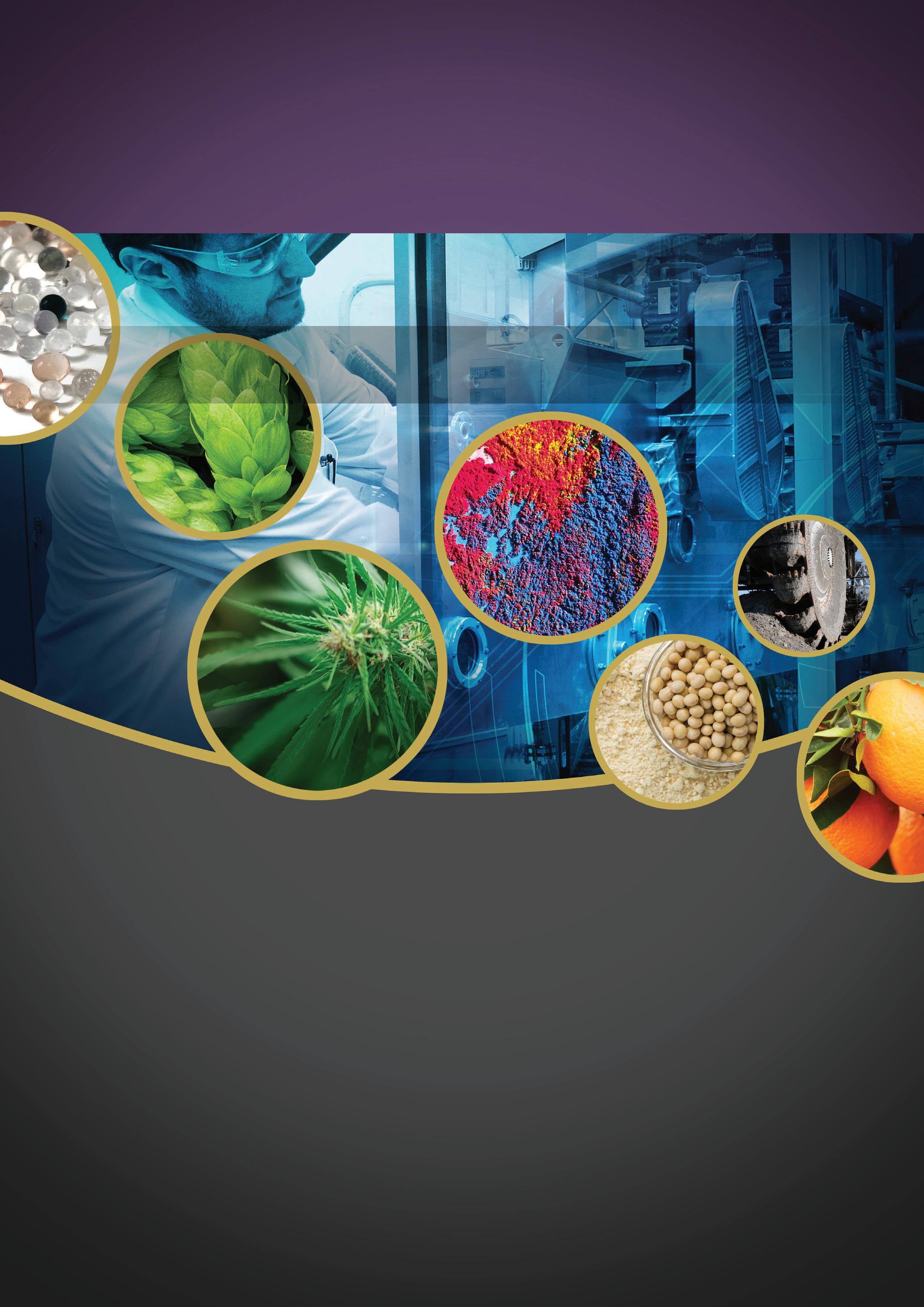


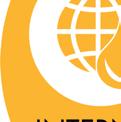

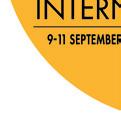





Develop, scale and commercialize with Crown – the proven, single-source partner for product and process optimization.
Bring new products to market faster and more sustainably with Crown. As a leader in oilseed extraction for 70 years, Crown’s technical expertise, guidance, proven technologies and Global Innovation Center transform your ideas for protein concentrates, food/beverage, botanicals and other new product segments into pro table realities. With Crown’s full-scale, state-of-the art pilot plant, analytical lab and training facilities, you can test product and process feasibility, run benchtop scale to custom processing and commercialize with ef cient, continuous operations backed by Crown’s aftermarket support and eld services. Accelerate your market opportunity — partner with Crown for a full lifecycle solution. Start up, scale up and expand with CPM and Crown’s expertise.
and Crown





Global agribusiness giant ADM is offering fully verified, segregated and traceable soyabean meal and oil to European customers as EU deforestation regulations are set to take effect later this year.
Aimed at promoting the consumption of deforestation-free products within the EU to bring down greenhouse gas emissions and biodiversity loss, the EU Deforestation Regulation (EUDR) was adopted by the European Parliament in 2023 and will come into force on 30 December.
Under the EUDR, any operator or trader who places soyabeans, palm oil, coffee, cattle, cocoa, wood and rubber or their derived products on the EU market must
WORLD: The United Nations’ Food and Agriculture Organization (FAO)'s Vegetable Oil Price Index rose by 3% in June compared to the previous month.
The benchmark Food Price Index (FFPI) tracks changes in the international prices of the most globally traded food commodities and the FAO’s Vegetable Oil Price Index illustrates changes in international prices of the 10 most important vegetable oils in world trade, weighted according to their export shares.
According to a 5 July FAO report, the increase in the Vegetable Oil Index in June was driven by higher global prices for palm, sunflower and soyabean oils.
“After declining for two consecutive months, international palm oil prices rebounded in June, mainly underpinned by a reviving global import demand due to increased price competitiveness,” the FAO said.
“Meanwhile, world soyabean and sunflower oil prices continued to rise, underpinned, respectively, by firm demand from the biofuel sector in the Americas and declining export availabilities in the Black Sea region.”

be able to prove that the products do not originate from land deforested since 2020 or have contributed to forest degradation. They will also have to provide precise geographical information on the land where these commodities have been grown.
“Thanks to the … participation of our farmer network and our … US elevators and segregated transportation and logistics capabilities, we are in a position to supply all of our existing customers in Europe with soyabean meal and oil once new rules go into effect at the end of this year,” Sebastian Kuck, ADM general manager, EMEA Soy Crush, said on 8 July.
In March, the company launched a fully
traceable North American soyabean programme, re:source, which involved almost 5,300 farmers across 15 US states for the 2024 season. The programme verified, traced and segregated soyabeans from farms to their final destination.
In addition, the company said it would use the sustainability measurement platform TRACT, an industry-led joint venture, to provide enhanced traceability solutions to its customers across the supply chain.
Beyond North America, ADM said it continued to work across other key regions to pilot soyabean crushing and exporting of both soyabeans and meal to the EU in fully traceable and segregated supply chains.

Malaysia's FGV Holding has produced its first batch of European Union Deforestation Regulation (EUDR)-compliant crude palm kernel oil (CPKO), New Straits Times reported.
The achievement made FGV one of the first Malaysian companies to produce EUDR-compliant CPKO, the company said on 8 August.
The EUDR is set to take effect from 30 December, with companies having to prove that the
soya, cattle, palm oil, wood, cocoa, coffee and rubber products that they import into the EU, export from the EU or place on the EU market do not come from any area deforested since December 2020.
FGV said it had focused on sourcing its fresh fruit bunches (FFB) from three key sources: its own estates, FELDA’s settlers, and independent smallholders who were already in line with the EUDR, Malaysian Sustainable Palm Oil Certification (MSPO) or Roundtable on Sustainable Palm Oil (RSPO) traceability requirements.
According to its website, FGV is one of the world’s largest crude palm oil (CPO) producers, accounting for 3% of global and 14% of Malaysian production. The company’s palm upstream business forms the core of the group, which manages a total land bank of 439,725ha in Malaysia and Indonesia, producing approximately 3M tonnes/year of CPO. FGV operates in seven countries across Asia, Europe and North America and, apart from the palm oil sector, its operations also include sugar, integrated farming and logistics & support businesses.
Ukrainian rapeseed exports to the EU rose by around 6% in 2023/24 to just under 3.2M tonnes, making it the leading supplier of the oilseed to the bloc, Germany’s Union for the Promotion of Oil and Protein Plants (UFOP) reports.
Meanwhile, at just under 5.7M tonnes, EU-27 rapeseed imports from non-EU countries dropped by 24% from the 2022/23 total of 7.5M tonnes to 5.7M tonnes, the 19 July report said.
EU rapeseed imports from Moldova tripled to just under 250,000 tonnes although a major proportion of that could have originated from Ukraine, UFOP said.
At 18.3M tonnes, the Canadian harvest in 2023 was larger than in the previous year. However, the country delivered less than 100,000 tonnes to the EU in 2023/24 – a 59% drop year-on-year – due to increased domestic consumption and exports to the USA, both for biofuel production.
For example, shipments from Australia declined by around 43% to just less than 1.9M tonnes due to a smaller rapeseed harvest, which was down approximately 1.2M tonnes compared to the previous year to 4.9M tonnes.
The US Food and Drug Administration (FDA) has introduced a nationwide ban on the use of brominated vegetable oil (BVO) as an additive in food.
BVO – a vegetable oil that has bromine added to it – is used in small amounts to keep the citrus flavouring from floating to the top in some soft drinks.
Already banned in Europe and Japan, the FDA’s move followed a ban introduced in California in October.
After first proposing the ban in November, the FDA concluded that the use of
The Chinese government is looking to import more food from South Africa in a bid to reduce its reliance on agricultural exports from USA and Australia, the South China Morning Post (SCMP) quoted the Chinese ambassador to South Africa Wu Peng as saying to local media.
For decades, South Africa’s exports to China had been mainly minerals and metals but recently had included products such as soyabeans, wine, aloe gel and citrus fruits, the 16 July report said.
“This year, we are working hard with the South African side towards signing export protocols for … more goods,” Wu told IOL News.
South Africa has been China’s largest trading partner in Africa for 14 consecutive years, with trade in the first half of this year totalling US$27.5bn, according to China’s General Administration of Customs.
In the same period, imports from South Africa increased by 10.7% to US$17.29bn year-onyear, while Chinese exports to the African nation dropped by 18.6% in that period to US$10.2bn.
Lauren Johnston, an associate professor at the University of Sydney’s China Studies Centre, saidBeijing wanted to increase trade with African countries to reduce its dependence on countries such as the USA and Australia – particularly for products such as soyabeans, which were a vital source of feed for China’s large pig population.
BVO in food was no longer considered safe following the results of research conducted in collaboration with the National Institutes of Health, which found the potential for adverse health effects in humans.
“The FDA is taking this action as part of our regulatory authority over ingredients added to food, which includes re-assessing previously evaluated food ingredients and addressing safety concerns,” the agency said on 2 July.
The FDA has regulated BVO as a food additive since its removal from the codified
list of Generally Recognized As Safe or “GRAS” substances in 1970. As authorised, manufacturers were required to list BVO or the specific vegetable oil, such as brominated soyabean oil, in the ingredients list.
Few soft drinks in the USA currently contain BVO, according to the FDA.
The ban takes effect on 2 August but the FDA said the date for compliance was one year later to allow companies to reformulate, relabel and remove the inventory of BVO-containing products before the final rule was enforced.


WORLD: Global agribusiness giant ADM’s net earnings dropped 48% in the second quarter of this year due to lower soyabean crushing margins, World Grain reported on 31 July.
The company’s net earnings in the quarter ended 30 June were US$486M compared with US$927M in the previous year.
Operating profit in ADM’s Ag Services and Oilseeds segment fell 56% to US$459M from US$1.05bn.
Lower margins came from a smaller crop in the Brazilian state of Mato Grosso.
North American origination results were also lower as increased supply from Brazil and Argentina shifted export competitiveness to South American origins.
“Our services and oilseeds results are significantly lower than the record results of prior years due to the ongoing rebalancing of the supply-and-demand environment and overall lower farmer selling,” ADM president and CEO Juan Luciano was quoted as saying in a 30 July earnings call.
Global soyabean crushing margins fell due to more balanced supply-and-demand conditions and lower soyabean values caused by increased imports of used cooking oil (UCO).
The number of obese adults will reach 1.2bn globally by 2030, says a new report by five United Nations (UN) specialised agencies.
Published on 24 July, the latest annual ‘State of Food Security and Nutrition in the World’ report recorded a steady increase in adult obesity over the last decade, from 12.1% in 2012 to 15.8% in 2022. By 2030, the world was projected to have more than 1.2bn obese adults.
The double burden of malnutrition – the co-existence of undernutrition alongside levels of being overweight and obesity – had also surged globally across all age groups.
The report said that in 2023, around 2.33bn people globally faced moderate or severe food
insecurity. The lack of economic access to healthy diets also remained a critical issue, affecting over one-third of the global population.
The report revealed that over 2.8bn people were unable to afford a healthy diet in 2022.
"This disparity is most pronounced in low-income countries, where 71.5% of the population cannot afford a healthy diet, compared to 6.3% in high-income countries," the report said.
“Food insecurity and malnutrition are [also] worsening due to a combination of factors, including persisting food price inflation. Major drivers like conflict, climate change and economic downturns are becoming more frequent and severe.”
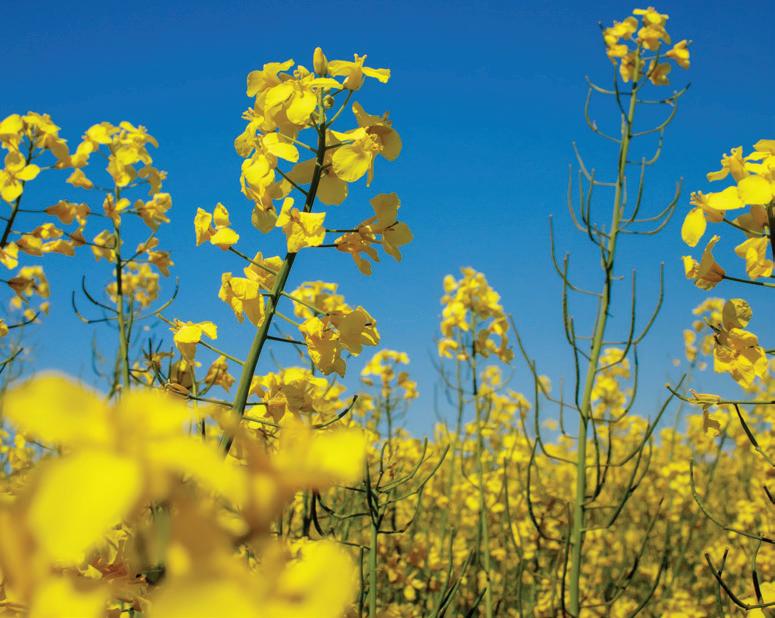
Worldwide rapeseed demand in 2024/25 is expected to exceed production, according to research by Agrarmarkt Informations-Gesellschaft reported by Germany’s Union for the Promotion of Oil and Protein Plants (UFOP).
Although global rapeseed consumption was expected to decline by 0.5% in 2024/25 to
88.7M tonnes, the International Grains Council (IGC) forecast world production at 87.2M tonnes, leaving a supply shortfall of 1.5M tonnes due to a reduction in planted area and forecasts of lower yields, the 4 July report said.
End-of-year stocks were therefore likely to decrease more sharply than previously expected, with the volume of rapeseed in storage forecast at 5.6M tonnes, 21% below the previous year’s level.
UFOP said it expected strong to rising prices during the planting season this year and advised farmers to plan rapeseed production areas to meet crop rotation requirements.
“Demand for rapeseed oil in biodiesel fuel and future hydrotreated vegetable oil (HVO) production is supported by the discontinuation of the option to credit palm oil-based biofuels towards greenhouse gas reduction obligations in Germany and other member states, including France and Sweden,” UFOP said.
The EU has reported a record number of potential olive oil fraud and mislabelling cases in the first quarter of this year, The Guardian newspaper wrote on 29 July.
The increase came against a backdrop of supply shortages and higher prices.
In the first quarter of this year, the EU recorded 50 “cross-border EU notifications” including mislabelling, potential fraud and safety cases involving contaminated oils, compared with 15 in 2018.
As the total was limited to cases reported

by member states to the EU directorate general for health, and did not include domestic cases, the true scale of incidents was likely to be much higher, the report said.
Incident reports included oils contaminated with unauthorised substances such as pesticides, mineral oils and one case where glass fragments were discovered. In addition, there were many cases where extra virgin olive oil was judged to be adulterated, for example by mixing it with poorer or cheaper quality oils, cases where
virgin olive oil was labelled as extra virgin, and several cases of misleading or false origin labelling, The Guardian wrote.
In total, 182 olive oil fraud and non-compliance notifications were sent to the EU since the start of 2023.
According to provisional figures from the International Olive Council, global olive oil production levels are expected to fall to 2.4M tonnes in 2023/24, down 27% from 2018/19 and lower than estimated consumption of 2.6M tonnes.








































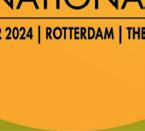


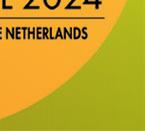

The European Commission (EC) is set to impose provisional anti-dumping duties on imports of hydrotreated vegetable oil (HVO) and fatty acid methyl esters (FAME) from China, according to the European Biodiesel Board (EBB).
Announced by the EC in a pre-disclosure document on 19 July, duties ranging from 12.8% to 36.4% would be introduced four weeks after the announcement.
In the interim period, the EBB said on 19 July that it would ask for automatic registration of imports during the pre-disclosure stage to help the EU biodiesel sector before the duties took effect.
The association, which represents European biodiesel (HVO & FAME) produc-
UK: The UK Department for Transport (DfT) said on 22 July that – subject to parliamentary approval – a 2% sustainable aviation fuel (SAF) mandate would be introduced in the country on 1 January 2025.
The proposed mandate would be introduced in phases starting at 2% in 2025 and increasing on a linear basis to 10% in 2030 and 22% in 2024. From 2040, the mandate would remain at 22% until there was greater certainty regarding SAF supply.
Hydro-processed esters and fatty acids (HEFA) supply would not be capped for the first two years but was expected to be set at 71% in 2030 and 35% in 2040.
ers, said it would closely monitor imports during the interim period and if there was an increase, it might request retroactive imposition of duties.
However, the EBB said it was “gravely concerned” at the EU’s unexpected exclusion of allegedly dumped Chinese sustainable aviation fuel (SAF) from the provisional measures.
“Today we obtained measures that will start to rebalance the scales. Our next step is to work with the EU to close loopholes that will otherwise undermine this good work and also to work with member states and the Commission to ensure any fraudulent practices are dealt with in the future by a more robust sustainability certification
system,” EBB president Dickon Posnett said.
“Our European businesses have been suffering for far too long under the pressure of unfairly priced Chinese.”
The EBB filed an anti-dumping complaint with the EC in October 2023.
In an earlier statement on 9 July, the EBB said that in Europe, Chevron Renewable Energy Group had furloughed German workers, Shell had paused the construction of a biodiesel plant in the Netherlands, bp was pausing a biofuel project in Germany and Argent Energy had closed a biorefinery.
“While Chinese imports are not the only reason for these decisions, the biodiesel dumping has contributed to the difficulties producers face.”

The US oilseed sector is calling for biofuel produced from imported feedstocks to be excluded from tax credits, according to a 10 July Agri-Pulse report.
Biofuel tax credits offered more for feedstocks like used cooking oil (UCO) or tallow, which had a lower carbon intensity.
The National Oilseed Processors Association (NOPA) said the tax credits included in the In-
flation Reduction Act were incentivising a sharp increase in feedstock imports and impacting domestic soyabean processors.
US imports of animal fat and vegetable oil more than doubled between 2020 and 2023, according to the US Department of Agriculture (USDA)’s Foreign Agricultural Service (FAS).
Imports of UCO from China, which more than tripled in 2023, have contributed significantly to the rise, according to the FAS data.
“Every pound of imported feedstock really does take a pound of domestic soyabean capacity,” NOPA president and CEO Kailee Tkacz Buller was quoted as saying.
The current 40B credit for sustainable aviation fuel (SAF) – set to be replaced by the 45Z incentive next year – allowed registered fuel importers to receive incentives, she said.
The association was planning to push for the new 45Z tax credit to be solely for domestic feedstock producers, she added. “We’re okay with it [imported feedstock] coming in, but we don’t think it should qualify for the tax credit.”
British multinational oil and gas company bp is set to invest US$48.54M (CNY 353M) in acquiring a 15% stake in Chinese renewable diesel and sustainable aviation fuel (SAF) producer Lianyungang Jiaao New Energy, S&P Global reported on 10 July.
Lianyungang Jiaao New Energy was owned by Zhejiang-based Jiaao Enprotech, which had 100,000 tonnes/year of SAF capacity, and the deal came amid market speculation that China was set to announce

SAF mandates, the report said.
In July 2023, China’s Civil Aviation Administration drafted a fuel standard to ensure the viability of alternative fuels in the aviation sector, S&P Global wrote.
According to a market source quoted in the report, the SAF industry is complex and requires significant funding with producers needing to plan for a potential used cooking oil (UCO) feedstock supply shortage.
“It makes sense for state-owned and
leading companies to take on SAF projects, given the high costs and intricate nature of the industry,” the source added.
Some industry participants are working on co-locating, converting and integrating their facilities to enter the SAF industry, according to another market source.
“I think some industry players are anticipating that the Chinese government will release SAF mandates, so most of them are getting themselves prepared.”














































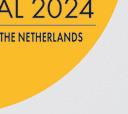





USA: Global agribusiness giant ADM and chemical company LG Chem have announced that they would not be moving forward with their joint venture project to produce lactic and polylactic acid (PLA) at production facilities in Decatur, Illinois.
The two joint ventures include GreenWise Lactic, of which ADM is a majority owner, and LG Chem Illinois Biochem, which is majority-owned by LG Chem.
PLA is a thermoplastic monomer derived from renewable sources, such as corn starch or sugarcane, and is used in a wide range of applications such as appliances, electronics, packaging, 3D printing and fibres.
“Since we originally announced our two joint ventures with LG Chem for lactic and polylactic acid in 2022, construction costs have skyrocketed,” Chris Cuddy, president of ADM’s carbohydrate solutions business, said on 12 July.
“We looked at a variety of options, but when the time came to make final investment decisions, it had become clear that these projects no longer represented a prudent use of our investors’ capital.”
UAE: Global Biopolymers has partnered with SS Royal Kit Emirates Investment to form a new bioplastics company based in Dubai.
The new company, Emirates Biotech, said on 22 July that it would focus on the production and marketing of polylactic acid (PLA) biopolymers across the Middle East, Africa and India.
Emirates Biotech said it expected commercial operations to start in early 2025, with construction of its first PLA production plant in the UAE starting before 2026.
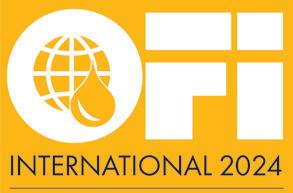
Indian multinational food and beverage conglomerate Adani Wilmar, which also produces oleochemicals, has acquired a 67% stake in speciality chemical company Omkar Chemicals, Startup Story reported on 13 July.
Omkar Chemicals operates a manufacturing plant in Panoli, Gujarat, India, with a production capacity of some 20,000 tonnes/year of surfactants. The company has plans to scale up production at the plant, which currently uses less than 10% of its capacity, according to the report.
As the deal did not require government or regulatory approval, Adani Wilmar – a joint venture between the Adani Group and leading Singapore agribusiness Wilmar International – was quoted as saying it expected to finalise the acquisition within three to four months.
The acquisition was a strategic step for Adani Wilmar as it looked to establish a strong production footprint in the speciality chemicals market,
Startup Story wrote. Although Adani Wilmar was active in the speciality chemicals sector through third-party manufacturing and by importing from Wilmar’s plants, the acquisition would enable in-house production, the report said.
Adani Wilmar is a market leader in food and edible oils in India. Its edible oil products include soyabean, palm, sunflower, rice bran, mustard, groundnut, cottonseed and blended oils, vanaspati and speciality fats. Its flagship edible oil brand Fortune was the largest selling product of its type in India, the company’s website said. As well as edible oils, Adani Wilmar also supplies pulses, rice, sugar and wheat flour.
The company produces oleochemicals including stearic acids, soap noodles, palmitic acid, oleic acid and glycerine for home and personal care products, including soaps, detergents, cosmetics, polymer, pharmaceuticals and industrial rubber.
A research team at Michigan State University, USA, has found that poplar trees can be engineered to produce squalene, offering an alternative to harvesting the oil compound from shark livers.
“Using engineered, nonfood crops like poplar may provide a more sustainable alternative for generating chemicals typically derived from fossil fuels, or even new speciality chemicals altogether,” the study team led by Björn Hamberger said on the university website on 8 July.
Squalene is used in cosmetic products and vaccines.
As part of the project, the team engineered poplars to produce squalene along two distinct chemical pathways.
One pathway used the gel-like substance known as cytosol found in the centre of cells, while another focused on producing squalene in chloroplasts, the organelles responsible for photosynthesis.
While the cytosol pathway

was discovered to interfere with poplar root formation, the chloroplast route produced 0.63mg/gm of squalene in leaves.
The team’s next step was to calculate the minimum sales price that poplar-produced squalene would need to be sold at to be commercially successful.
Shark-derived squalene was marketed at US$40/kg and the price for the poplar-produced compound was also calculated at US$40/kg.
However, Hamberger said
several options were available to boost the value of poplar-produced squalene.
“One way is increasing overall production, and the other brings us to the … world of perfumes and another marine animal product – ambergris.”
Produced in the digestive system of sperm whales, ambergris is used as a fixative in perfumes to prolong scents.
Hamberger said it should be possible to “upgrade” squalene to ambrein, another high-value terpene that made up ambergris.
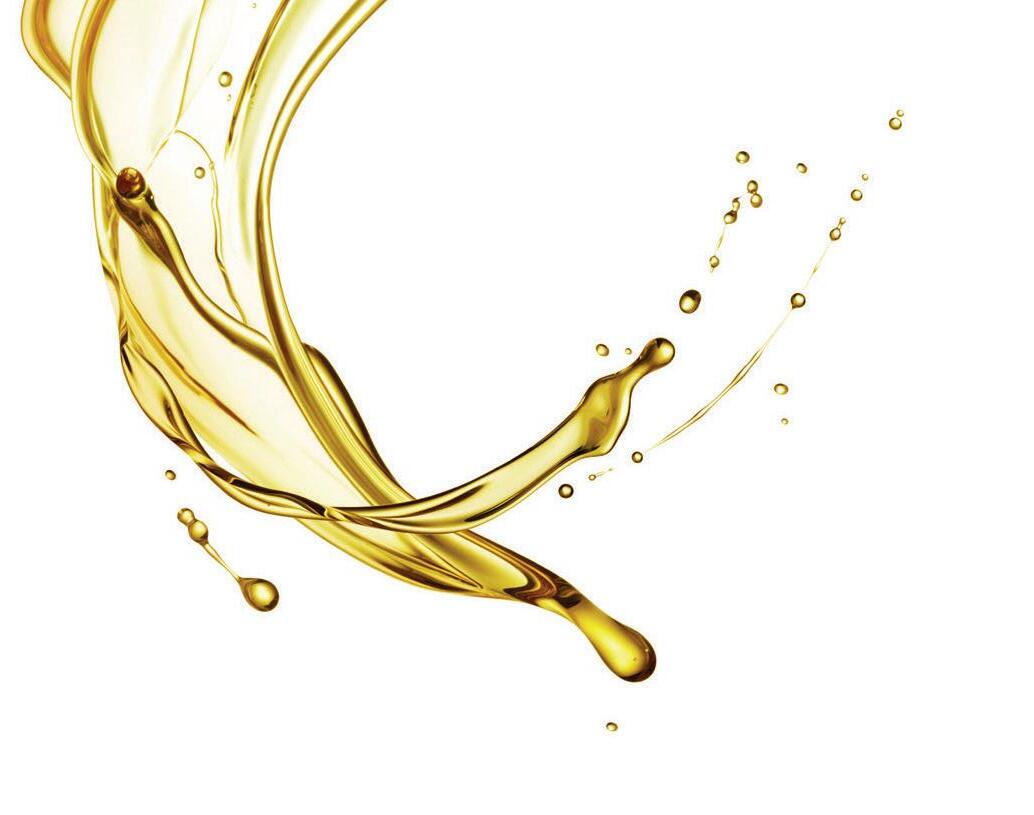


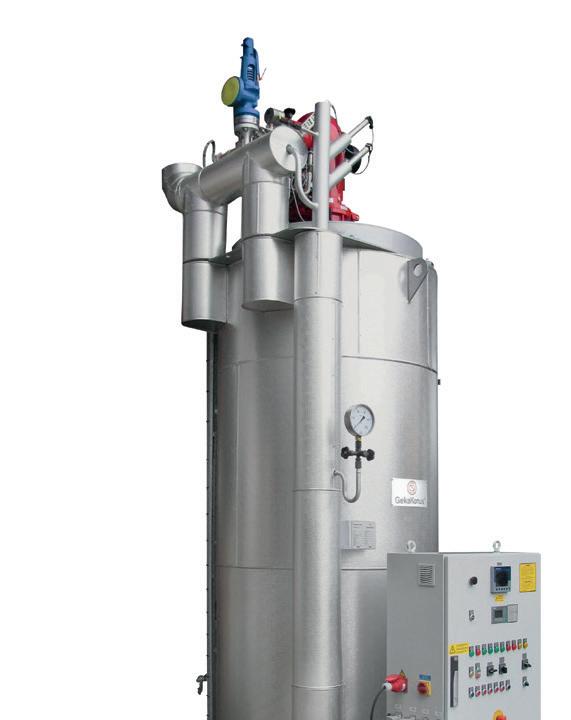








Private rail freight and logistics operator Grampet Group has opened a new 3M tonnes/year agricultural rail terminal in Romania, World Grain wrote on 21 June.
The grain trans-shipment terminal in Dornesti was set to strengthen Romania’s position as a railway and logistics hub in central and southeast Europe while boosting grain traffic from Ukraine, the report said.
Built through a public-private partnership with the Grampet Group providing an investment of €10M, the terminal had been designed for around-the-clock operations, the company was quoted as saying. As it
BRAZIL: Brazil’s privately-owned Grupo Potencial will invest BRL 200M (US$37M) in building two biofuel pipelines in the south of the country, the company’s vice president Carlos Hammerschmidt was quoted as saying in a Reuters report.
Scheduled for construction next year and subject to regulatory approval, the 55km pipelines would be the longest of their type in the South American country, the 24 June report said.
Hammerschmidt said the investment would boost Brazil’s energy pipeline network, which was about 5% of that of the USA.
One of the new pipelines would transport biodiesel, connecting Potencial’s Lapa biodiesel plant to fuel distributors, Reuters wrote.
The Lapa plant sold 65,000m³/month of biodiesel and planned to transport half of this volume via one of the new pipelines.
Potencial also had plans to produce corn ethanol and soyabean-based sustainable aviation fuel at the plant.
By 2027, Hammerschmidt said the country would expect 1% of fuel used in the aviation sector to be SAF.

used similar technology and equipment to Romania’s river and seaports, it was expected to streamline trans-shipments to the Port of Constanta, World Grain wrote.
Situated on the Ukraine border in northwest Romania, the new terminal was also expected to enable grain shipments from Ukraine – a major supplier of wheat, corn, barley and sunflower oil – to global markets, the report said.
Romania was one of several EU countries that had been used as alternative transit routes for Ukrainian grain to help offset slower exports via Ukraine’s Black
Sea ports after Russia’s invasion in February 2022, World Grain wrote.
During an inauguration ceremony at the terminal, Grampet Group president Gruia Stoica said the facility would allow simultaneous trans-shipment of eight Ukrainiantype wide gauge grain wagons and eight normal gauge Romanian-type wagons.
The group said it was the largest private freight rail transporter in south-eastern Europe, offering transportation, logistics, locomotive and wagon production, as well as other rolling stock components and leasing services.
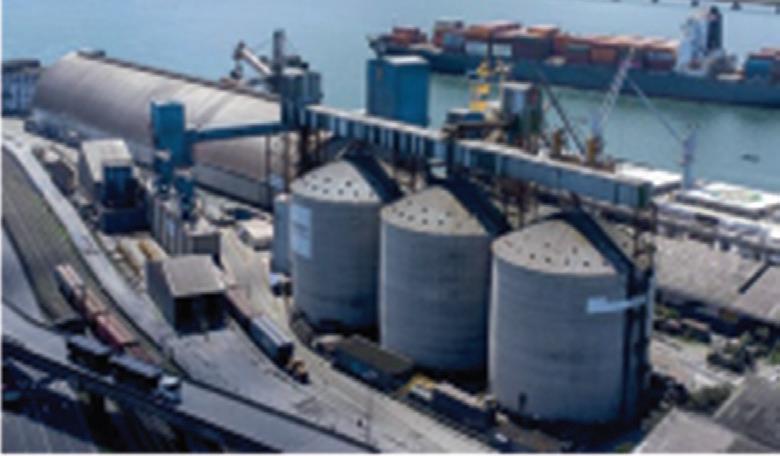
China’s COFCO International and agricultural cooperative GROWMARK have agreed to exchange grain assets in Illinois state, USA, for an undisclosed sum, World Grain wrote on 28 June.
COFCO agreed to purchase GROWMARK’s minority stake in a grain and by-product transloading facility in Cahokia located on the Mississippi River, in St Louis Harbour.
GROWMARK agreed to buy the B-House Chicago grain warehouse facility from COFCO, located on the Calumet River.
The B-House facility would allow GROWMARK to handle 1.1bn bushels/year of grain and oilseeds, the report said.
COFCO’s ownership of the Cahokia facility had raised concerns from two members of the US Congress, Nikki Budzinski and Mike Bost, who sent a letter to US Treasury Secretary Janet Yellen on 27 June asking for a thorough review, World Grain wrote.
“While we support expanding access to foreign markets, it is alarming that a majority of US ports and terminals are owned and operated by foreign entities, especially China,” the letter said.
COFCO International is the overseas agriculture platform for China’s largest food and agriculture company COFCO Corporation.
Asia-based biofuels company EcoCeres has secured 100,000m³ of storage capacity for sustainable aviation fuel (SAF) and hydrotreated vegetable oil (HVO) at Dialog Terminals Langsat (DTL3)’s facility in Malaysia.
The deal followed EcoCeres’ announcement of a significant investment in a new production facility in Pasir Gudang, Johor Darul Ta’zim, DTL3’s parent company DIALOG said on 29 July.
The new biorefinery was expected to be operational in the second half of 2025 while the storage expansion at the terminal was due for completion in the first quarter of 2027.
In an earlier report on 22 April, EcoCeres chief commercial officer Jeremy Baines said the unit would have a total capacity of 350,000 tonnes/ year of biofuels, comprising 220,000 tonnes/ year of SAF and 130,000 tonnes/year of HVO.
Located less than 1km from DTL3, the new biorefinery would be directly connected to DTL3’s storage tanks via rundown pipelines.
DIALOG said the remaining 50,000m³ of storage capacity at the terminal in Tanjung Langsat, Johor Darul Ta’zim, was expected to be leased to third party customers such as multinational companies and trading houses.
Inclusive of the 24,000m³ under construction, DTL3 would have a total storage capacity of approximately 230,000m³ for short to medium term energy traders and multinational companies storing energy products. DTL3 is located next to two other terminals – DIALOG Terminals Langsat 1 and DIALOG Terminals Langsat 2.
Following the expansion at DTL3, the combined storage capacity of DTL1, DTL2 and DTL3 would exceed 1M m³, the company said.
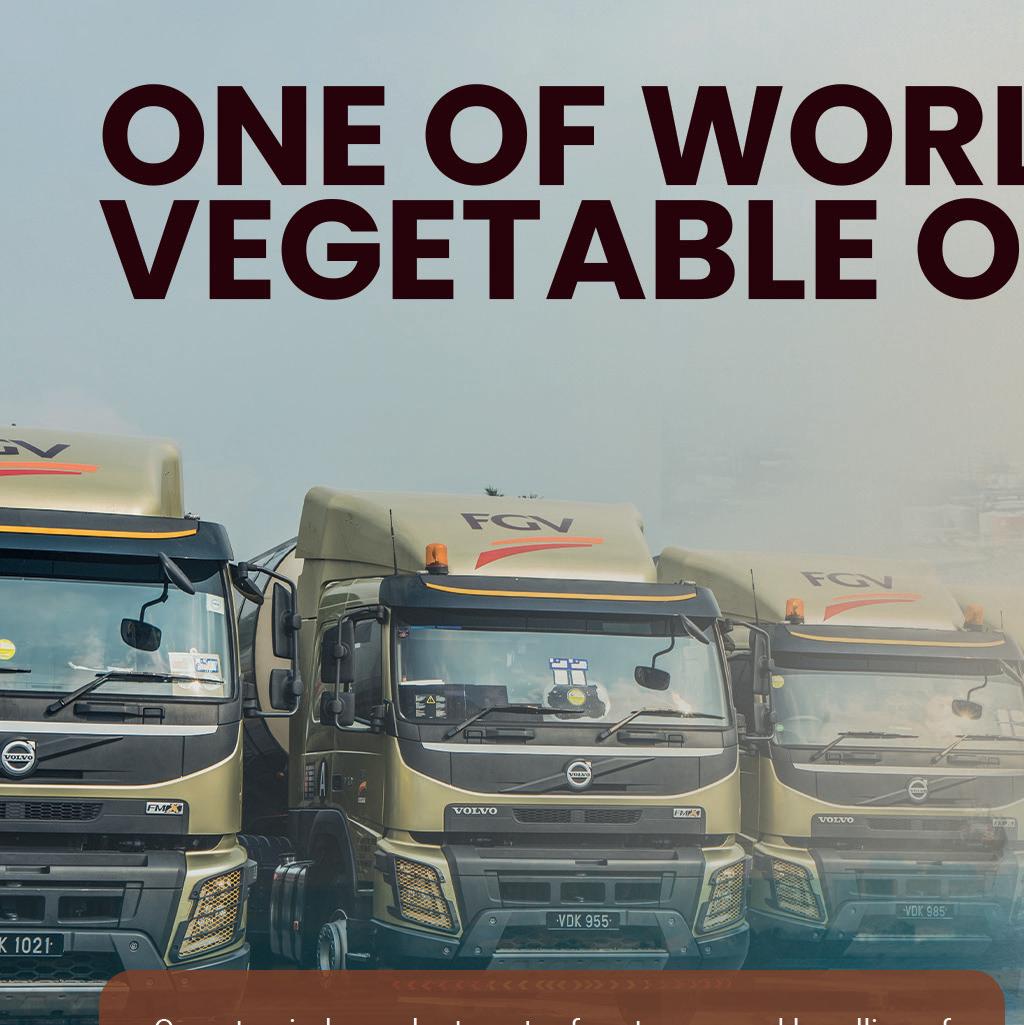








German chemical giant Bayer is seeking protection in the latest US farm bill from thousands of lawsuits involving its Roundup weedkiller, according to an 18 July report by WVPE and Harvest Public Media
The company is lobbying Congress to pass legislation that could protect it from lawsuits alleging that its glyphosate-based product causes cancer.
A draft of the upcoming farm bill includes language that would make it harder for farmers and others to claim in court
USA: US agricultural bioscience company Yield10
Bioscience said on 17 July that it had signed a memorandum of understanding and licensing agreement with Nuseed Nutritional US – the seed technology platform of Nufarm – for omega-3 assets to produce camelina oil.
The US$5M deal granted Australian agricultural chemical firm Nufarm a commercial licence to Yield10’s omega-3 intellectual property assets, materials and know-how to produce camelina oil.
Yield10 also agreed to negotiate with Nufarm for the sale of its remaining assets, subject to Yield10 shareholder approval.
THE NETHERLANDS: Dutch start-up NoPalm Ingredients has raised US$5.4M to scale up production of its palm oil alternative.
The company processes locally-sourced agri-food waste – such as potato peel – via a fermentation process using non-genetically modified (GM) yeasts into oil.
“This funding is pivotal for us to demonstrate large-scale production and reach our next milestone of producing 1.5M kg/year of sustainable oil.”

that they were not sufficiently warned of the potential dangers associated with prolonged use of glyphosate.
According to a Washington Post report, the provision was drafted by lawyers with the help of Bayer and seeks to create uniformity on national pesticide labelling and to prevent individual states from making their own warnings.
It would also stop courts from penalising or holding companies like Bayer liable if their products only included labels that had
previously been approved by the Environmental Protection Agency (EPA), the WVPE and Harvest Public Media report said.
Bayer, which acquired Roundup as part of its US$63bn acquisition of US agrochemical company Monsanto in 2018, has repeatedly said that decades of studies had shown the product and its active ingredient, glyphosate, were safe for human use.
The current farm bill expires on 30 September and the House has yet to vote on the proposed version.
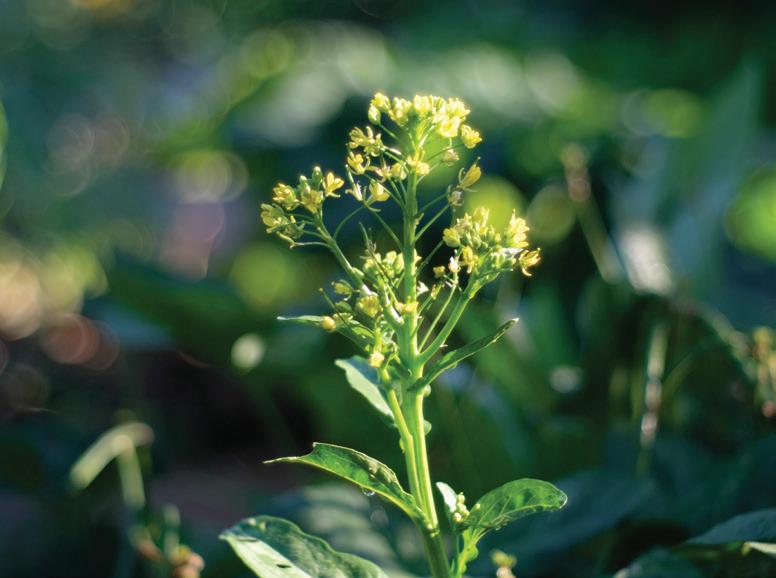
Global agribusiness giant Cargill is working in partnership with a research platform at the University of Minnesota’s College of Food, Agricultural and Natural Resource Sciences to develop camelina (pictured above) and pennycress as cash crops in the USA.
Planted in rotation with corn and soyabeans or after crops like wheat, winter camelina and pennycress could help protect soil health and improve water quality, Cargill said on 10 July.
In addition, the high oil content of camelina
and pennycress could provide farmers with an opportunity to grow them as cash crops.
Cargill said its collaboration with the Forever Green Initiative would focus on the development of high performing seed varieties and farming techniques adapted for growing conditions in the Upper Midwest.
The initiative would combine Cargill’s crop improvement knowledge – including trait discovery, high throughput geno typing, genomic selection, trait development and cellular biology – with the University of Minnesota’s diverse genetics to develop improved varieties of camelina and pennycress, the company said.
“This support from Cargill will take our breeding and genomics work to the next level and help us develop even better varieties of camelina and pennycress for farmers in Minnesota and beyond,” Forever Green Initiative associate director Mitch Hunter said.
The project followed a previously announced US$2.5M grant from Cargill to the University to accelerate research into crop biology and management.
An Australian court has dismissed a class action lawsuit brought by more than 1,000 people claiming that German chemical firm Bayer’s Roundup weedkiller had caused their type of blood cancer, Reuters reported on 25 July.
Australian Federal Court Justice Michael Lee ruled that there was insufficient evidence to conclude that the glyphosate-based herbicide could cause non-Hodgkins lymphoma (NHL).
In his ruling on 25 July, Justice Lee said he had reviewed three types of scientific studies –epidemiological, animal studies and mechanistic evidence – looking at the links between glyphosate and lymphoma and was not satisfied there was sufficient evidence that the chemical caused
the cancer in humans. The claimants’ law firm, Maurice Blackburn, said it was reviewing the ruling before deciding whether to appeal.
The lead claimant, 41-year-old Kelvin McNickle, had used Roundup for over two decades on his family’s property and while working for a vegetation management company. He developed non-Hodgkins lymphoma, aged 35.
The class action against Bayer was one of around 40 similar cases filed outside the USA, Reuters wrote. In the USA, Bayer faced 50,000 outstanding claims. Although the company had won 15 out of the last 20 US trials, it has had to pay more than US$4bn in damages in cases in late 2023 and early 2024, Reuters wrote.
11-13 September 2024
North American SAF Conference & Expo Saint Paul Rivercentre, Minnesota, USA
https://saf.bbiconferences.com/ema/ DisplayPage.aspx?pageId=Home
11-13 September 2024
Argus Sustainable Marine Fuels Conference Houston, Texas, USA
https://www.argusmedia.com/en/events/ conferences/sustainable-marine-fuels
16-17 September 2024
6th International Symposium on Dietary Fat and Health
Frankfurt, Germany
https://veranstaltungen.gdch.de/ microsite/index.cfm?l=11686&sp_id=1
16-18 September 2024
Argus North Amercia n Biofuels, LCFS & Carbon Markets Summit Monterey, California, USA www.argusmedia.com/en/events/ conferences/north-american-biofuelslcfs-carbon-markets-summit
18-20 September 2024
Globoil India
The Westin Mumbai Powai Lake Mumbai, India
https://www.globoilindia.com
23-26 September 2024
19th GERLI Lipidomics Meeting at the End of the World Plouzané, France
https://eurofedlipid.org/19th-gerlilipidomics-meeting-at-the-end-of-theworld
25-26 September 2024
Polish Chamber of Biofuels (KIB) Transport Biofuels Conference Lake Hill Mazury Resort & Spa Ostróda, Poland
https://kib.pl/en/konferencja-2
25-27 September 2024
Canadian Lipids and Proteins Conference Ottawa, Ontario, Canada
https://payments.carleton.ca/canadianlipids-and-proteins-conference-2024
For a full events list, visit: www.ofimagazine.com
30 September-2 October 2024
2nd Berlin Symposium on Structured Lipid Phases
Berlin, Germany https://eurofedlipid.org/ofiinternational-2024-2
2-3 October 2024
4th ICIS Pan American Oleochemicals Conference
Ritz Carlton Coconut Grove, Miami, USA https://events.icis.com/website/13907/
2-4 October 2024
Sustainable Aviation Futures North America Congress
Marriott Marquis, Houston, Texas, USA www.safcongressna.com
9-11 October 2024
Palmex Indonesia
Medan, Indonesia https://palmoilexpo.com/index.html
15 October 2024
Black Sea Veg Oil Trade
InterContinental Hotel, Bucharest, Romania
https://ukragroconsult.com/en/ conference/black-sea-oil-trade2024/?utm_source=sendpulse&utm_ medium=email&utm_campaign=blacksea-oil-trade-2024-first&spush=c2VyZW 5hbGltQHF1YXJ0emx0ZC5jb20=
15-17 October 2024
Argus Biofuels Europe Conference & Exhibition London, UK www.argusmedia.com/en/events/ conferences/biofuels-europe-conferenceand-exhibition
22-23 October 2024
Oil and Fats International Congress (OFIC) 2024 (+ Online)
Kuala Lumpur Convention Centre, Malaysia https://mosta.org.my/events/ofic-2024
22-25 October 2024
2024 North American Renderers Association Annual Convention
Ritz Carlton Bacara, Santa Barbara, USA https://convention.nara.org/
4-6 November 2024
Sustainable Aviation Futures APAC Congress
PARKROYAL Marina Bay, Singapore www.safcongressapac.com
7-9 November 2024
5th YABITED Fats and Oils Congress Antalya, Turkey
www.yabited2024.com/EN/Default.aspx
11-13 November 2024
RT2024
Amari Bangkok Thailand https://rspo.org/rt2024-save-the-date
12-14 November 2024
Global Grain Geneva 2024 Geneva, Switzerland www.fastmarkets.com/events/globalgrain-geneva
14-15 November 2024
Biofuels Expo 2024 Renaissance London Heathrow Hotel UK https://biofuelsconference.org
9-11 December 2024
Hands-on Annual Vegetable Oil Deep Frying Course with Live Demonstrations College Station, Texas, USA https://fatsandoilsrnd.com/ annual-courses
24-26 February 2025
Palm & Lauric Oils Price Outlook Conference & Exhibition (POC 2024) Kuala Lumpur, Malaysia
18-20 March 2025
International Biomass Conference & Expo Cobb Galleria Centre Atlanta, Georgia, USA https://ibce.bbiconferences.com/ema/ DisplayPage.aspx?pageId=Home
4-7 June 2025
EFPRA Congress 2025 Riga, Latvia https://efpra.eu/events
29 June-2 July 2025
16th Congress of the International Society for the Study of Fatty Acids and Lipids (ISSFAL)
Quebec City, Canada www.issfalcongress.com
12-15 October 2025
Euro Fed Lipid Congress and Expo Leipzig, Germany
https://veranstaltungen.gdch.de/ microsite/index.cfm?l=11649&modus=
www.ofimagazine.com
The use of animal fats in biofuels has been growing –accounting for a third of all animal fats produced globally last year. This upward trend is set to increase to meet the demands of the renewable fuels sector OFI
The use of animal fats in biofuels has experienced “stunning growth”, reaching over 4.1M tonnes in 2023 worldwide – or one third of animal fats produced globally, the European Fat Processors and Renderers Association (EFPRA) Congress heard in Amsterdam on 12-14 June.
Over two-thirds of this total is used in the EU and the USA, due to policy incentives which give additional value to lower carbon fuels, Yuen Moon, biofuels analyst at Global Data Agri, UK, said.
Historically, the animal feed sector has been the largest end user of animal fats in Europe. However, in 2023, the biofuels market overtook the feed sector to consume over half of animals fats supplied by the rendering industry (see Figure 1, below and Figure 4, p20). Much of this demand for animal fats has been met from falling food and oleochemical use.
Biofuel policies
Global consumption of biodiesel and sustainable aviation fuel (SAF) has risen strongly over the last decade, reaching 59M tonnes in 2023 (see Figure 2, p20).
Policy has been the main driver as countries around the world seek to support lower emission fuels or domestic

agricultural sectors, according to Moon.
“By 2030, the global market is set to nearly double thanks to rising targets in the road and aviation sectors.”
In Europe, consumption of biodiesel and SAF had risen steadily over the last decade, reaching nearly 18M tonnes in 2023.
The key policy promoting EU biofuel is the Renewable Energy Directive (RED) (see Figure 3, p20). By 2030 the EU market (including the UK) is set to rise moderately to 21M tonnes, according to Moon.

Source: Yuen Moon, Global Data Agri, EFPRA 2024 Congress
Key biofuel trends around the world included a move towards low greenhouse gas (GHG) emission policies, an increasing need for SAF, growing interest to decarbonise the maritime sector, and changing market shares within the global biofuels markets, Moon told the EFPRA Congress.
Low GHG emission policies include the third version of the EU’s RED (RED III), Canada’s Clean Fuel Standard (CFS) and low carbon fuel standards (LCFS) in California, New Mexico, Oregon and Washington.
“These policies give additional value to fuels made from low carbon/waste-based feedstocks such as used cooking oil (UCO) and animal fats,” Moon said.
There had also been a flurry of biofuel mandates and support for SAF announced in the past year.
“The aviation industry is difficult to decarbonise and currently the most achievable way to lower emissions is to use SAF made from oils and fats using HVO [hydrotreated vegetable oil/ renewable diesel] technology.”
Several countries had introduced policies to decarbonise the maritime sector but while this could represent a new market for biodiesel, unlike in aviation, a wide range of decarbonisation


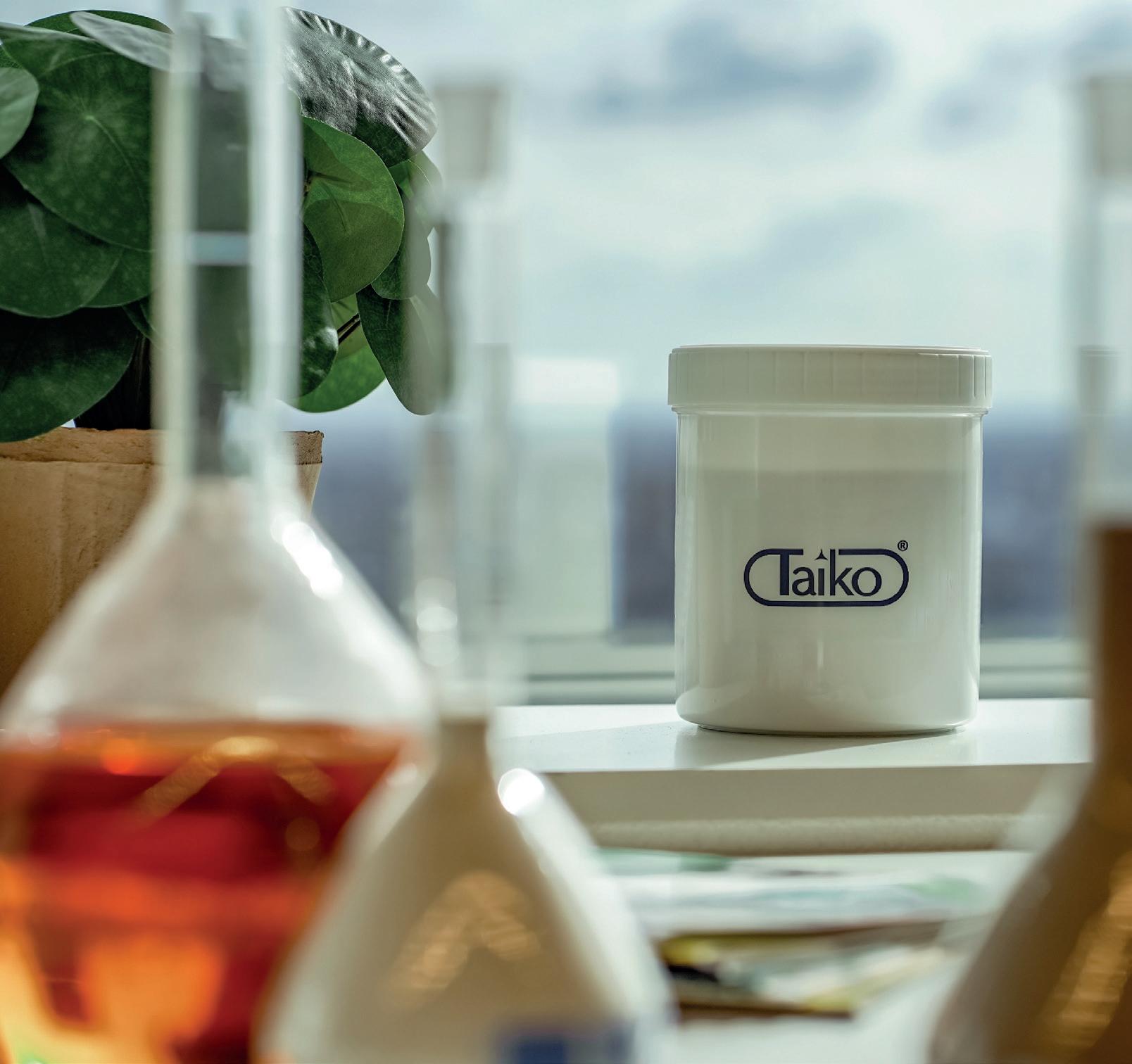










e. taikoclaymkt@taikogroup.net
t. +603 7660 7716
w. taikoclaymarketing.com
e. office@taikogroup.eu
t. +31 10 800 5479 Be the first to know.









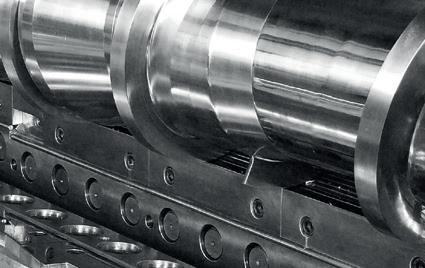




































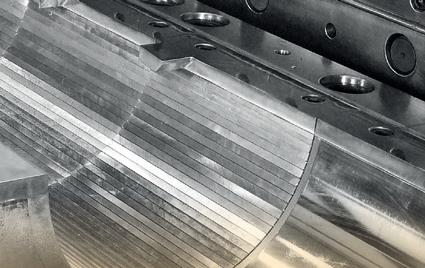



































































































































































































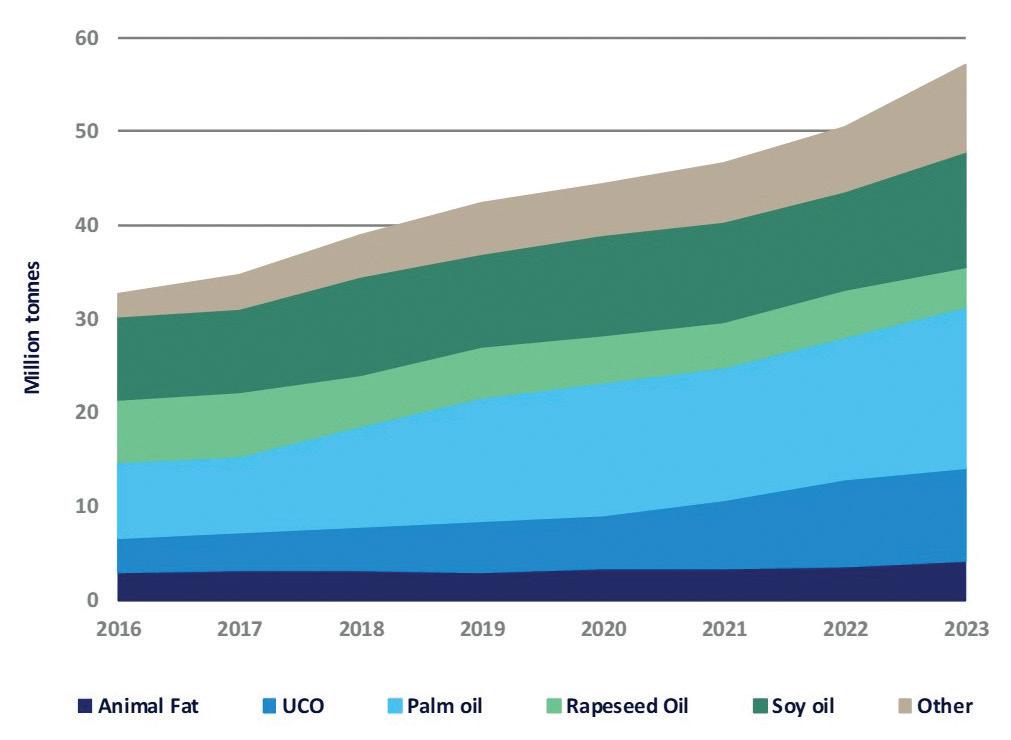
u
options existed for marine transport, meaning traditional liquid biofuels would only make up a small proportion of this market.
Finally, while the EU remained the largest biofuels market in the world, its share had fallen considerably over the last decade – from 40% to 25% – and the region was expected to be overtaken by Brazil, Indonesia and the USA, driven by rising electrification, Moon said.
“A newer trend in trade is the USA becoming a net importer of animal fats in the last two years, ramping up imports from Australia, Brazil and Canada.”
New HVO/SAF plants due to come online, along with strong incentives for non-crop feedstocks were expected to keep strong import demand in the country for waste oils, she said.
Renewable diesel capacity was due to expand rapidly over the next few years to 42M tonnes by 2030 (see Figure 5, p22). New plants were clustered in Europe, North America and Asia.
SAF would take longer to come onstream, but nearly 25M tonnes of new SAF capacity was planned (see Figure 6, p32). Locations were similar to those for renewable diesel, with many plants planning to produce both HVO and SAF.
The EU’s RED was introduced in 2009 and the updated REDIII entered into force on 20 November 2023, with member states required to implement the policy into national law by 21 May 2025.
REDIII doubles the share of renewable energy in transport from the 2030 target of 14% to 29%, with member states having the option to change to a GHG target of 14.5% GHG reduction in 2030.
“The GHG option is seen as more

sophisticated and takes into account carbon emissions,” Moon said.
The policy change to include all transport, not just road, would increase the amount of renewable energy needed, with the road portion declining over time because of electrification.
REDIII included a combined subtarget for advanced biofuels and green hydrogen of 5.5%, with double counting. At least 1% of this target needs to be supplied from Renewable Fuels of Non-Biological Origin (RFNBO) – green hydrogen e-fuels.
REDIII would result in a maximum share of advanced biofuels of 4.5% with double counting, equivalent to 2.25% in real energy terms, Moon said.
“Biofuels made from UCO and tallow are capped at 1.7% of the energy in transport fuel but member states may request a higher cap subject to availability.”
New multipliers were agreed for biofuels used in the marine (x1.2), aviation (x1.2), rail (x1.5) and electric cars (x4) sectors.
After a long delay, revisions to Annex IX (the list of REDIII approved waste feedstocks) were also finalised in May.
Annex IX sets out feedstocks for advanced biofuels, divided into Part A feedstocks and Part B feedstocks (UCO and Category 1 and 2 animal fats ( below).
Moon said a major revision was the categorisation of Category 3 animal fats. This would will fall under the ‘Other’ category (Part 3 fuels – biofuels from feedstocks that are neither food crops nor listed in Annex IX) (see Figure 7, p22 would compete with renewable electricity.
So while the market for categories 1 and 2 animal fats would remain stable under REDIII, the potential market for category
3 animal fats had risen considerably but would compete with renewable electricity under the same category, Moon said.
The EU has also adopted sustainable aviation and maritime fuel policies.
Aviation and maritime initiatives
The EU had also introduced ambitious SAF targets, Moon told the Congress.
The ReFuelEU regulation was adopted on 9 October to boost EU SAF supply, taking effect on 1 January 2024.
The regulation will require EU airports and fuel suppliers to ensure that at least 2% of aviation fuels are ‘green’ by 2025,
rising to 70% in 2050.
Moon said the regulation included subtargets for synthetic SAF (which cannot be fat-based) and strict regulations over feedstocks for non-synthetic SAF.
SAF includes certain biofuels made from agricultural or forestry residues, algae, biowaste, UCO and category 3 animal fats, but not feed and food feedstocks.
There was a cap of 3% for non-waste, non-crop feedstocks (including category 3 animal fats), Moon said.
The Fuel EU maritime initiative was introduced to ensure that the GHG intensity of fuels used by the shipping

In the European Union (EU), animal by-products (ABPs) are divided into three categories based on the risks they pose.
Category 1 materials have the highest risk of spreading diseases such as bovine spongiform encephalopathy (BSE).
Category 2 materials are classed as high risk.
Category 3 materials are classed as low risk and include processed animal proteins (PAP).



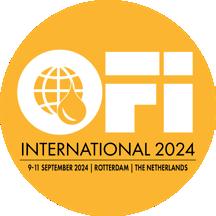


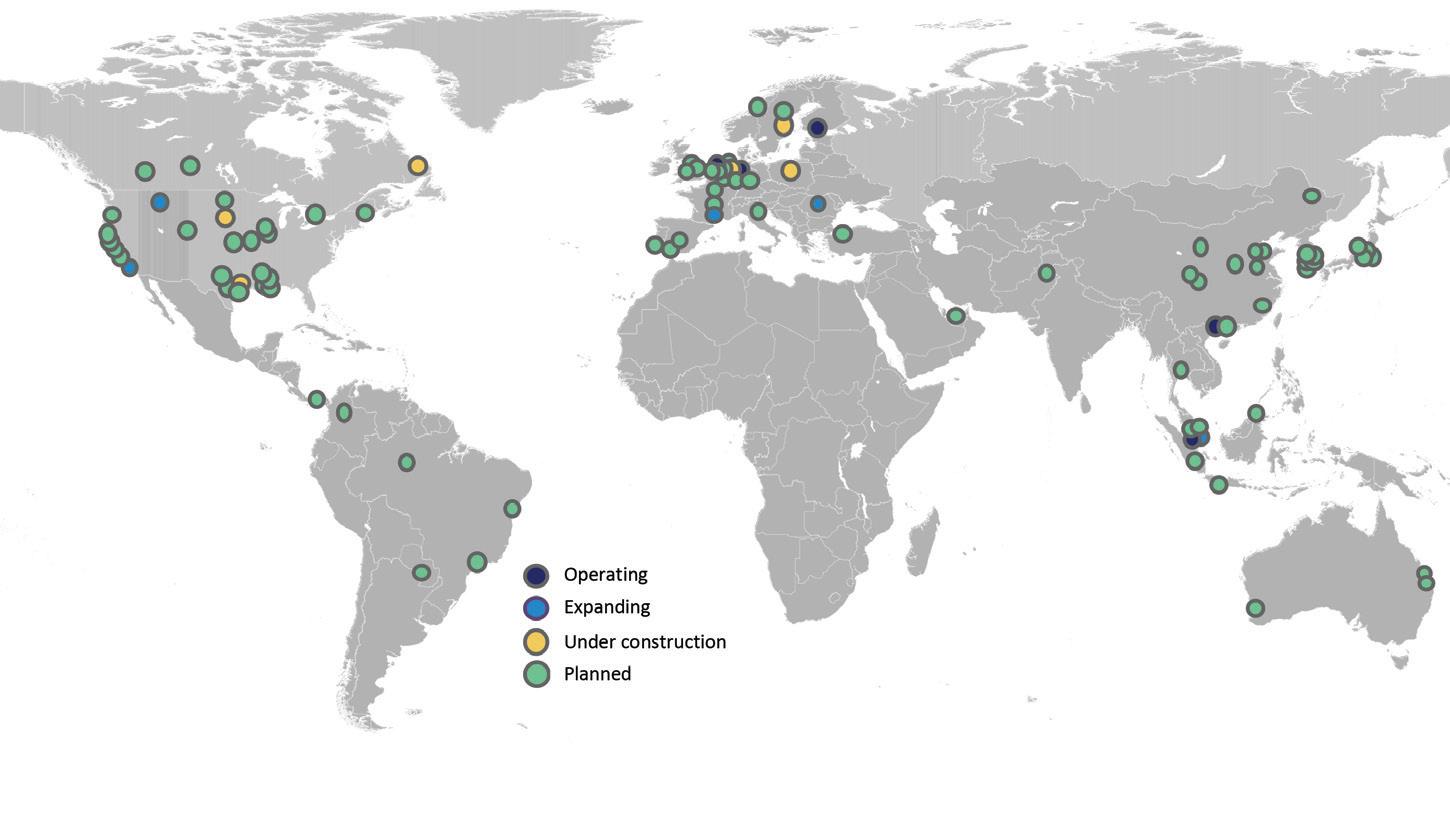
u
Source: Yuen Moon, Global Data, EFPRA 2024 Congress
Source: Yuen Moon, Global Data, EFPRA 2024 Congress
sector would fall by 2% in 2025 to as much as reaching 80% by 2050, to come into force from 1 January 2025.
Rising targets and new HVO capacity offer huge potential for increased sales of animal fat to the renewable fuels sector, Moon told the EFPRA Congress.
As a by-product, animal fat had an advantage over crop oils and was more highly valued in the EU, Canada and USA.
In the EU, expected growth was set to more than total animal fat supply in the region. As the cap on “established wastes” was already being maximised, the category 1 and 2 animal fats market would remain unaffected. The GHG value for category 3 animal fats, meanwhile, would be based on emissions from the rendering process, allowing more savings compared with crops due to its status as a by-product.
“However, there are risks in the EU market for animal fats, from changes in policy and through competition from other technologies in the longer term,” Moon said.
“The European Commission is wary of feedstocks which can be used in feed so there is a risk they will limit the use of Category 3 animal fats in road or aviation policies.”
Member states could also choose to exclude feedstocks under REDIII, as Germany had done with animal fats.
In the aviation sector, the easiest way to decarbonise was to use oils and fats, including Category 3 animals fats.
“This could lead to considerable demand,” Moon said.
The SAF market presented a huge potential new market with many plants starting up and seeking to secure low GHG feedstocks.
Moon estimated the current potential market at around 1.5M tonnes of SAF. Due to losses in the HVO process, this would require around 2.1M tonnes of fat.
Biofuels derived from high ILUC risk & feed crops eg palm oil
Biofuels derived from low ILUC risk & feed crops eg rapeseed oil
Biofuels derived from feedstocks listed in Annex IX Part A eg POME, tall oil
Biofuels derived from feedstocks listed in Annex IX Part B eg animal fats, UCO
Biofuels from feedstocks that are neither food crops nor listed in Annex IX
‘Part C’ fuels Advanced biofuels
Renewable fuels of nonbiological origin (RFNBO) Recycled carbon fuels (RCF)
* Part A feedstocks: Algae if cultivated on land in ponds or photobioreactors; biomass fraction of mixed municipal waste; biowaste from private households subject to separate collection; biomass fraction of industrial waste not fit for use in the food or feed chain; straw; animal manure and sewage sludge; palm oil mill effluent and empty palm fruit bunches; crude glycerine; bagasse; grape marcs and wine lees; nut shells; husks; cobs cleaned of kernels of corn; biomass fraction of wastes and residues from forestry and forest-based industries; other non-food cellulosic material; ligno-cellulosic material except saw logs and veneer logs. ** Part B feedstocks: Used cooking oil (UCO) and category 1 and 2 animal fats
However, in the EU, there was a cap of 3% for non-waste, non-crop feedstocks (including category 3 animal fats) for SAF.
In the longer term, competition from alternative technologies (electricity in road and non-lipid based SAF in aviation) may limit the market for lipid-based biofuels.
“However, as a low carbon feedstock, fats will keep their share of the sector for longer than other feedstocks. In addition, the scale of targets mean that lipids will still be needed for a long time.” ●
This article is based on a presentation made by Yuen Moon, a biofuels analyst at Global Data Agri, UK, at the European Fat Processors and Rendering Association (EFPRA) Congress in Amsterdam, 12-14 June 2024








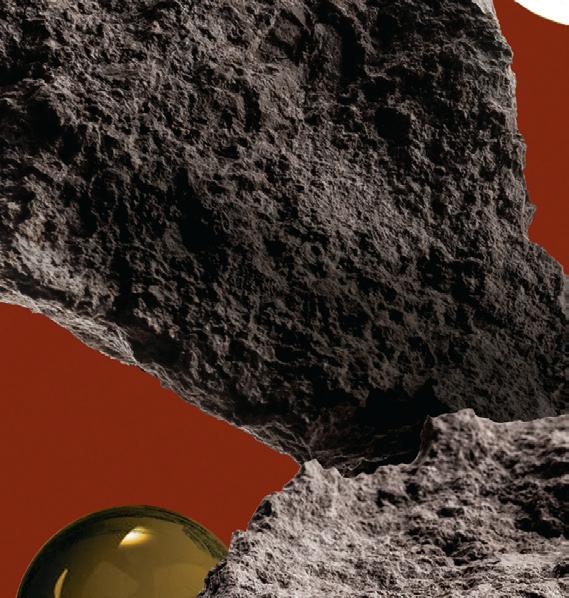



















The easing of European regulations on using poultry and porcine processed animal proteins (PAPs) to feed pigs and chickens has opened up a sustainable feed source which can reduce EU imports of soyabean meal
Serena Lim
The use of processed animal proteins (PAPs) in animal feed offers a circular protein source and a more sustainable way to produce livestock, with the potential to reduce EU imports of soyabean meal, the European Fat Processors and Renderers Association (EFPRA) Congress heard.
In the EU, PAPs are produced from Category 3 rendered material (animal byproducts fit for human consumption at the point of slaughter).
A ban on feeding PAPs to farmed animals bred for food had been in place in the EU since 2001, when regulations to combat the spread of ‘mad cow disease’ (bovine spongiform encephalopathy – BSE) were introduced. In 2021, the European Commission (EC) relaxed the ban, allowing PAPs from pigs to be used in poultry feed and PAPs from poultry to be used in pig feed.
“Half a year later, the first delivery of PAP to a dedicated feed mill in the Netherlands was made in March 2022 – a historic event after a more than 20 year ban,” Carine van Vuure, nutrition and regulatory affairs manager at Darling Ingredients, told the congress on 12-14 June.
Van Vuure outlined the advantages of using PAP in compound feed including the fact that chickens and pigs were omnivores eating both animal and vegetable proteins. In addition, PAPs contained digestible essential amino acids to help keep animals healthy. Feeding PAPs to chickens and pigs also resulted in drier litter among broilers, less feather pecking in laying hens and less ear necrosis for piglets, van Vuure said, adding that European PAPs were locally sourced and produced, with a lower carbon footprint than imported soyabean meal.
Rob Kiers, chief operating officer of feed

supplier ForFarmers, told the EFPRA congress that his firm was an early adopter of PAPs, introducing porcine PAP in poultry diets in the EU in March 2022.
He said the company included around 2-5% of porcine PAP in poultry feed, with a 5% PAP inclusion rate resulting in a 7.5% reduction in soyabean meal.
“Every 100,000 tonnes of feed including PAP reduces the inclusion of soyabean meal by 7,500 tonnes,” he said.
Compared with feed containing Roundtable on Responsible Soya (RTRS) soyabean meal, feed containing porcine PAP had a reduced CO2 footprint due to lower transport costs and environmental impact, Kiers said.
Porcine PAP also contained about 5860% protein compared with around 48% in soyabean meal, van Vuure told OFI.
“Animals also do well when PAP is used, with drier litter leading to less footpad dermatitis,” Kiers said. In addition, using PAP led to less mining and use of inorganic minerals to meet the phosphorous requirements of animals bred for food.
Jeffrey de Rooij, poultry specialist and nutritionist at animal feed company AgruniekRijnvallei, said PAPs were able to lower the carbon footprint of animal feed while improving animal welfare in hens laying eggs.
Outlining the results of trials carried out by his company on brown hens fed
on diets with and without PAPs, he said PAPs showed a positive effect on feather quality, as well as on hen mortality due to a reduction in cannibalism.
It also led to improved gut health (with no fermentable carbohydrates) and lower water consumption leading to drier litter (resulting in less foot pad lesions and lower infection pressure), with no differences in egg production.
There are challenges, however, in using PAPs in feed, according to Kiers. These included market acceptance among consumers, retailers, slaughterhouses, NGOs and governments.
PAPs were already used in pet food and it was not always competitive in price, he said. Its availability was also limited, due to segregation, tolerance and logistics considerations.
Van Vuure said strict regulations existed in the supply chain for animal proteins, each step requiring dedicated and registered or approved facilities, along with dedicated transport or cleaning protocols.
There were also stringent traceability requirements to prevent cross contamination, including single species segregated feed lines in mills and a requirement that PAP was only fed on farms where no other livestock species were present.
Specific retailers also had limits, such

Continuous Rendering Systems
Cookers and Dryers
Screw Presses
Decanters and Centrifuges
Size Reduction Equipment
Process Control Systems
Material Handling Equipment
Total Service and Support
• Optimized fat and meal production
The high product quality specifications you require, and the flexibility to adjust to changing demands.
• Dramatically reduced downtime
Unsurpassed reliability backed up by the rapid response of the largest field service team and parts inventory in the industry
• Complete systems integration
Every type of major equipment — including new Dupps-Gratt horizontal bowl decanters and disctype vertical centrifuges — as well as unsurpassed engineering expertise in creating better ways to recycle protein by-products into profitable fats and meals.

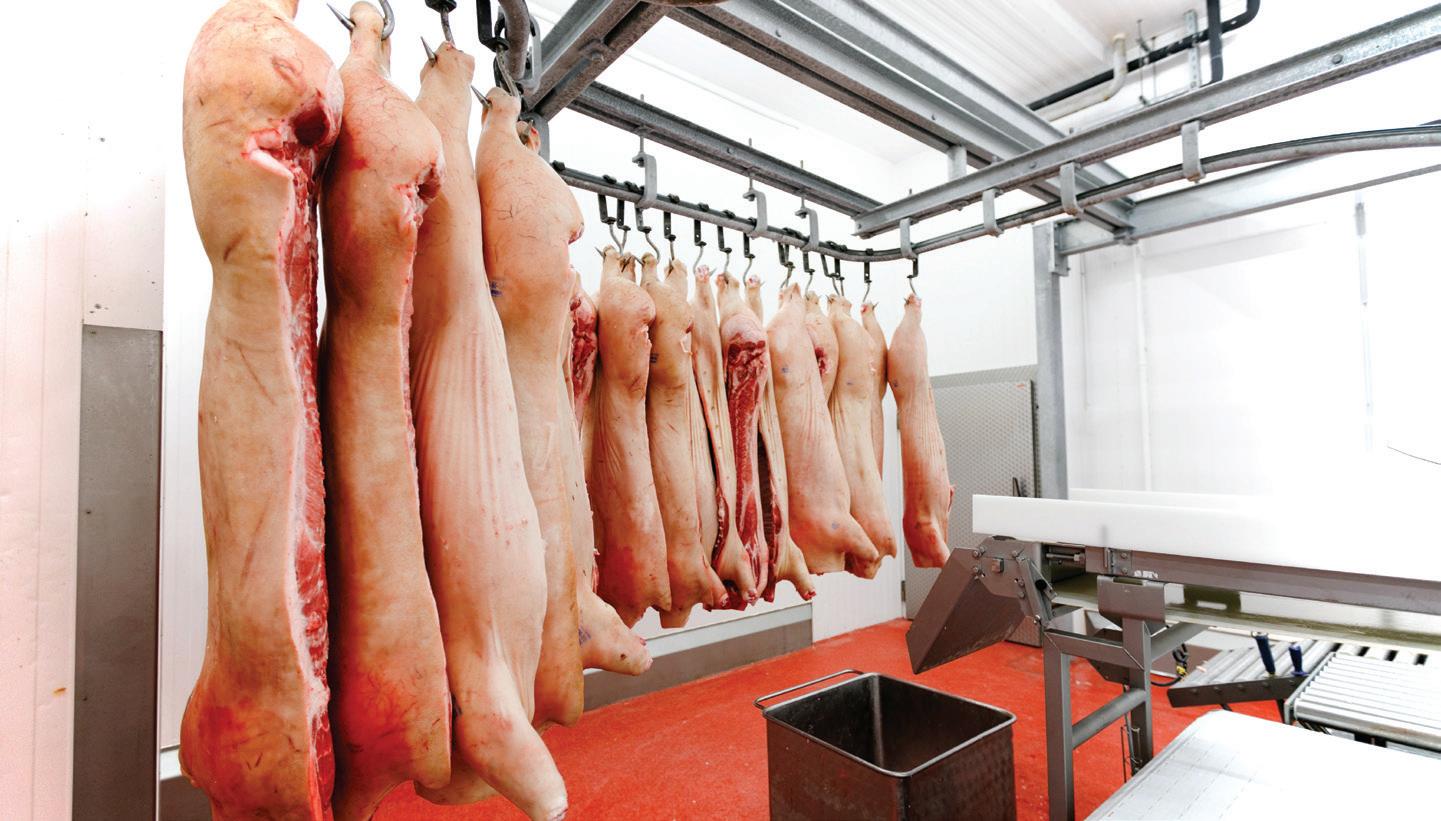
as Tesco and Marks & Spencer in the UK requiring ‘vegetarian’ bacon.
French retailer Carrefour also had a ban in place for animal products in diets for food-producing animals. In addition, Belgian retailer Colruyt did not allow the use of PAP in feeds for food-producing animals.
Another limitation is that most PAPs produced in the EU are multispecies PAP. Last year, 2.65M tonnes of PAP and food grade protein was produced in the EU, almost half of which (46%) was multispecies, EFPRA secretary general Dirk Dobbelaere told the congress (see Figure 1 below). A quarter of PAPs produced was poultry meal (25%) and 8% was single species feather meal which can also be used in pig feed, adding up to 33% of meal from poultry. Porcine meal accounted for 12% of total PAP and food
grade protein production.
The vast majority of EU PAP and food grade protein (77%) still ends up in pet food (see Figure 1, below), while 7% goes into fish feed and just 5% into the terrestrial animal feed, according to Dobbelaere’s figures.
The EU also exported more than a third (35%) of all the PAPs it produced, with total protein exports amounting to 928,500 tonnes in 2023 (see Figure 2, right).
The congress also heard from Francisco Gordejo, head of the EC health and food safety unit, on EFPRA’s request to revise standards for the production of porcine PAP.
EFPRA technical director Martin Alm told Oils & Fats International (OFI) that only Method 1 (pressure sterilisaton) was currently approved.
The EC asked the European Food Safety

Authority to provide scientific opinions on the efficacy of Methods 2-5 and Method 7 in inactivating relevant pathogens when producing porcine PAP for feed poultry and aquaculture animals.
Gordejo told the congress that having received the opinions, the EC planned to authorise safe and conditionally safe methods described in Methods 2-5, but not Method 7, which was not based on specific time/temperature/pressure processes, but on the absence of relevant pathogens after testing.
Despite the obstacles, Kiers said PAP was still a valuable feed ingredient with good sustainability credentials. “It’s still a long road, but there are many opportunities to enhance circularity in animal feed.” ● Serena Lim is the editor of OFI
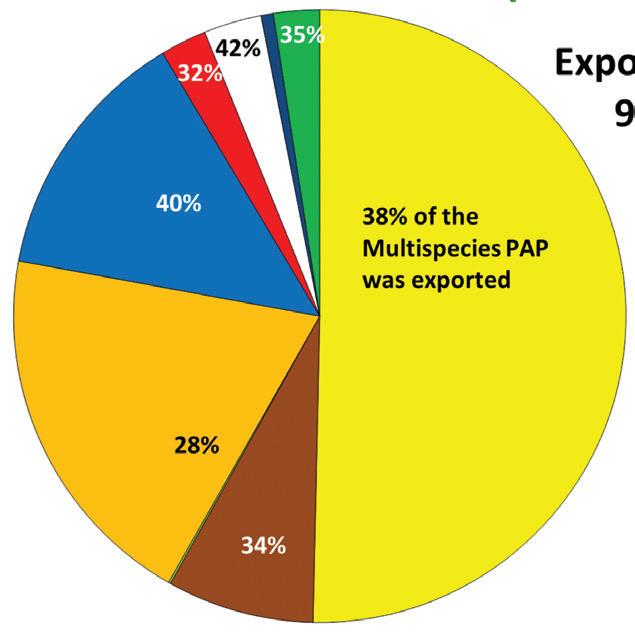




































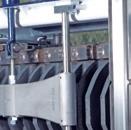



















































International reports on some of the latest projects, technology and process news and developments around the world
FRANCE: Global jet fuel supplier Avfuel has expanded its supply of sustainable aviation fuel (SAF) to three French airports.
The SAF supply agreements at Paris Le Bourget Airport (LBG), Bordeaux-Mérignac Airport (BOD) and Clermont-Ferrand Auvergne Airport (CFE), meant operators could purchase SAF at all three locations via the Avfuel Contract Fuel programme, the company said on 28 May.
“We’re a global company, so expanding SAF access to our customer base beyond North America’s borders has been a … focus for our team,” Avfuel’s executive vice president CR Sincock II said.
Avfuel’s SAF supply, produced in France, averages a blend ratio of 30% SAF to 70% traditional jet fuel. Made from a tallow feedstock, the fuel in its concentrated form provided up to a 90% reduction in carbon emissions across its lifecycle, the company said.
Avfuel said it had also made investments in new fuel technology companies, such as Alder Renewables, which is focused on producing SAF from woody biomass.
The company provides fuel and services to the global aviation industry and supplies 17 airports and fixed base operators (FBOs) in the USA.

Spanish agribusiness Elian Barcelona has started processing soyabeans at its renovated plant at the Port of Barcelona, in Spain, World Grain reported on 23 May.
A subsidiary of Viserion Oilseed Processing, a newly formed subsidiary of Viserion International, Elian Barcelona
announced the acquisition of the soyabean crushing plant in Moll Álvarez de la Campa from global agribusiness giant Cargill in October, the report said.
At the time of the acquisition, Elian Barcelona said it planned to expand the plant’s capabilities to produce a wider range of food and speciality
feed ingredients, including concentration and textured protein, key to supporting the delivery of farm-to-food products across European and Mediterranean markets.
According to the Catalonia Trade & Investment agency, the plant serves the Catalan, Spanish and European feed and food ingredient sectors.
The plant produced 2,500 tonnes/day of concentrated and textured protein for use in plant-based alternative foods and animal feed, and also manufactured soyabean oil for use in food, cosmetics, adhesives and fuels, World Grain wrote.
Viserion International is backed by a fund managed by Pinnacle Asset Management, a US-based alternative asset management firm focused on global commodities markets.
Biofuel producers in China have plans to invest more than US$1bn in the country’s first plants to turn waste cooking oil into sustainable aviation fuel (SAF) for export and to meet domestic demand once Beijing introduces mandates for its use, Reuters reported on 17 May.
The Chinese firms are planning to start up plants over the next 18 months to produce a total of more than 1M tonnes/year of SAF, according to six SAF investors quoted in the report. That volume would be equivalent to 2.5% of China’s current annual demand for aviation fuel, Reuters wrote.
Once operational, the projects would use up supplies of used cooking oil (UCO) feedstock that China currently exported, the company executives were quoted as saying.
The companies included Junheng Industry Group Biotech, Zhejiang Jiaao Enprotech and Tianzhou New Energy.
Last year, China exported a record 2.05M tonnes of UCO, mostly to the USA and Singa-
pore, and also supplied feedstock to biofuel refiners such as Finnish firm Neste.
According to the report, China currently produces less than 100,000 tonnes of SAF, mostly at a plant operated by EcoCeres, which has been making the fuel since 2022 in the eastern region for export.
The companies planning to make SAF expected a mandate for a compulsory blend of 2%-5% of SAF into an aviation fuel market forecast to reach 50M tonnes in 2030, according to industry executives familiar with policy discussions, who spoke to Reuters on condition of anonymity. Although modest compared to EU and Japanese targets of 6% and 10% respectively, a 5% mandate would be a jump from the 50,000 tonne SAF target for 2025 outlined by Beijing a few years previously and would equate to 2.5M tonnes of SAF use in China by 2030, the executives said. Accounting for about 11% of global jet fuel use, China was the world’s second largest aviation market, Reuters wrote. u
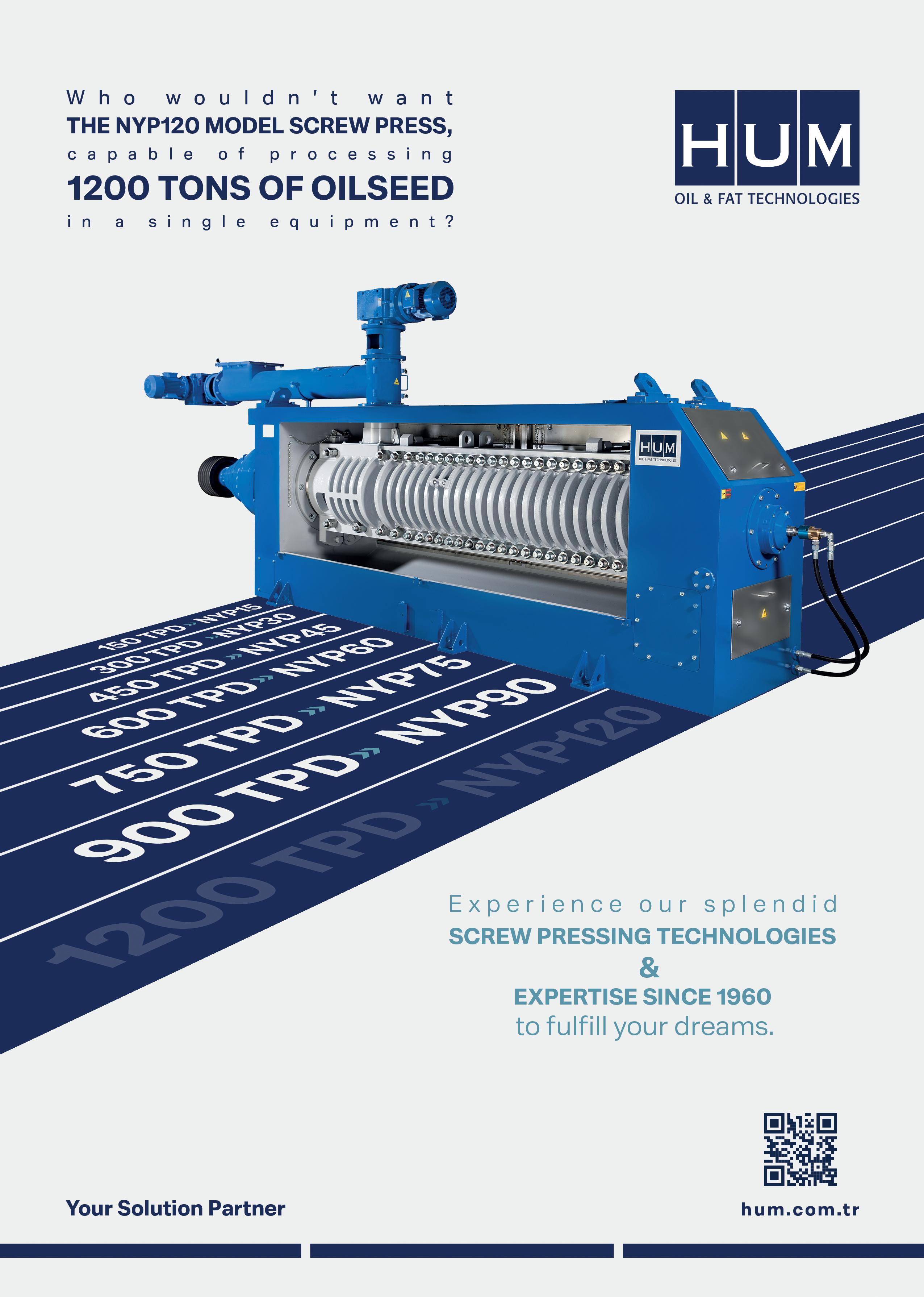
Kinetics Technology (KT) – part of the Maire Tecnimont Group –has been awarded a US$400M project to develop a hydrotreated vegetable oil (HVO) complex in Hamburg, Germany, for HOLBORN Europa Raffinerie.
Situated inside HOLBORN’s existing refinery in Hamburg, once completed, the plant would produce approximately 220,000 tonnes/year of
IN BRIEF
USA: US energy company
Phillips 66 has achieved full production rates of renewable diesel and sustainable aviation fuel (SAF) at its Rodeo facility in California.
Production at the facility in the San Francisco Bay Area reached approximately 50,000 barrels/day (bpd) (800M gallons/year), achieving the company’s goal of full capacity by the second quarter of 2024, Phillips 66 said on 26 June.
“The facility running at full capacity supports the growing demand for renewable fuels, [and] lowers our carbon footprint,” Phillips 66 executive vice president of Refining Rich Harbison said.
The company launched the Rodeo Renewed project in 2020 to produce renewable diesel and SAF, alongside other products.
In addition to supplying Californian markets, the complex provides renewable diesel to other areas along the West Coast.
Featuring new pre-treatment units for processing lower carbon intensity feedstocks, such as used cooking oil, fats, greases and vegetable oil, the Rodeo complex started producing approximately 30,000 bpd of renewable fuel at the end of the first quarter of 2024.
Phillips 66 is active in the midstream, chemicals, refining, and marketing and specialities sectors.
renewable diesel and sustainable aviation fuel (SAF) from waste and residues feedstocks, biomasses and agribusiness industry residues, as well as low carbon hydrogen, MAIRE announced on 18 June.
The plant was due to be operational in early 2027, including the pre-treatment and HVO units, the company said.
Delivered by KT, MAIRE said
the engineering, procurement and construction (EPC) project would also involve the use of technology by NEXTCHEM, one of its other divisions.
“This [project] confirms the MAIRE Group’s ability to take on the decarbonisation challenges in hard-to-abate sectors,” MAIRE Group CEO Alessandro Bernini said.
The HOLBORN Europa Raf-
finerie oil refinery processes up to 5M tonnes/year of crude oil into gasoline, diesel, heating oil and feedstock for the chemical industry and supplies Hamburg and northern Germany with fuels and heating oil.
Italian technology and engineering group MAIRE is active in the nitrogen fertiliser, hydrogen, circular carbon, fuel, chemical and polymer sectors.
Spanish multinational oil and gas company Cepsa and the European Investment Bank (EIB) have signed a €285M (US$312M) loan agreement to finance the construction of an advanced biofuels plant in Spain.
Built in conjunction with Bio-Oils, the new facility would be built next to the La Rábida Energy Park in Palos de la Frontera, Andalusia, Cepsa said on 27 June.
Once operational, Cepsa said the plant would produce sustainable aviation fuel (SAF) and renewable diesel (HVO) from organic waste such as used cooking oil (UCO) or agricultural waste.
The company said it expected the facility to produce up to 500,000 tonnes/year of second-generation biofuels for the aviation, mari-
time and heavy-duty road transport sectors from up to 600,000 tonnes of waste.
“This project will contribute to make Spain one of the leading countries in the production of biofuels,” Gilles Badot, director of EIB operations for Spain and Portugal, said.
As part of its roadmap to cut its emissions, Cepsa has said it would reduce its CO2 emissions (scope 1 and 2) by 55% compared to 2019 levels by 2030 and aimed to achieve net-zero emissions by 2050. Following that, the company said it planned to go further by providing a net-positive contribution.
The EIB is the EU’s long-term lending institution and finances investments that further EU policy objectives.
Global agribusiness giant Louis Dreyfus Company (LDC) has started building a soyabean processing plant in Upper Sandusky, Ohio, USA, World Grain reported on 2 July.
Scheduled for completion in March 2026, the facility would have the capacity to crush 1.5M tonnes/year of soyabeans, producing 320,000 tonnes of soyabean oil, the report said.
LDC said the plant would boost its presence in the growing edible oil and animal feed markets, and create opportunities in renewable energy feedstock markets.

“This new facility will also leverage LDC’s existing regional logistics network and synergies with our other integrated oilseed processing facilities in the region: our recently-expanded crushing, biodiesel refining, and glycerine and lecithin production complex in Claypool, USA; and our canola processing plant in Yorkton, Canada,
which we are also expanding,” LDC’s US head of grains & oilseeds Gordon Russell was quoted as saying in a 23 October World Grain report when the facility was first announced.
The Verborg Group officially opened its new refinery in Farmsum, northern Netherlands, on 14 June, industry sources reported.
The site in the Chemport Europe region formerly housed the Nedalco bio-ethanol plant, with an additional 15,000m³ of tank storage space added at storage and logistics firm Contitank, which would handle the logistics of the refinery, the company said.
The 200,000 tonnes/year refinery was built in a record 13 months, managing director Goedhart Borgesius was reported
Petroleum company Petroliam Nasional Berhad (PETRONAS), Japanese biotech firm Euglena and Enilive – a subsidiary of Italian energy multinational Eni – have agreed to jointly develop a biorefinery in Malaysia to produce sustainable aviation fuel (SAF) and hydrotreated vegetable oil (HVO).
Located at PETRONAS’ Pengerang Integrated Complex (PIC) in Johor, the facility was expected to become operational by the second half of 2028, the companies said on 26 July.
PETRONAS Mobility Lestari Sdn Bhd (PMLSB), a subsidiary of PETRONAS and Enilive, would be the largest shareholder of the joint venture.
“We believe the project will contribute towards Malaysia’s National Energy Transition Roadmap (NETR) and see us progress towards PETRONAS’ Net Zero Carbon Emissions 2050 aspiration,” PETRONAS’ vice president, refining, trading and marketing, Ahmad Adly Alias said.
With construction expected to begin in the fourth quarter of this year, the facility would have the capacity to produce about 650,000 tonnes/year of SAF, HVO and bio-naphtha from used vegetable oils, animal fats and vegetable oil processing waste upon completion, the companies said.
Other feedstocks, including microalgae oils, would be explored in the mid-term.
as saying in a 16 February Chemport Europe report.
The Verborg Group – a joint venture of brothers John and Goedhart Borgesius and Hedde Verhagen – refined and processed vegetable oils, including coconut, palm and palm kernel oils, Chemport Europe wrote.
“We use tropical oils and fats as raw materials. The supply of these mainly comes by ship. In the factory, the oils are then purified without chemicals and with the help of steam to obtain pure oil,” Borgesius was quoted as saying.
“The remaining fractions after purification can be reused for technical purposes such as biodiesel.”
After purification, the products were delivered, mainly by truck locally in the Benelux area.
Products produced by the company included lubricants that come into contact with food during production processes and a semi-finished product for the candle industry as an alternative to fossil paraffin, Borgesius said in the Chemport Europe report.



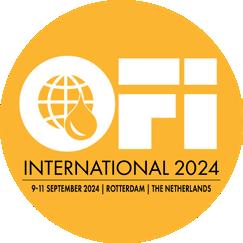
CHINA: Technology provider Chevron Lummus Global (CLG) has announced its ISOTERRA technology has been selected for a sustainable aviation fuel (SAF) project in China.
As part of the agreement, CLG would provide the technology licence, engineering services, supply proprietary equipment and catalysts.
The 400,000 tonnes/year renewable fuels plant would produce SAF from a range of lipid feedstocks, including plant-derived oils, animal fats and used cooking oil (UCO), CLG said on 13 June.
In addition, the plant would have the capability to produce renewable diesel.
The project would enable the operator to become a major SAF producer in the region, supporting China’s dual carbon goal of reducing carbon emissions by 2030 and carbon neutrality by 2060, CLG said.
To address the complexities of renewable feedstocks and maximise SAF production, CLG said the ISOTERRA unit would operate using a twostage process using EnRich hydrotreating and EnHance isomerisation catalysts.
A joint venture between Chevron USA and Lummus Technology, CLG is a leading technology provider for the production of renewable and conventional transportation fuels, premium base oils, and petrochemicals from a wide range of feedstocks.
Romanian energy company OMV Petrom is set to invest €750M (US$805M) in its Petrobrazi refinery in a bid to become the first major producer of sustainable fuels in southeast Europe.
The plans included a sustainable aviation fuel (SAF)/hydrotreated vegetable oil (HVO) facility and two facilities for green hydrogen for use in biofuels production, the firm said on 11 June.
From 2028, OMV Petrom said its aim was to supply around 250,000 tonnes/year of SAF/HVO.
Its new facility would also produce by-products like bio-naphtha and bio-LPG, for use in the chemical industry. The two new green hydrogen production units would supply most of the SAF/ HVO facility’s hydrogen needs, the company said.
Located in the southern city of Ploiesti, Petrobrazi is the first refinery in the country certified
to produce SAF and HVO through the co-processing of biological raw materials, according to the company.
To ensure raw material supply to produce biofuels, OMV Petrom said it had acquired a 50% stake in Romanian used cooking oil (UCO) collector Respiră Verde, which collected up to 10,000 tonnes/year of used edible oil from the hospitality industry and retail sectors.
According to its website, OMV Petrom is the largest integrated energy producer in southeastern Europe.
The group has a refining capacity of 4.5M tonnes/year and operates an 860MW gas-fired power plant. It is active in the oil products retail market in Romania and neighbouring countries through approximately 780 petrol stations under two brands – OMV and Petrom.
Global agribusiness giant Cargill is halfway through construction of its new canola plant in Saskatchewan, Canada.
Although work had started on the site at the company’s Global Transportation Hub in West Regina in 2022, the project had faced “challenges and many headwinds” but was now scheduled to open next year, Cargill said on 16 July.
The US$350M facility would have the capacity to process 1M tonnes/year of canola to produce crude canola oil for food and biofuel markets, and canola meal for animal feed.
“The addition of the Regina facility to the Cargill network

… will connect the Canadian canola industry to the expanding domestic and global market opportunities for vegetable oil, high quality meal and biofuels,” Cargill Canada president Jeff Vassart said.
To support rail and road infrastructure around the
new plant, Cargill said it had purchased just over 162ha of land near the Global Transportation Hub.
This would allow for better connection to existing rail lines, providing access for meal pellets and canola oil markets, the company said.
Speciality chemical company Evonik is set to increase sodium methylate production at its Rosario plant in Sante Fé province, Argentina, to raise biodiesel productivity and reduce production costs across South America, the company said on 12 July.
Evonik said it planned to increase annual production at the plant by some 50% from
60,000 tonnes to 90,000 tonnes.
“The sodium methylate plant is very important to Argentina and other countries in the region, with Brazil acting as a major export destination,” Evonik’s regional president for Central and South America Dr Hendrik Schönfelder said.
The move followed an announcement by the Brazilian
government that it would be increasing mandatory biofuel blending quotas to 15% (B15) next year and was also in line with the country’s New Industry Brazil (NIB) policy of boosting national industry and expanding biofuels’ share in the transportation energy mix.
Evonik said the increased production at the Rosario plant was part of its global strategy
and long-term vision to drive advances in the biodiesel sector.
“South America is a significant strategic growth region for us and we are pursuing our goal of being close to our customers, both in South and North America and in the Asian market,” Evonik executive board member Harald Schwager said.



















The ability to continuously monitor production processes brings with it the ability to manage and optimise production in real time. This is as true in oilseed processing as it is in any other industry.
While there are a variety of in-line analytical options already in widespread use in the industry; temperature, pressure, flow and some forms of spectroscopy, there is a lot more control that could be achieved with higher precision, reliable on-line analytics.
Spectroscopy is a technique that allows non-destructive, non-extractive analysis of processes in real time, using the fact that different chemical bonds absorb light at different, specific frequencies. Spectrometers, predominantly NearInfrared (NIR) instruments, have been in the industry for a while, but this technique is limited in its ability to measure key components with enough accuracy to allow true real-time control.
The Mid-Infrared (MIR) region of the electromagnetic spectrum is more information-rich than the NIR region, and thus Mid-IR spectrometers are inherently more informative, accurate and precise than NIR spectrometers. However, the
The use of mid-infrared (MIR) spectroscopy is being deployed in European and North American oilseed processing plants, offering more accurate and precise real-time information to monitor and optimise production Dan Wood Source:
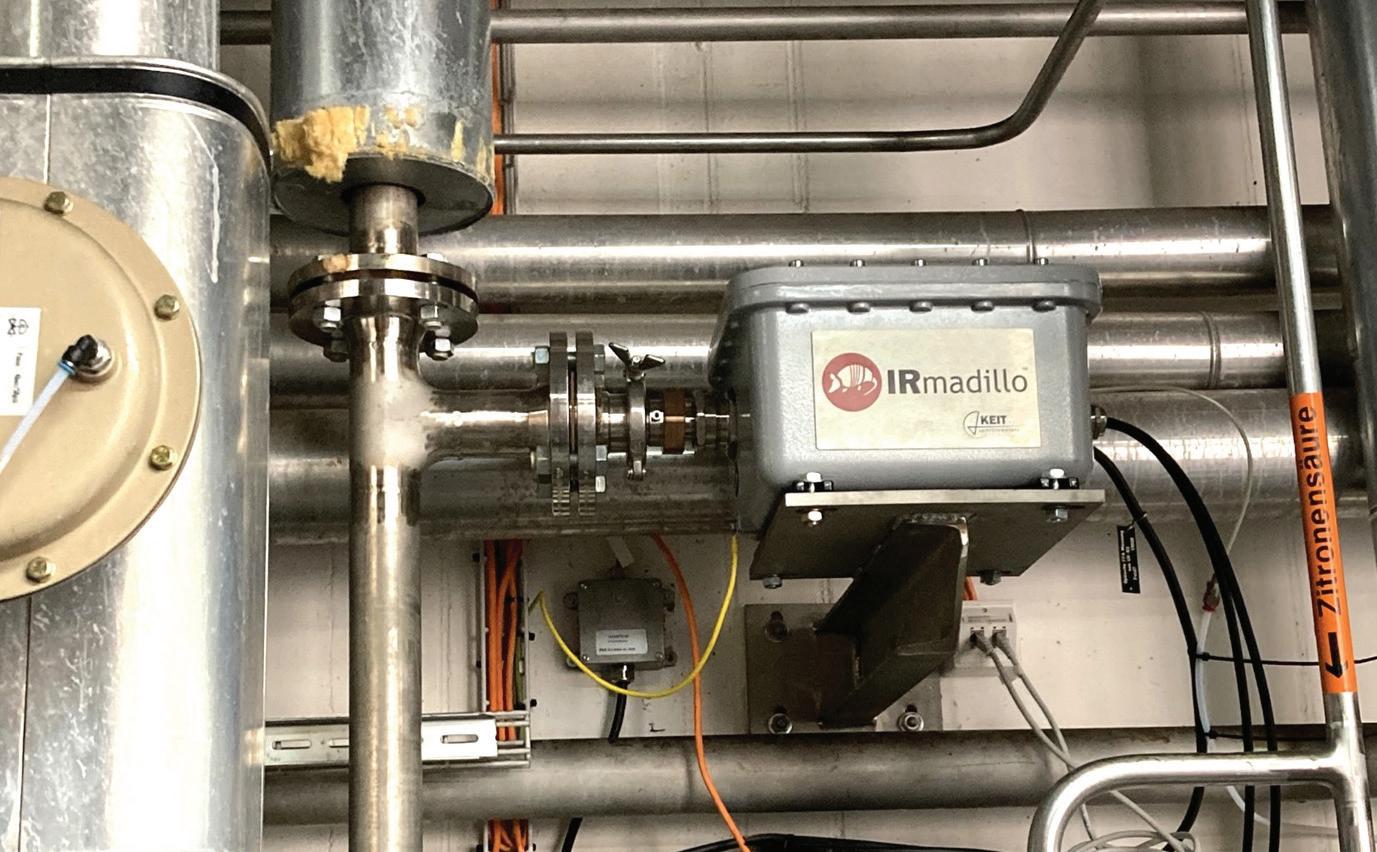
use of MIR spectrometers in production processes has been limited to date by their vulnerability to the vibrations prevalent in any production facility, so the extra analytical performance of Mid-IR has largely been confined to the laboratory.
In many cases, the current method of analysis, particularly for free fatty acids (FFA) is to manually extract samples from the process and perform titrations in the laboratory. Not only does this consume resources in the sampling and analysis workflow, this approach tells the operators what was happening when they took a sample with no indication of process dynamics or what may have
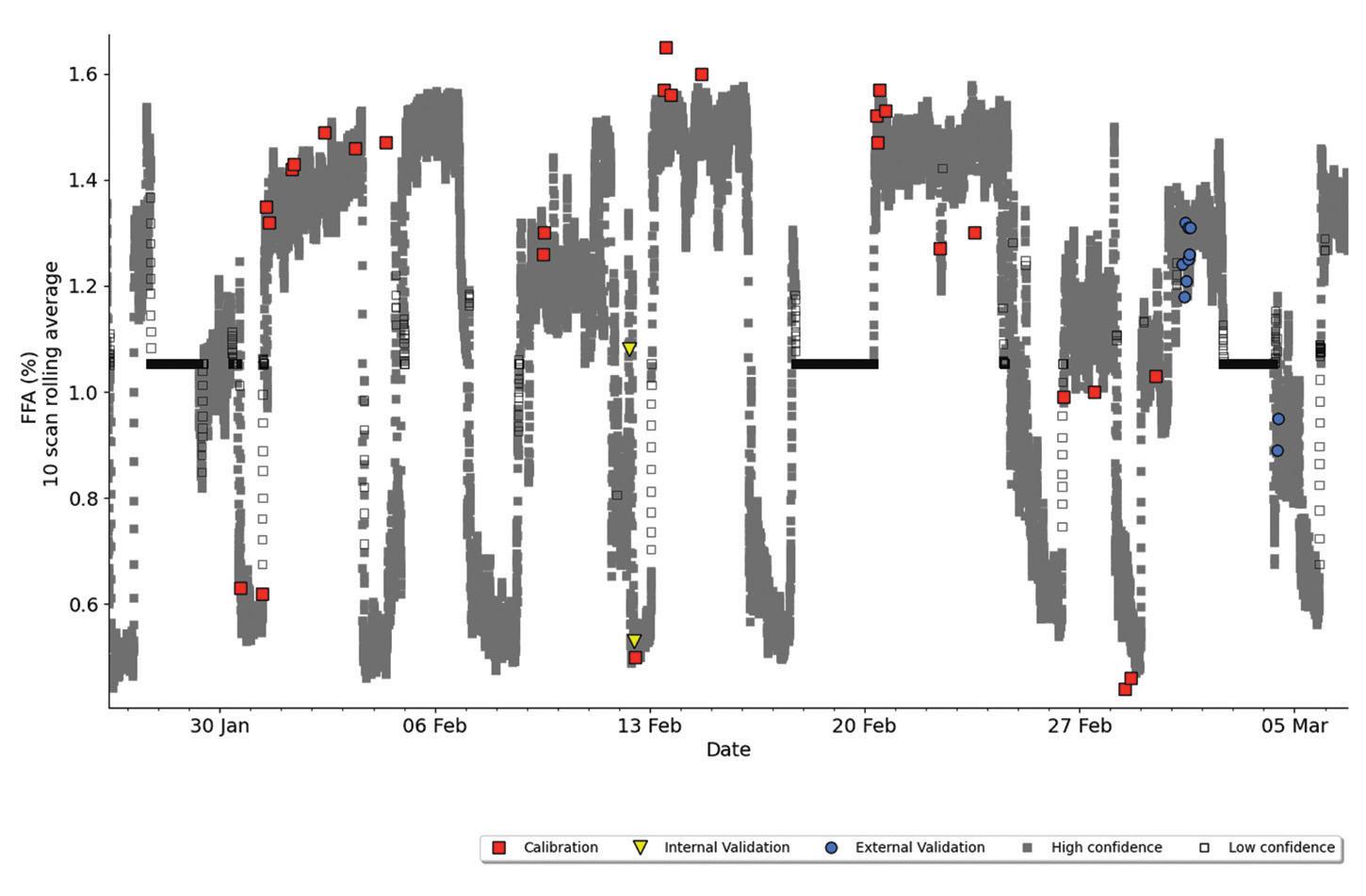
happened between samples. Offline sampling is also prone to human handling errors or imperfect analysis.
A recent invention from the UK Space Agency has led to the development of a Mid-IR spectrometer that uses fixed optics in a design inherently immune to vibration, opening up the opportunity to bring the enhanced analytical power of the Mid-IR to production processes. That invention is now embodied in the IRmadillo analyser from Keit Industrial Analytics, which is being deployed in the oilseed processing industry in both European and North American facilities.
Using the IRmadillo, processing plants are able to measure FFA and phosphorous (P) content in crude oil inlets in real time, with no extractive sample process.
FFA and P levels can vary significantly based on the seed type, growing conditions and material handling prior to arrival at the crush plant.
FFAs need to be neutralised through the addition of caustic solution, usually sodium hydroxide, a significantly expensive material. A plant needs to add precisely the right amount of caustic to neutralise the acids – too little, and further downstream remediation is required; too much, and expensive caustic is wasted, and soaps are created, which also need to be subsequently removed. Work at various oil processing plants has shown the IRmadillo can measure
FFA with an accuracy of ± 0.2%. Figure 1 (previous page) shows the continuous FFA measurement from the IRmadillo compared to the offline titration results achieved in the laboratory.
Phosphorous concentration is another key parameter required for efficient operation. Phosphorous, in the form of phospholipids, need to be removed through the addition of acid. Acids are required to carry out the required degumming of crude oil, and if P levels are not known accurately, there are risks of over-adding, which will require subsequent remediation, or under-adding, with associated gumming issues.
Detection levels and accuracy depend on the oil type: in water-washed sunflower and rapeseed, accuracies of ±510ppm have been recorded over a range of 5-300ppm. In water-washed soyabean oil, accuracies of ± 0.5 ppm have been recorded over a range of 0.6–2 ppm (see Figure 2, right). This level of accuracy enables very accurate, and therefore efficient, addition of acid.
Yield increases at Florin
Florin AG, Switzerland’s largest producer of edible oils, has installed this system at its Muttenz, Switzerland facility.
Florin works across the entire production process from selection and pressing of raw materials through to production and distribution of end products. In the manufacture of edible oils, it processes a range of different oilseeds including rapeseed, sunflowerseed, high oleic sunflowerseed and high oleic low linolenic rapeseed, both local and imported.
FFA content and phosphatides in crude oil can vary dependant on the feedstock. Therefore, being able to measure the FFA and phosphorous content of a range of feedstocks in a single model allows operators to ensure the oil is always within quality limits without prior knowledge of the incoming feedstock.

At Florin, Keit’s IRmadillo MIR spectrometer was installed on the inlet of the centrifuge, upstream of the caustic addition point, and calibrated to monitor the FFA and phosphorus content in the oil (see image, previous page).
FFA and P values were reported every two minutes to the plant control system, with real-time measurements of FFA content upstream leading to more controlled and accurate caustic addition. This has resulted in yield increases and savings in the amount of sodium hydroxide used during neutralisation. The return on investment has been estimated by Florin to be approximately one year.
“By measuring in the infrared range, it is possible to measure various parameters simultaneously and directly. Calibration can be carried out with a manageable number of samples,” said Steffen Müller, project leader, R&D, at Florin.
This addresses one of the standard concerns about near NIR spectroscopy, which requires many more samples to be taken for calibration purposes, something

that imposes a significant administrative load on the operators.
Valtris Champlor, a rapeseed process facility in Verdun, France, is also using the IRmadillo to control its complex processes. The company’s feedstocks include low phospholipid press oil and high phospholipid oil from solvent extraction. The phosphorous content of the combined feedstocks can therefore vary considerably, with the phospholipids content controlled by acid base dosing, an added cost.
In the absence of real-time knowledge of the feedstocks’ phospholipid content, the plant would typically set the chemicals addition rate at an excess, a wasteful process that can also lead to reduced product yield.
The challenge was to install a robust real-time process analyser which would enable a reduction in chemical consumption while ensuring the process remained within specification.
Keit’s IRmadillo MIR spectrometer was installed after the centrifuge and calibrated to monitor the degummed oil for phosphorus, calcium and magnesium content and the level of FFA (see image, left)
Real-time measurements of residual phospholipid content led to significant cost savings. The phosphoric acid could be more efficiently dosed, with an 11% reduction in phosphoric acid use overall. Because less phosphoric acid is being used, NaOH consumption has also reduced by 13%. The production costs per tonne of refined oil have fallen by 15%, saving the plant an estimated €90,000/year. ● Dan Wood is CEO of Keit Industrial Analytics
Although global palm oil production is dominated by leading producers Indonesia and Malaysia, Latin American countries are emerging as important players in the sector, showing leadership in adopting sustainable practices
Gill Langham
Latin America – generally understood to comprise the entire continent of South America in addition to Mexico, Central America, and the islands of the Caribbean where a Romance language is spoken – is emerging as a hub of sustainable palm oil production and an increasingly important global exporter.
“The last decade has seen [the region’s] output of crude palm oil more than double from 2.2M tonnes in 2010 to just under 5M tonnes in 2023,” Julian McGill, an agricultural economist and managing director of consultancy Glenauk Economics, says.
Colombia – the region’s largest producer is the fourth largest producer of palm oil globally, after Indonesia, Malaysia and Thailand (see Figure 1, following page).
“In Colombia the oil palm has had a particularly important role in providing rural employment,” he says.
Alongside growing output, Latin America is also increasing exports, with Guatemala the region’s leading exporter and the fourth largest exporter in the world, just after Thailand, McGill says (see Figure 2, following page).
Latin America is the fastest growing region in the world in terms of certification, including smallholder certification, according to the Roundtable on Sustainable Palm Oil (RSPO). It also has the highest level of RSPO certification among palm oil-producing regions.
According to the latest RSPO Annual Communication of Progress (ACOP) published in 2021, among the five main growing countries and regions, Latin American growers continue to perform well, with 27% of the region’s total production comprising certified sustainable palm oil (CSPO), with potential for a further 43% in line for certification.
At the time of the ACOP report, RSPO membership represented 70% of total palm oil production in Latin America.
Certified growers and producers in Latin

America achieved 2M tonnes of CSPO in October, representing one-third of the region’s total palm oil production.
“This landmark achievement reflects the consolidated efforts among certified growers and producers in Brazil, Colombia, Costa Rica, Ecuador, Guatemala, Honduras, Mexico, Panama and Peru, covering a total of 656,000ha of certified land,” the RSPO says.
As part of its drive to increase sustainable practices in Latin America, the RSPO formed a sustainable palm oil alliance in the region earlier this year, with international civil society organisation Solidaridad.
While palm oil projects in Latin America have traditionally been managed independently, the new alliance aims to unify the work of both organisations across Colombia, Guatemala, Honduras, Mexico, Nicaragua and Peru.
As part of the initiative, more than 1,300 smallholders across 14,600ha in Latin America will be helped to adopt sustainable production practices and, ultimately, certification, the RSPO says.
“Our goal is to make Latin America the number one continent in sustainable smallholder oil production,” Solidaridad Mexico project manager Jorge Solano says.
“By unifying our projects and creating a cohesive platform, we can streamline management and foster a comprehensive approach to sustainable practices.”
In another partnership between the RSPO and Solidaridad – alongside Sweden’s AAK – the organisations have been working in Mexico to increase engagement with smallholder farmers since May as part of their drive to promote sustainable palm oil practices in Latin America.
“Smallholders are at the core of Mexico’s palm oil sector, and it is fundamental to strengthen our partnership with them throughout their journey towards RSPO certification,” RSPO CEO Joseph D’Cruz says.
“We must ensure that the progress of the sustainable palm oil sector paves better livelihoods and economic growth for these smallholders and their communities.”
One of the key commitments of the agreement is a pilot project, involving the participation of 250 producers and four extraction plants, to assess the needs and gaps in sustainable and certified production.
The final goal of the pilot is to set out a roadmap to ensure smallholders become RSPO certified.

The pilot project evaluation will be carried out in two stages: first, involving the use of the Extension Solution digital tool, designed by Solidaridad Brazil and adapted by Colombia to meet the standards of independent smallholders.
This tool will measure the producer’s degree of compliance with the RSPO Standards and provide immediate results on field activities. In the second stage, the AAK monitoring and evaluation framework will be used to generate data on compliance with company policy.
Colombian firsts
In Colombia, 30% of the production and planted area is certified under a sustainability standard, according to the National Federation of Palm Oil Growers, Fedepalma.
Speaking in June, Fedepalma executive president Nicolás Pérez Marulanda said the country’s sustainable palm oil strategy APSColombia was showing positive results one year after being introduced, achieving 310 certified palm growers, of which 70% were small-scale producers.
Last year marked a first in Colombia, when local smallholder group, Unión Temporal Entrepalmeros, became the first independent smallholder in the country to obtain RSPO certification.
This year, a second Colombian group of
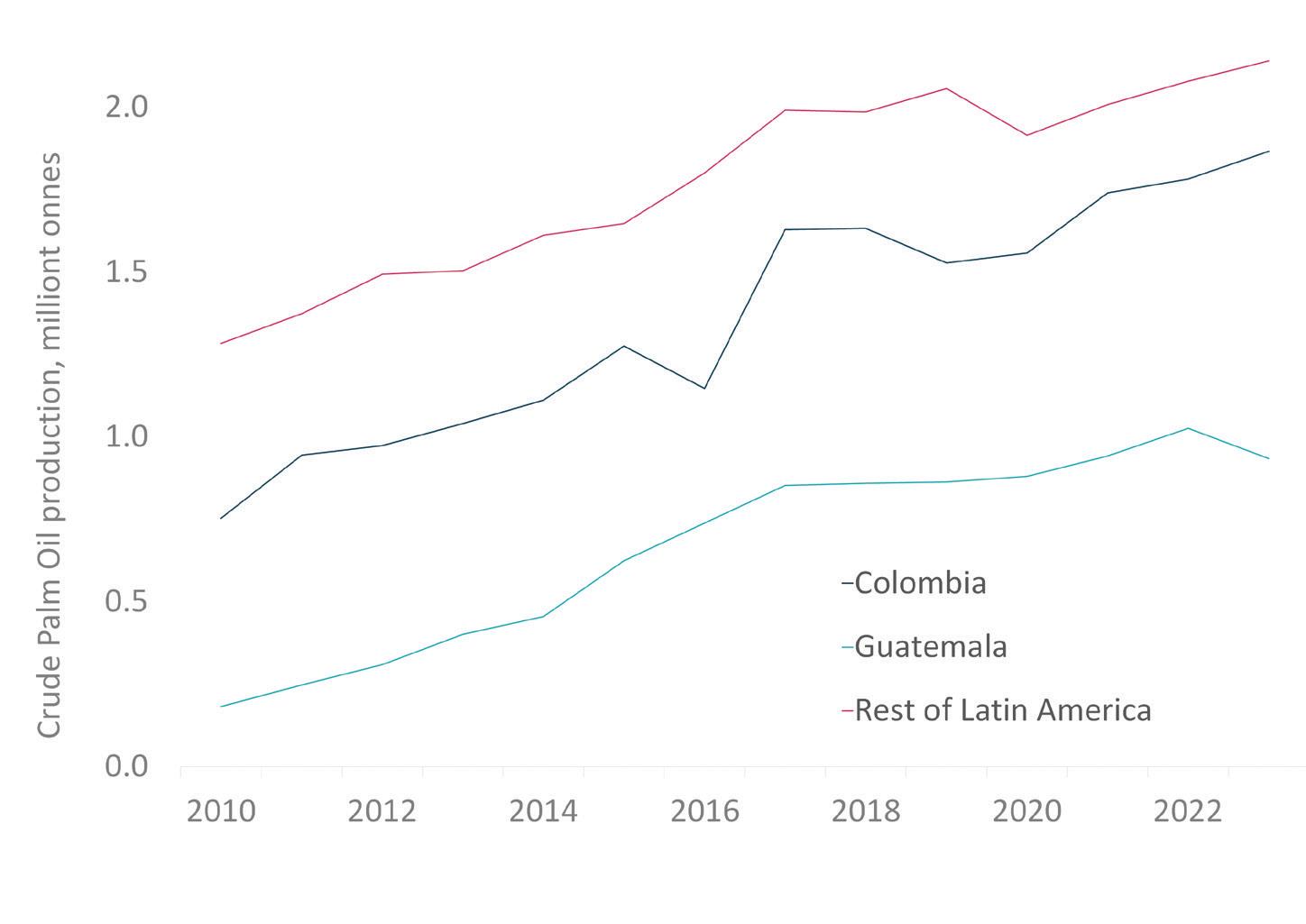
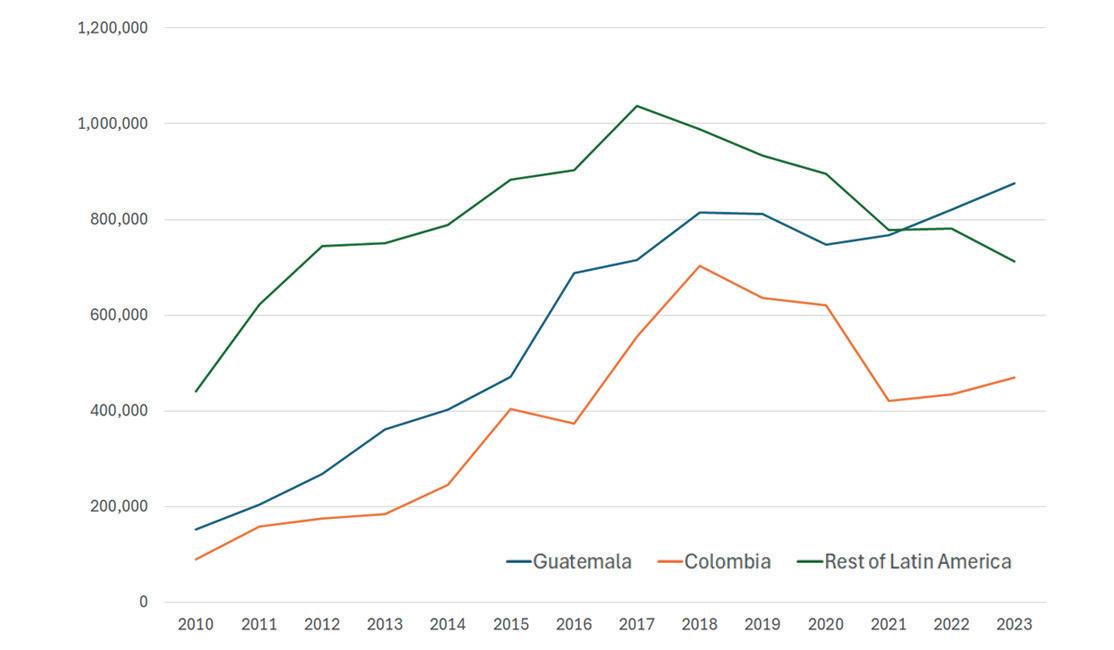

smallholders, Asociación de Palmicultores Sostenibles del Magdalena, also gained RSPO certification.
Looking ahead, Pérez highlighted the importance of understanding the effects of climate change and the work carried out to explore new market opportunities such as advanced biofuels and animal feed.
Today, biodiesel represents the second largest market for Colombian palm oil, with around 700,000 tonnes/year annually used in its production, Pérez added.
Latin America’s second largest producer/ exporter Guatemala has the highest crude palm oil (CPO) yields in the world, Glenauk Economics’ McGill says.
According to latest data from the Guatemalan association for palm oil producers GREPALMA, the nation had an estimated 180,614ha of oil palm cultivated in 2023, representing 1.66% of the country’s surface.
The country had 230 oil palm farmers –51% of them smallholders, 35% mediumsized producers and 14% large-scale producers – with 60% of total production certified by standards such as RSPO and ISCC.
Guatemala took early steps to avoid deforestation, including satellite mapping of the entire country, McGill says.
At the time of the report, 88% of Guatemalan palm oil was exported with the remainder consumed locally.
The palm oil sector contributed 1.6% to the country’s GDP in 2023 and was the country’s main export product to the EU and Mexico and its fourth largest export product to Central America.
One of the drivers behind Latin America’s high palm oil yields is the fact that the region’s producers had substantially higher costs than South East Asian producers – although the difference has narrowed – which meant that companies were strongly focused on yield improvement, Glenauk Economics’ McGill explains.
“In addition, the industry benefited from experience in planting bananas – a very difficult crop to grow successfully. The discipline instilled by banana farming has given them a strong foundation for managing oil palm plantations,” he says.
The focus on quality and sustainability is also the result of how the Latin American palm oil sector has developed, McGill adds.
“With no established tradition in oil palm, managers were more open to alternative approaches. In addition, they
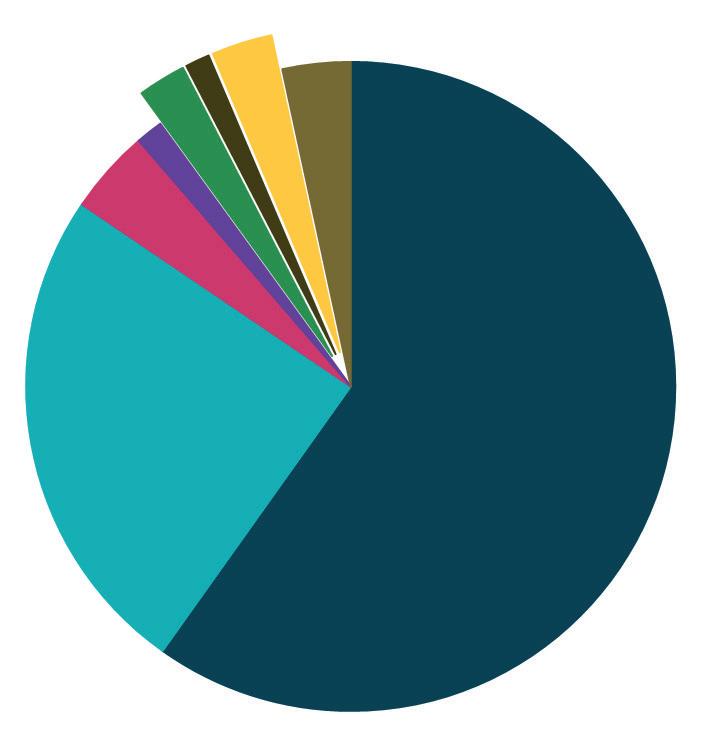

often had a background in food sciences and took these standards into the milling of oil palm,” he says.
“As a result, companies in Colombia, Guatemala and Brazil are among the pioneers in terms of delivering low Mineral Oil Saturated Hydrocarbon (MOSH)/Mineral Oil Aromatic Hydrocarbon (MOAH) palm oil.”
In addition, the industry took many early steps to avoid deforestation including – in the case of Guatemala – satellite mapping of the entire country, he adds.
A large share of CPO exports from Central America are destined for Europe, with around 70% of Guatemalan shipments going to the EU-27, McGill says.
“Despite their proximity to the USA, central American exporters struggle to compete with the large low-cost shipments from Indonesia and Malaysia.
“This is partly the reason why Central American exporters have been willing to engage with European requirements in terms of sustainability.”
However, the volumes of Latin American CPO are too small to supply the entire EU market, he adds.
consumption growth
Alongside increased exports, Latin America has also seen an uptake in domestic consumption, according to McGill.
“Colombia has developed a large biodiesel mandate, while in Brazil domestic use of palm oil – promoted by Agropalma through its Limeira refinery in São Paulo state – has grown to the extent that the country is becoming a notable importer,” he says.
“As a result, the exportable surplus in most of Latin America has declined since 2018, although Guatemala has continued to increase its exports.”
Despite its growing presence on the global palm oil market, the Latin America sector remains small compared with Indonesia and Malaysia, McGill says.
In 2023, total Latin American production accounted for just above 6% of global output in 2023 and a slightly lower share of exports (see Figure 4, left).
“Growth in Latin America cannot compensate for the slowdown in Southeast Asian crude palm oil production,” he says. In addition, area growth is also slowing in Central America (see Figure 3, previous page).
“While growth is still faster than in Malaysia and Indonesia, it has slowed substantially. High labour costs and issues navigating native land tenure means we do not see scope for rapid expansion in the oil palm [sector] in Latin America,” he adds.
Other challenges in the region include outbreaks of disease such as bud rot, which is impacting large areas in Colombia and threatening plantations in Brazil, Ecuador and Peru, McGill explains.
A new breed of oil palm olifera that is resistant to bud rot is being developed.
“However, the tree requires assisted pollination which is extremely labour intensive and expensive. In addition, the oil has a high share of oleic acid and therefore cannot be easily refined alongside crude palm oil,” he says.
Although several Latin America palm oil producers are world leaders in terms of yield and the sustainability and quality of their oil, in terms of volume leading producers Indonesia and Malaysia will continue to dominate global output, according to McGill.
“Latin America will not be a major driver of future palm oil supply,” he concludes. ●
Gill Langham is the assistant editor of OFI
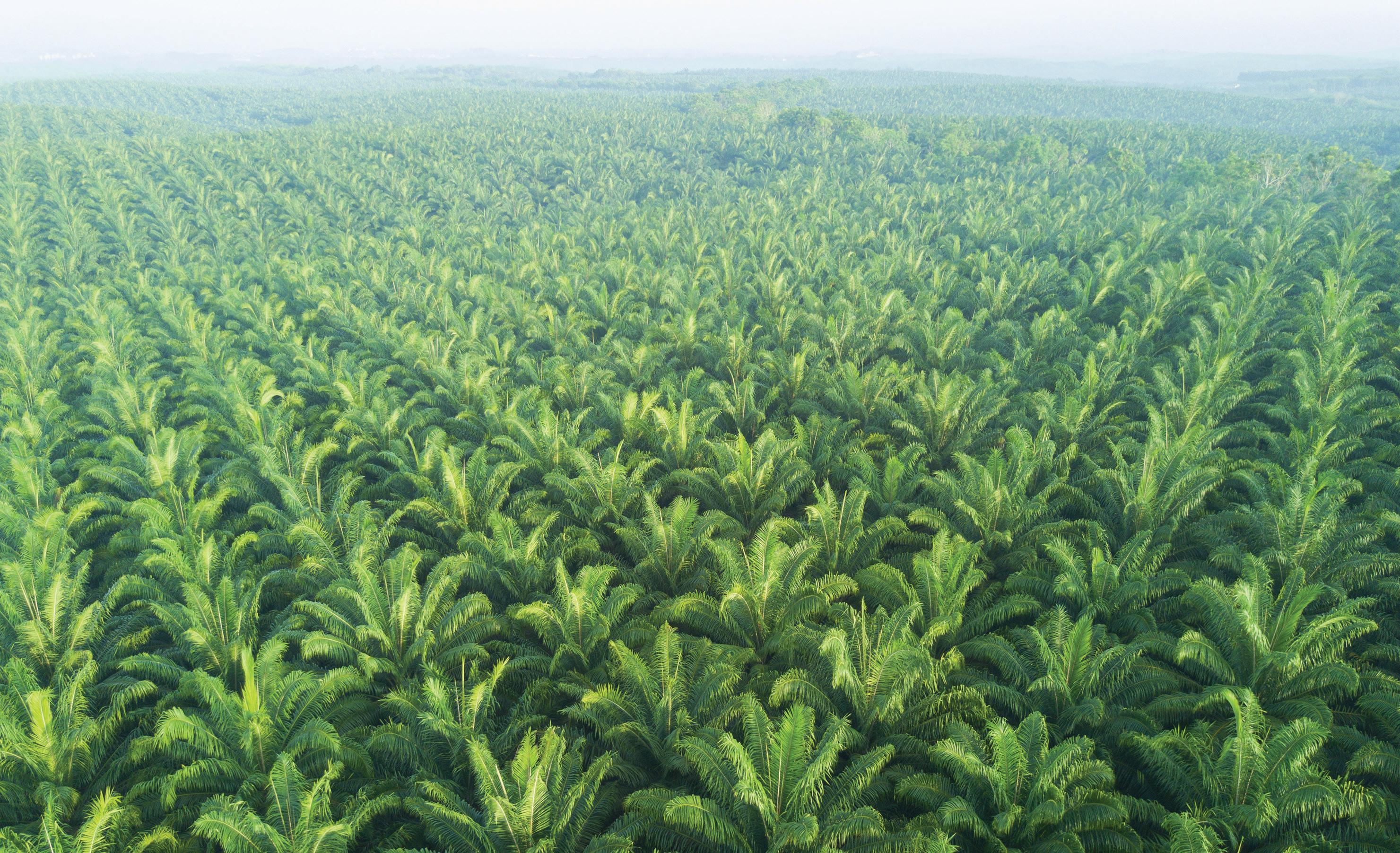
A ‘bureaucratic monster’ that risks causing supply shortages and price rises across Europe, or essential legislation to prevent global deforestation that doesn’t go far enough? The EU Deforestation Regulation (EUDR) is dividing opinion across Europe and beyond.
From 30 December 2024, companies will have to prove that the soya, cattle, palm oil, wood, cocoa, coffee and rubber products that they import into the EU, export from the EU or place on the EU market do not come from any area deforested since December 2020.
The goal may be laudable but implementing the legislation is fraught with practical challenges. Under the EUDR, companies that use any of these commodities will be required to prove that they are deforestation-free, while meeting certain standards relating to land use rights, anti-corruption and human rights.
As part of this process, they will need to provide full traceability, including data on the specific geographic locations of the farms and plantations themselves – which depends on having access to this data from mills and growers.
The EUDR represents a major change that impacts palm oil users at every step of the supply chain, from smallholders to retailers.
The positive news is that the palm oil industry is reasonably well prepared for the EUDR, especially when compared to some of the other commodities in scope.
In Europe, 93% of total palm oil imports
With the EU Deforestation Regulation (EUDR) on the horizon and similar legislation in the pipeline for the UK and USA, what will be their impact and how prepared is the oils and fats industry?
Barnaby Patchett
are Roundtable on Sustainable Palm Oil (RSPO) certified sustainable, with 90% of this volume counted as segregated – which means it is traceable back to the mill. The RSPO has developed a new digital platform, PRISMA, enabling members to access much of the data they need to prove compliance.
One challenge that has yet to be addressed is smallholder access. While there is good traceability back to oil palm mills and for larger plantations, there simply is not the data available yet to trace palm oil volumes back to every individual smallholder plantation, which account for around 40% of global supply.
While mills are actively looking to obtain this data, it will take time, due to the way that smallholder crops are aggregated.
To counter this challenge, traders are already considering creating a split supply chain – where palm oil from larger plantations is sent to the EU market, and palm oil produced by smallholders is sent to other markets.
This brings its own issues – smallholders will be able to continue producing ‘conventional palm’ on deforested land for sale to markets outside the EU. At the same time, compliant smallholders could be excluded from the EU market, removing the incentive to farm
responsibly.
There are also potential challenges in palm kernel oil (PKO) and palm kernel expeller which do not have the same certification levels as palm oil. Around 62% of PKO sold in the EU carries some kind of sustainability certification and just 5% of palm kernel expeller. As a result, there is a real possibility of supply challenges and price rises for these oils, as Manuel Davila, MD of Daabon UK and Europe explains:
“Although there will be pressure on the supply of segregated certified sustainable palm oil, I think the market will be able to cover supply. With PKO and PKE, it’s a different picture – the levels of traceability and sustainability certification don’t cover enough product and, until that changes, we expect to see customers competing for available supply.”
The EUDR also calls into question the future of RSPO Mass Balance certification (where certified sustainable palm oil is mixed with non-certified palm oil) in the EU, due to the challenges associated with tracing the origin of the conventional portion of the palm oil.
The EUDR is considered a pivotal component in the EU Green Deal
Framework but there are signs that the political winds are changing. Although the latest official statement from the EU Commission is that the regulation will go ahead as planned, on time and in full, there are growing signals this may not be the case.
There have been strong calls from the industry for more time to prepare for the legislation and more clarity from the EU.
Now, elements within the European Parliament are asking to modify, delay or dilute the legislation. In June 2024, Peter Liese, environmental spokesperson for the European People’s Party, the largest party in the European Parliament, called for a postponement. Referring to the legislation as a ‘bureaucratic monster’, he also called for changes to reduce the levels of administrative burden.
Even if the EUDR comes in as planned, on time and in full, it seems plausible that there will be an extended grace period where the law will not be fully enforced.
Looking beyond the EU, there is real uncertainty in terms of similar deforestation legislation in the UK and USA – in the form of the UK Due Diligence (UKDD) on Forest Risk Commodities and the US Forest Act.
Introduced in November 2020, the UKDD looks to “implement world leading due diligence provisions in the Environment Act to help tackle illegal deforestation in UK supply chains”.
The UK Department for Environment, Food and Rural Affairs (DEFRA) was due to announce full details on the UKDD earlier this year but due to UK general elections held in July, this was delayed. There are, however, a few known key differences between the UK legislation and EUDR.
These include the commodities covered in the UK proposal – non-dairy cattle products (beef and leather), cocoa, palm oil and soyabean. It is also known that the legislation will only apply to UK businesses with a turnover of more than £50M, and that organisations which use less than 500 tonnes of a commodity will be exempt.
The UKDD legislation will only ban businesses from using regulated commodities from land that has been illegally deforested – whereas the EUDR bans the use of commodities from any land deforested since December 2020, legal or illegal.
Another difference is in how the UK proposal treats certain palm oil fractions and derivatives – some of these are excluded from the EUDR legislation: the
‘The EUDR is a big step forward for the whole industry. It makes supply chain transparency an immediate priority for businesses of every size, not just the big brands who have been focusing on this for some time’
UKDD covers all fractions.
In practice, the UKDD looks like it will be less onerous in terms of the administrative burden. Rather than requiring full traceability back to the ‘polygon’ as in EUDR, the UKDD simply requires businesses to do due diligence and report on this exercise annually.
The biggest challenge probably lies in the oleochemicals industry – due to problems in tracing the origins of certain palm fractions and derivatives.
The USA has been considering deforestation legislation since 2021 and the latest iteration – the Forest Act 2023 – was introduced to Congress in November 2023.
Should the bill pass, importing palm oil, soyabean, cattle, cocoa and rubber products to the USA will be prohibited unless importers can certify that these products were not sourced from illegally deforested land.
When importing from countries classified as high-risk and requiring an ‘action plan,’ importers must provide detailed supply chain information, including the origin of the products, and show the measures taken to mitigate any identified risks.
Should it go through, the legislation looks more similar to the UKDD than the EUDR in terms of industry obligations on due diligence. However, with the chances of a political shift in the USA looking
possible, the legislation may struggle to move through Congress, and could even be shelved.
Another piece of legislation that could impact the palm oil industry is the upcoming EU regulations on levels of MOSH (Mineral Oil Saturated Hydrocarbons) and MOAH (Mineral Oil Aromatic Hydrocarbons).
The challenge here, once again, is uncertainty, as Gary Lewis, president of the UK National Edible Oil Distributors Association (NEODA), and sales director at KTC Edibles, explains:
“It’s challenging for industry to prepare for MOSH/MOAH regulation without more clarity on the details and practicalities of any upcoming legislation, specifically around acceptable levels and testing requirements.
“The timing is challenging too –preparing for a potential new quality standard at the same time as EUDR is putting a lot of pressure on the whole industry. Although we are seeing guaranteed low-MOSH/MOAH palm oil entering the market ahead of this legislation, it does come with a price premium attached.
“The results are a tightening of the palm market as a whole – with price rises possible.”
The message for operators in the edible oils and fats sector is to be prepared.
Whether or not the EUDR is delayed, and other legislation is postponed, the direction of travel is clear. Palm oil users should prepare as though the EUDR is coming into force in December 2024. That means acting now, as sustainable palm oil expert Judith Murdoch, of Murdoch Associates explains:
“The EUDR is a big step forward for the whole industry. It makes supply chain transparency an immediate priority for businesses of every size, not just the big brands who have been focusing on this for some time.
“Legislation like the EUDR is just the start, as governments around the world take steps to tackle the challenges posed by climate change. The good news is that as upstream suppliers will be obligated to share data, there is a real opportunity for businesses to gain a clear understanding about their palm oil supply chain. With it, they can improve their own reputations and boost consumer confidence in choosing sustainable palm oil.” ● Barnaby Patchett is the managing director of One Nine Nine Agency, UK


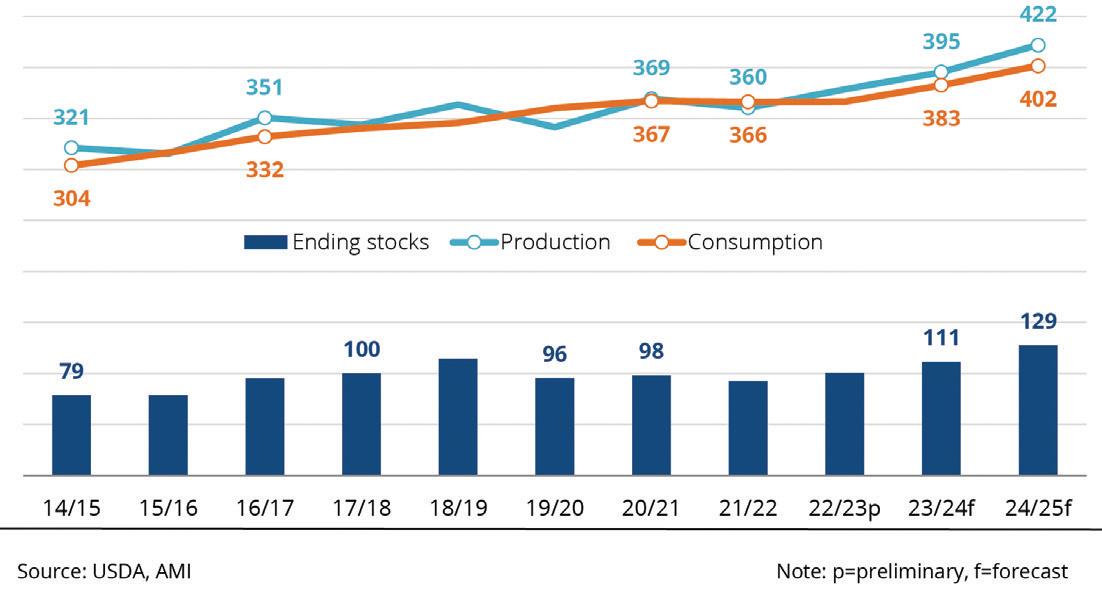
Palm oil
The Expana Benchmark Prices (EBP) for crude palm oil (CPO) CIF Rotterdam was assessed at US$1,022/tonne on 14 August, down by 0.5% month-on-month (m-o-m) but up 8.8% year-on-year (y-o-y). Further downward pressure in the palm oil market has been limited by increased demand, particularly from major consumer India. The latest Malaysian Palm Oil Board (MPOB) update, viewed as slightly bullish by market players, revealed a 5.35% m-o-m decrease in Malaysian palm stocks to 1.73M tonnes in July. Exports increased significantly by 39.2% m-o-m. Meanwhile, production rose by 13.97% m-o-m in July, falling within market expectations.
With supply concerns in the rapeseed oil and sunflower oil markets, demand direction for palm in lieu of alternatives, will be a watch point. Market sources say that demand from China could be limited in the short term due to heavy stocks of palm oil and other major oils (soyabean and rapeseed oils).
According to the US Department of Agriculture (USDA), global palm oil production for the 2024/25 season is projected to reach 79.8M tonnes; up by 1% on the year.
Used cooking oil (UCO), tallow and grease
While used cooking oil (UCO) imports to the USA from China have risen in the past months, in lieu of soyabean oil for biodiesel usage, concerns have risen about fraudulent UCO. According to market sources, UCO from Asia mixed with other vegetable oils including palm oil have reportedly been imported to the USA; distorting commodity values and undermining US biofuel laws. Thus, the Environmental Protection Agency (EPA) has launched an investigation into the matter; scrutinising the sources of UCO to verify the authenticity of imports.
In Indonesia, Expana has learnt that the Coordinating Ministry for Maritime Affairs and Investment has endorsed a proposal to classify UCO as a commodity, opening the door for its downstream use in biofuel production as part of efforts to strengthen the country’s biofuel reserves.
Soyabean
In its latest outlook, the USDA minimally lowered its forecast for global soyabean supply but still expects a bumper 2024/25 season crop of 421.6M tonnes, representing a 26.4M tonne rise on the previous year. This suggests that more soyabeans will be harvested worldwide than ever before. An increase in planted area in Brazil is forecast due to strong local and international demand, particularly from the biofuel sector in North and South America.
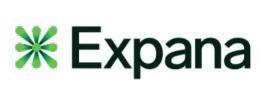
Expana provides independent insight and data to help companies make informed commercial decisions.
Tel: +44 (0)1628 851313
E-mail: sales@Expanamarkets.com Website: www.Expanamarkets.com


9-11 September 2024
Rotterdam Ahoy Convention Centre, the Netherlands
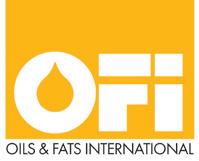

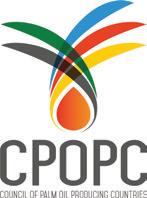




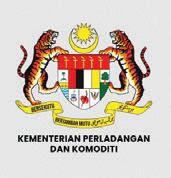





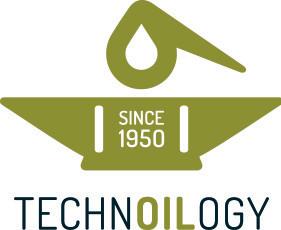

















■
■
■ Patented system of energy recovery
■ Complex approach including Physical Oil Re ning











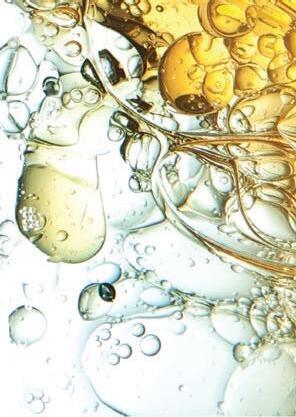




Welcometo OFI International (OFI) 2024, a brand new event being held at the Rotterdam Ahoy Convention Centre in the Netherlands on 9-11 September 2024. At this major industry event of the year, we are proud to bring together all stakeholders in the oils and fats industry under one roof, focused on the theme of ‘Solutions for Sustainability, Processing and Trade’.
The OFI team has put together a twoday Technical Commercial Conference focusing on ‘Innovations in Processing & Refining – Addressing Sustainability and Traceability Challenges in the Supply Chain’. The programme will include latest industry updates on contaminants such as MCPDEs, GEs, MOSH/MOAH, chlorinated paraffins and other persistent organic pollutants (POPs).
A one-day Trade Outlook & Logistics Conference, ‘Managing Risks and Building Supply Chain Resilience’ on 11 September forms part of our packed conference offerings, with respected trade experts speaking on current and future price trends impacting the world’s major vegetable oils including war and climate impacts on shipping; and what traders and producers must do to meet sustainability regulations
such as the EUDR.
OFI International 2024 also features the one-day 3rd Sustainable Vegetable Oil Conference (SVOC) on10 September, focused on ‘Sustainability Transformation Beyond Borders’ and centred around implementation of the EU Deforestation Regulation (EUDR), food and energy security, and the role of vegetable oil in meeting rapid growth of the global population.
During the event, all delegates and visitors will have the chance to visit the major technology suppliers to our industry at our two-day exhibition.
We wish to extend our warmest thanks to all our partners and supporters – the Council of Palm Oil Producing Countries (CPOPC), the Netherlands Oils and Fats Industry (MVO), the Indonesian Palm Oil Association (GAPKI), the Indonesian Palm Oil Plantation Fund Management Agency (BPDPKS), the Indonesian Coordinating Ministry for Economic Affairs (CMEA), the Ministry of Plantation and Commodities (MPC) of Malaysia, the Ministry of Agriculture and Livestock of Honduras (SAG), Euro Fed Lipid, FOSFA International, the Netherlands Oils, Fats and Oilseeds Trade Association (NOFOTA), the Palm Oil Refiners Association of Malaysia
(PORAM), Aboissa and UkrAgroConsult. With their support and the presence of major companies, suppliers, traders, policy experts, and renowned speakers, OFI International 2024 promises to be the major networking event of the year. We wish everyone a successful show and hope you will all leave with new information, contacts and perspectives at a time of major change, challenges and opportunities for our industry.

C3
Tony Crinion welcomes visitors to OFI International 2024
C5-6 Organisers, supporters, partners, timetable and OFI team
C7 OFI International 2024 Technical Commercial programme
C8 OFI International 2024 Trade Outlook & Logistics programme
C9 Floorplan and exhibitors list C10-19 Exhibitor profiles














Oils & Fats
International (OFI) specialises in the global oil crops and animal fats industry, with a flagship magazine, weekly newsletter and worldwide conferences and exhibitions. Since 1985, the magazine has gained a reputation for presenting key issues with a business focus and continues to provide an authoritative and objective source of information for everyone involved in this multi-billion dollar industry. OFI is part of Quartz Business Media, UK, a leading international exhibition and publishing company.
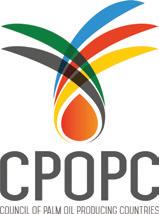
The Council of Palm Oil Producing Countries (CPOPC) is an intergovernmental organisation established in November 2015 to strengthen mutual cooperation between palm oilproducing countries and represent their interests, with Indonesia and Malaysia as founding members. The Council seeks to unite the world’s palm oil producers and represent their priorities, interests and aspirations.

The Netherlands Oils and Fats Industry (MVO) is committed to oils and fats in a sustainable world, is partner in achieving a balance between People, Planet and Profit and represents 95% of companies in the Netherlands that are active in the production, processing and trade of vegetable and animal oils and fats through contacts with the government, politics, social organisations, science and media.
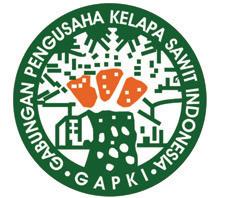
The Indonesian Palm Oil Association (IPOA) – locally known as Gabungan Pengusaha
Kelapa Sawit Indonesia (GAPKI) –works with the country’s central and regional governments to formulate policies for a sustainable palm oil industry and to develop Indonesia’s competitiveness in the global palm oil market.
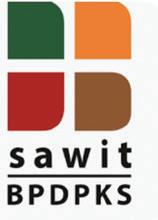
The Palm Oil Plantation Fund Management Agency (BPDPKS) is an Indonesian institution dedicated to managing funds for the sustainability and development of the palm oil industry. Established in 2015, BPDPKS supports research, replanting, human resources, and market expansion, aiming to enhance the sector’s competitiveness while ensuring environmental sustainability and social welfare.

The Coordinating Ministry for Economic Affairs (CMEA) of Indonesia, in accordance with Presidential Regulation No 37 of 2020, coordinates, synchronises and controls ministry affairs in the administration of government in the economic sector.
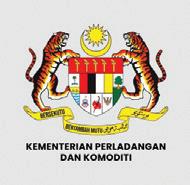
The Ministry of Plantation and Commodities (MPC) of Malaysia is tasked to oversee the development of the agricommodity plantations and industries ranging from production, midstream processing and manufacturing to marketing. The sector has evolved from being a mere producer and exporter of raw materials to producing semiprocessed, processed and finished products.

The Ministry of Agriculture and Livestock of Honduras (SAG) was created by Decree No 218-96, in accordance with the sectoral framework established
in the Law of Modernization and Development of the Agricultural Sector and the Government Plan for the 2002-2006 period. Its objective is to ensure that national agricultural production is competitive, sustainable, and capable of integrating into the international economy, while meeting the needs of the domestic market.

Euro Fed Lipid is a federation of 11 scientific associations concerned with lipids, fats and oils. The federation represents 2,000 individuals and companies. Its mission is the furthering of lipid science and technology and the cooperation and exchange of ideas between scientists and technologists at a European level.

International is a trade federation operating on behalf of its more than 1,200 members. It provides standard contract forms and supporting services that are the foundation for fair and transparent global free trade in oils, oilseeds and fats. FOSFA’s members - representing buyers, sellers, producers and processors, analysts, surveyors and brokers – operate from 90 countries and rely on FOSFA’s services to confidently execute contracts and keep the shipping and transportation of commodities simple and reliable.

Oils, Fats and Oilseeds Trade Association) is the Dutch umbrella organisation of companies connected to the production, consumption and trade of vegetable and animal oils and fats, oilseeds and their derivatives. It draws up standard contracts, which are used internationally, and provides a mechanism for the settlement of disputes by its arbitration institute

The Palm Oil Refiners Association of Malaysia (PORAM) was formed in 1975 primarily to present a representative voice to the government and the trade in all matters related to the palm oil industry. Being a trade association, PORAM is a voluntary, non-profit organisation. Its members comprise companies involved in the refining and related downstream processing of palm oil, palm kernel oil and other vegetable oils including ancillary services.

Founded in 1987, Aboissa stands out as one of the largest and most respected commodity brokers in Latin America. We offer a diversified portfolio of inputs from various market sectors including food; biodiesel; cosmetics; pharmaceutical; fertilisers; hygiene and cleaning; animal nutrition; chemicals; and paints, varnishes and lubricants. Our team is made up of specialists who focus on each product category and who are constantly looking to improve. From planning to post-sales, we maintain a firm commitment to excellence, establishing solid and longlasting business relationships.
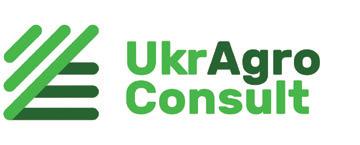
Consulting agency
UkrAgroConsult has 30+ years of expertise in the agricultural markets of the Black Sea & Danube region. The company serves global agribusiness operators from 50+ countries, delivering quality market information and analysis for effective decision-making. Company services include analytical reports on grains and oilseeds, food industry, logistics, agri market research, investment consulting, individual business plans and projects.
UkrAgroConsult annually holds major international agri conferences in the Black Sea region and Europe, including Black Sea Grain and Black Sea Oil Trade conferences and other events.
9 September 2024
12:00-19:00
Exhibitor registration & badge collection
18:00-19.30 Evening Welcome Reception Foyer area, 3rd floor Rotterdam Ahoy Convention Centre
10 September 2024
08:00-17:30
Registration & badge collection
09:00-17:30 OFI Technical Commercial Conference
08:30-17:30 3rd Sustainable Vegetable Oil Conference (SVOC)
09:00-17:30 OFI International Exhibition
3rd floor, Rotterdam Ahoy Convention Centre
19:30 MVO, NOFOTA & FOSFA cocktail reception and dinner (invitation only) Wereldmuseum
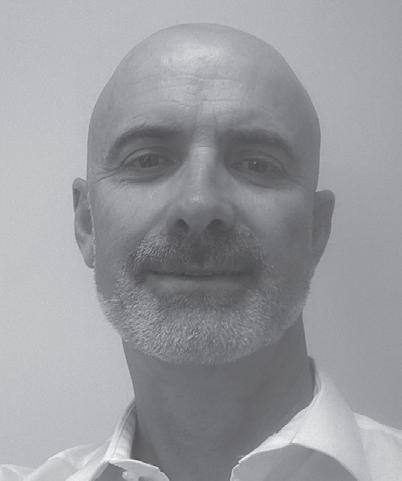
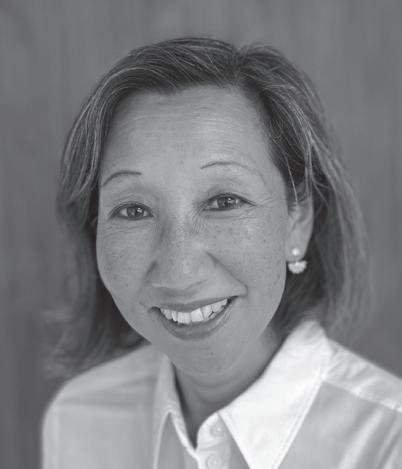
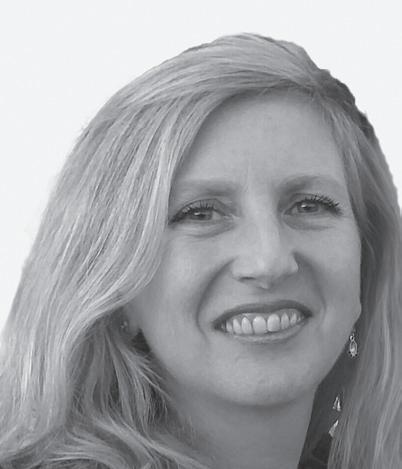


11 September 2024
08:00-18:00
Registration & badge collection
8:55-17.05 OFI Technical Commerical Conference
09:00-18:00 OFI Trade Outlook & Logistics Conference
09:00-18:00 OFI International Exhibition
3rd floor, Rotterdam Ahoy Convention Centre



SUSTAINABILITY AND CONTAMINANT CHALLENGES IN THE SUPPLY CHAIN
SUSTAINABLE PROCESSING & REFINING
09:00-09:05: Welcome from organisers and opening remarks from conference chair
Kevin Warren Smith, Chairman, Lipids Group of the Society of Chemical Industry and Lipid Scientist, Fat Science Consulting, UK
09:05-09:35: Processing and refining from the producer’s perspective and the use of waste feedstocks – the Neste experience
Sven Kuhlmann, Vice President for the Production of Renewables, Neste, Finland
09:35-10:05: Sustainable approaches to oils and fats processing and refining
Gabriele Bacchini, Global Sales Director, CMB, Italy
10:05-10:35: Special refining of lowgrade oils for food and fuel consumption
Andrea Bernardini, Commercial Director, Technoilogy, Italy
10:35-10:45: Q&A with speakers
10:45-11:30: Networking break
11:30-12:00: Production and processing of renewable diesel (HVO) and sustainable aviation fuel (SAF)
Priscilla Costa, Sales & Business Development Manager, Renewable Fuels, Crown Iron Works, USA
12:00-12:30: Press-oil clarification and lecithin production. The secret‘s in the process: The link between press-oilclarification and lecithin production
Patrick Schuermann, Application Sales Manager for Renewable Resources, GEA, Germany
12:30-13:00: Designing bleaching earths and activated carbon – the science and art
Dr Pat Howes, Technical & Marketing Director, NATURAL BLEACH SDN BHD, Malaysia
13:00-13:10: Q&A with speakers
13:10-14:40: Lunch
14:40 -14:50: Opening remarks from conference chair
Paolo Telles, Fats & Oils Processing Specialist, USA
14:50-15:20: Optimising filtration in the bleaching process
Bart Scholten, Group Business Development Manager, Envirogen Group, the Netherlands
15:20-15:50: The role and benefits of enzymatic deep-degumming for various feedstocks in biofuel production
Jorge Moreno, Product Application Expert & Technical Service Manager EMEA, DSMFirmenich, the Netherlands
15:50 -16:20: Networking Break
16:20-16:50: Speciality fats – new crystallisation and separation technologies to improve melting technologies
Dr Veronique Gibon, Consultant, Artemis Lipids by VG, Belgium
16:50 -17:20: The growing demand for waste feedstocks – optimising yields and energy efficiency in rendering Björn Schlüter, Sales & Service Director, HF Press+LipidTech, Harburg-Freudenberger Maschinenbau, Germany
17:20-17:30: Q&A with speakers and closing remarks from conference chair
Paolo Telles, Fats & Oils Processing Specialist, USA
11 SEPTEMBER 2024
08:55-09:00: Welcome from organisers and opening remarks from the conference chair
Chair: Kevin Warren Smith, Chairman, Lipids Group of the Society of Chemical Industry and Lipid Scientist, Fat Science Consulting, UK
09:00-09:30: The state of play of the activities of the European Commission on mineral oil hydrocarbons in food (remote presentation)
Veerle Vanheusden, PhD, Policy officer – Unit E2 – Food Processing and Novel Food, Directorate General Health and Food Safety, European Commission
09:30-10:00: Ensuring the safety and quality of fried goods with a focus on the formation of arcylamide and trans fatty acids – latest regulations and developments
Dr Ludger Brühl, Department of Safety and Quality of Cereals, Max Rubner-Institut (MRI), Germany
10:00-10:30: Chlorinated paraffins – the latest contaminant of concern
Dr. rer. nat. Kerstin Krätschmer, Project Leader Scientist, Wageningen Food Safety Research, the Netherlands
10:30-10:45: Q&A with speakers
10:45-11:30: Networking break
11:30-12:00: MOSH/MOAH origins and mitigation in the supply chain
Michele Marazzato, Process Development Scientist / R&D Lead Contaminants, Cargill Global Edible Oil Solutions, the Netherlands
12:00: 12:30: MOSH/MOAH in coconut oil
Speaker TBC, Philippines Coconut Authority
12:30-12:40: Q&A with speakers
12:40-14:10: Lunch
14:10-14:15: Opening remarks from conference chair
Paolo Telles, Fats & Oils Processing Specialist, USA
ROTTERDAM AHOY CONVENTION CENTRE, THE NETHERLANDS, 9-11 SEPTEMBER 2024

11 SEPTEMBER 2024
CURRENT AND FUTURE MARKET TRENDS FOR VEGETABLE OILS
09:00-09:05: Welcome from organisers and opening remarks from conference chair Frans Claassen, Managing Director, MVO, the Netherlands
09:05-09:35: Global vegetable oil market – current prices and future trends
Thomas Mielke, CEO, Oil World, Germany
09:35-10:05: The global and South American soyabean market – expectations for the year ahead
Laura Pereira, Sunflower & Olive Oil Specialist, Aboissa, Brazil
10:05-10:35: Regional oil market developments: India and China
Tim Worledge, Editorial Director, Fastmarkets, UK
10:35-11:05: Black Sea and Danube oilseed market, 2024-2025 – production, export flows and investments
Sergey Feofilov, Director General, UkrAgroConsult, Ukraine
u
11:05-11:15: Q&A with speakers
11:15-12:00: Networking break
SUPPLY CHAIN RESILIENCE IN SHIPPING
12:00-12:30: The impact of climate and geopolitical risks on oilseeds and vegetable oil trade flows
Elwin de Groot, Head of Macro Strategy, RaboResearch – Global Economics and Markets (GEM), the Netherlands
12:30-13:00: Trends in palm and soft oil freight rates
Francesco Morici, Chartering, Navquim, Spain
13:00-14:00: Lunch
SUPPLY CHAIN RESILIENCE IN SHIPPING
14:00-14:30: The Port of Rotterdam – key vegetable oil hub – and future challenges
Kesih van den Berg, Business Manager Bulk Cargo and Shipping, Port of Rotterdam, the Netherlands
(continued) TECHNICAL COMMERCIAL CONFERENCE, 11 SEPTEMBER 2024
14:15-14:45: Mitigation of MCPDEs, glycidyl esters (GE) and MOSH/MOAH and in edible oils – latest processing and refining strategies
Antonios Papastergiadis, Senior R&D Engineer, and Laboratory Manager, Desmet, Belgium
14:45-15:15: Recent developments in analysis of processing and environmental contaminants in edible oils and fats including MOSH/MOAH and Persistent Organic Pollutants (POPs)
i. A. Dr Torben Küchler, Health and Nutrition, Food Chemist / Product Manager, SGS Germany
15:15-15:25: Q&A with speakers
15:25-15:55: Networking break
15:55-16:25: Interpretation of processing contaminant analysis including MOSH/ MOAH
Dr Hocelayne Fernandes, R&D manager, QTI Services, the Netherlands
16:25-16:55: Analytical perspective of MCPD esters and glycidyl esters in processed food
Ian de Bus, PhD, Project Lead Organic Contaminants, Wageningen Food Safety Research (WFSR), the Netherlands
16:55-17:05: Q&A with speakers and closing remarks from conference chair Paolo Telles, Fats & Oils Processing Specialist, USA
Correct at time of print
14:30-15:00: The shipping market, an owner’s perspective Nils Jørgen Selvik, VP Corporate Analysis & IR, Odfjell SE, Norway
15:00-15:15: Q&A with speakers
15:15-15:45: Networking break
SUSTAINABILITY & TRACEABILITY IN THE SUPPLY CHAIN
15:45-16:15: EU sustainability demands –a round-up of EU policies, feedstock pressures and the availability of used cooking oil (UCO) and tallow Rohaise Low, Director of Oleochemicals and Biofuels Research, Agri-business division, GlobalData, UK
16:15-16:45: The EU Deforestation Regulation (EUDR) – meeting sustainability requirements
Allison Kopf, CEO, TRACT, the Netherlands
16:45-17:15: Palm oil and the EU Deforestation Regulation (EUDR): A new Roundtable on Sustainable Palm Oil (RSPO) traceability system for enhanced trade and regulatory compliance
Ruben Brunsveld, Deputy Director Market Transformation EMEA, Roundtable on Sustainable Palm Oil (RSPO)
17:15:17.45: Soyabean oil and the EUDR Gustavo Idigoras, president of the Chamber of Vegetable Oil Industry of Argentina (CIARA)
17:45-18.00: Q&A with speakers and closing remarks from conference chair Frans Claassen, Managing Director, MVO, the Netherlands
Correct at time of print

COUNCIL OF PALM OIL PRODUCING COUNTRIES (CPOPC) G01 CPM CROWN D16
NV B1 & B2
ENVIROGEN TECHNOLOGIES BV A1 EURO FED LIPID C21
FARMET AS E1






Via Di Le Prata 148 - 50041
Calenzano
Italy
Tel: +39 055 44870
E-mail: info@andreottiimpianti.com
Website: www.andreottiimpianti.com
LinkedIn: https://it.linkedin.com/ company/andreotti-impianti-s-p-a
Andreotti Impianti Spa is a first class Italian engineering company, globally recognised as one of the leaders in the design and manufacture of plants for oilseeds crushing and solvent extraction, edible oils and fats refining, and oleochemicals (glycerine, fatty acids, biofuels). The company has enjoyed worldwide success for over 60 years.

Rudolf-Plank-Str. 27
76275 Ettlingen
Germany
Tel: +49 7243 504 2000
E-mail: Info.bopt.de@bruker.com
Website: www.bruker.com/FT-NIR
LinkedIn: https://www.linkedin.com/ company/bruker-optics
Bruker provides FT-NIR spectroscopy solutions for edible oil producers as well as for processors.
To optimise the oil pressing process, the oilseeds – as well as the intermediate products like expellers or extracts –can be analysed for oil and moisture content. Moreover, oilseed breeders can obtain valuable additional information like fatty acid profiles, erucic acid as well as the glucosinolate content.
For edible oils and fats, a large number of quality parameters can be analysed with only one measurement, eg iodine value, free fatty acids (FFAs), trans fatty acids (TFAs), fatty acids and triacylglycerol profiles, and more.

Bühler AG
Gupfenstrasse 5
9240 Uzwil
Switzerland
Tel: +41 71 955 11 11
E-mail: oilseeds@buhlergroup.com
Website: www.buhlergroup.com/global/ en/industries/Oilseed.html
LinkedIn: https://www.linkedin.com/ showcase/18461924
Bühler’s product portfolio and services encompass the entire oilseed preparation value chain. This includes ship unloading, grain storage and handling, weighing, cleaning, drying, aspiration systems, conditioning, cracking, dehulling, flaking, grinding, and pelleting of hulls and extraction meal. Our plants, designed by expert engineers, ensure top productivity and high availability. For 80 years, our solutions have been proven in oil mills worldwide, handling up to 20,000 tonnes daily. Additionally, we offer product training and follow-up assistance.

Registered Office: Via Isonzo, 9 – 00148 Rome, Italy
Operational Headquarters: Via Appia km 55.900 – 04012 Cisterna di latina, Italy
Tel: +39 06 96871028
E-mail: info@cmb.it
Website: www.cmb.it
LinkedIn: https://www.linkedin.com/ company/cmb-oils-and-fats/
CMB is an engineering company and a leader in the oils & fats, oleochemical and biodiesel industrial fields, providing state-of-the-art solutions, with a team of highly-experienced professionals. The company’s R&D department

allows CMB to keep constantly updated and improve its processes. Its in-house workshop enables the manufacturing of critical equipment and plant components, with high-level construction quality and short delivery times. CMB Technologies include:
•Oilseed preparation and solvent extraction
•Oils & fats refining technologies
•Interesterification
•Enzymatic processes
•Fat/oil splitting
•Fatty acids fractional and total distillation
•Oil/fatty acids hydrogenation
•Oleic acids dry fractionation
•Biodiesel technologies
•Enzymatic biodiesel
•Methylester fractional and total distillation
•Glycerine distillation

CPM CROWN
9879 Naples St. NE Blaine MN 55449
USA
Tel: +1-651-639-8900
E-mail: crownsales@cpm.net
Website: OneCPM.com
LinkedIn: https://www.linkedin.com/ company/cpm-crown/
An innovative, global leader in oilseed extraction for 75+ years, CPM’s Crown offers custom process engineering, proven technologies, equipment, piloting and aftermarket support for crush, refining, biofuels, renewable diesel (HVO) pre-treatment, oleochemicals, plant-based proteins, hemp/ CBD and other speciality extraction.
Crown’s Global Innovation Center, with a full-scale pilot plant, analytical lab and training facilities, equips customers to develop, test, scale and commercialise to meet market demands profitably, efficiently and sustainably with minimal risk.
Crown, a division of CPM Holdings Inc, is a 145-year-old, Minnesota-based company with offices around the world.
u


Graha Mandiri 31st Floor, Jl. Imam Bonjol Kav. 61, Jakarta, 10310
Indonesia
Tel: +62 21 3157305
E-mail: secretariat@cpopc.net
Website: www.cpopc.net
LinkedIn: https://id.linkedin.com/ company/cpopc
The Council of Palm Oil Producing Countries (CPOPC) is an intergovernmental organisation established on 21 November 2015 with Indonesia and Malaysia being the founding countries. In 2023, Honduras joined the membership which is open to countries with substantial areas of oil palm plantation and are net exporters of palm oil. Colombia, Ghana, and Papua New Guinea are the Observer Countries that mark transitions to be full members.
The council aims to unite the world’s palm oil producers, representing the priorities, interests, and aspirations of palm oil-producing countries within the developing world. The secretariat is based in Jakarta, Indonesia.

Belgicastraat 3 Bus 1-2 1930 Zaventem
Belgium
Tel: +32 2 716 11 11
E-mail: info@desmet.com
Website: www.desmet.com
LinkedIn: https://www.linkedin.com/ company/desmet
Desmet is a leading global provider of custom-
engineered plants and equipment for the food, feed and biofuels industries.
Our reliable and innovative technologies transform oilseeds, grains and tropical oils into protein feed/food, edible oils/fats, oleochemicals and biofuel.
We deliver best-in-class expertise through 3 long-standing brands: Desmet, RoseDowns and Stolz with a combined experience of over 300 years.

Penningweg 71
1507VS Zaandam
The Netherlands
Tel: +31 752047200
E-mail:NLinfo@envirogengroup.com
Website: www.envirogengroup.com
Linkedin: https://www.linkedin.com/ company/envirogengroup/
Envirogen Group provides filtration and water treatment solutions with a strong focus on the food and beverage industry.
Envirogen Group supplies a full range of filtration equipment like filter cartridges, filter bags, self cleaning strainers and pressure leaf filters including spare leaves. For your water needs we provide installations to produce purified water to make up water for the boiler using softeners, reverse osmosis or ion exchange units. Our team of experienced engineers is available to support you to find your best filtration or separation solution to reduce your operational costs.

Euro Lipid Lipid eV
PO Box 90 04 40
60444 Frankfurt am Main Germany
Tel: +49 69 6860 4846
E-mail: info@eurofedlipid.org
Website: https://eurofedlipid.org/
Euro Fed Lipid eV is a federation of 11 scientific associations dedicated to advancing the science and technology of oils, fats, and lipids.
Representing 2000 members, Euro Fed Lipid unites experts from academia and industry across Europe to foster collaboration, cooperation, innovation, and networking in the field.
The organisation promotes lipid science and technology through international congresses and the publication of the ‘European Journal of Lipid Science and Technology.’
Key activities include organising events like the Euro Fed Lipid Congress and Expo, symposia, and awarding excellence in lipid research.

Jiřinková 276
552 03 Česká Skalice
Czech Republic
Tel: +420 491 450 158
E-mail:oft@farmet.cz
Website: www.farmet.eu
LinkedIn: https://www.linkedin.com/ company/8201369
Farmet a.s., a Czech company founded in 1992, is a worldwide leading specialist in turnkey delivery of oilseeds pressing plants and feed extrusion technologies. The company is a strong partner in the field of complex oilseeds and vegetable oil processing, feed extrusion and feed milling technologies.
Farmet’s wide product portfolio ranges from individual machines, to small plants and large-capacity plants using different oilseed screw presses and feed extruders with different capacities.
Farmet’s hexane free technologies are based on its own R&D, and the company provides customers with the most cost-effective, economic and environmentally friendly solutions.











oil refining processes, olive and crude palm oil recovery, biodiesel and HVO pre-treatment and production, as well as oleochemical applications with complete process lines. Our focus is always to create as much value from the raw material as possible.
1035 Greene St, Piqua, Ohio 45356
USA
Tel: +1 937 773 3424
E-mail: marketing@frenchoil.com
Website: https://frenchoil.com https://www.linkedin.com/company/ the-french-oil-mill-machinery-co./
French Oil Mill Machinery Co is a fourth generation family-held US company and is a world leader in the manufacture of preparation and mechanical extraction of a wide variety of oil-bearing materials. Our heavy-duty mechanical screw presses offer the highest yield in oil recovery and our unique water cooling or steam heating capability on our presses provides the highest quality cake and oil. In addition to presses, we also manufacture cooking/conditioning, cracking and flaking equipment. We also have a testing facility in Piqua, Ohio with heavy duty scalable equipment to test customers’ unique material and applications.

Werner-Habig-Str. 1 59302 Oelde, Germany
Tel: +49 25 22 77-0
Website: www.gea.com
GEA is one of the world’s largest systems suppliers for the food, beverage and pharmaceutical sectors. Our portfolio includes machinery and plants as well as advanced process technology, components and comprehensive services. Used across diverse industries, they enhance the sustainability and efficiency of production processes globally. With extensive expertise in centrifugal separation technology GEA supports edible

Schlachthofstrasse 22 21079 Hamburg
Germany
Tel: +49 40 77179-0
E-mail: service-plt@hf-group.com Website: www.hf-press-lipidtech.com/en/ LinkedIn: https://www.linkedin. com/showcase/hf-press-lipidtechharburg-freudenberger-maschinenbaugmbh/?viewAsMember=true
Ever since HF Press+LipidTech was first established, the company has been dealing with oilseed processing in its many facets. Today HF PLT focuses on delivering customised solutions to the edible oil industry, and delivers a complete portfolio of oilseed preparation, oil seed pressing, crude oil cleaning, service and maintenance worldwide.
The product portfolio also includes special presses and apparatus for animal waste products or special applications in the dewatering sector.

Sales & Engineering Office: Atasehir Bulvari, Gardenya Plaza 5, D:19, 34758
Atasehir, Istanbul Turkey
Workshop: Ege Serbest Bolge, Mumtaz
Sokak, No.20, 35410 Izmir
Turkey
Tel: +90 216 456 37 03
E-mail: hum@hum.com.tr makine@hum.com.tr Website: www.hum.com.tr
LinkedIn: www.linkedin.com/company/ hum-oil-&-fat-technologies
With over 60 years of unparalleled experience, HUM Oil & Fat Technologies specialises in cutting-edge edible oil plant and plant units, manufacturing excellence, and toptier engineering solutions.
Headquartered in Istanbul, the dedicated team manages the entire process from design to installation, providing seamless project execution and expert commissioning support.
The workshop in Izmir produces high-quality equipment, including conditioners, crushers, flakers, cookers, and screw presses for oilseed crushing and edible oil refining plants.
HUM also provides comprehensive in-house engineering services and valuable guidance for renovation investments, ensuring optimal efficiency and performance for esteemed partners. At HUM, innovation and exceptional quality exceed expectations.

Westervoorsedijk 73 HG, 6827 AV Arnhem
The Netherlands
Tel: +31 88 9494 300
E-mail: info@hygear.com
Website: https://hygear.com/ LinkedIn: https://www.linkedin.com/ company/hygear/
HyGear makes reliable, affordable, on-site and on-demand (bio)hydrogen accessible. As a hydrogen technology provider, HyGear takes the lead in both hydrogen generation with a low or carbon-negative footprint and in the production and supply of sustainable gas.
With its Hy.GEN®, Hy.REC and Hy.PURE systems, HyGear can generate (bio)hydrogen from gases and recycle and purify sustainable gas. HyGear’s product portfolio also includes carbon capture, oxygen removal and gasas-a-service. Across various industries, clients have relied on HyGear’s solutions since 2002, offering advantages in reliability, costeffectiveness, and a reduced environmental footprint.

JJ-LURGI ENGINEERING SDN
BHD
No 7-13A-01, Level 13A
Jebsen & Jessen Tower
UOA Business Park (Tower 7)
Jalan Pengaturcara U1/51A, Seksyen U1 40150 Shah Alam, Selangor Darul Ehsan
Malaysia
Tel: +603 5030 6363
E-mail: jj-lurgi_enquiry@jjsea.com
Website: www.jj-lurgi.com
Linked-In: https://www.linkedin.com/ company/jjlurgi/
JJ-Lurgi is a joint venture between Jebsen & Jessen Pte Ltd Singapore and Air Liquide Global E&C Solutions, Germany. Our engineering roots are in Germany; in Asia, we have established a strong network to support our key clients across the Asia Pacific region.
With a combined experience of more than 200 years, JJ-Lurgi has become a reputable technology provider in the oils and fats industry.
We provide proven technologies for oilseeds extraction, refining of edible oils, fats modification, oleochemicals and biodiesel plants. We support our clients from design through to installation and commissioning, while our dedicated After Sales Service team provides support for troubleshooting, plant upgrading and automation, spare parts and process consultation.

JOHANNES FILTRATION BV
Amsteldijk Noord 33, 1422 XX Uithoorn
The Netherlands
Tel: +31 297 785 129
E-mail : sales@johannesfiltration.com
Website: www.johannesfiltration.com
LinkedIn: https://www.linkedin.com/ company/56406196/
Johannes Filtration BV is a wholly-owned subsidiary of Tapis Teknik Sdn.Bhd. Tapis Teknik Sdn Bhd is a manufacturing company based in Johor Bahru, Malaysia. We have been serving the edible oil and chemical industries in Asia for over 40 years with our filtration products.
Johannes Filtration was set up to better serve its clients in Europe and Africa. Our common motto is to forge good long-term working relationships and to provide filtration solutions for our clients.

J RETTENMAIER & SOHNE
GMBH + CO KG
Holzmühle 1
73494 Rosenberg Germany
Tel: +49 7967 152-393
E-mail: filter@jrs.de
Website: www.jrsfiltration.com
LinkedIn: https://www.linkedin.com/ company/jrsrettenmaierundsoehne/
At JRS, we are meeting customer needs with our innovative products and optimised solutions for HVO feedstock, biodiesel and oil and fat refining. FILTRACEL® cellulose filter aids are an excellent environmentally-friendly and costeffective alternative to mineral filter aids such as DE and perlite. In addition, JRS produces filterable adsorbents, which combine several functionalities in one product. These are used, for instance, as a (partial) replacement for bleaching earth and silicate/silica gels with great success.
As the market leader in cellulose filter aids and adsorbents, our tailored solutions enable more effective edible oil and biofuel processing for a sustainable future.

KROHNE NEDERLAND
Kerkeplaat 14
3313 LC Dordrecht
The Netherlands
Tel. +31 78 6306201

E-mail: infonl@krohne.com
Website: www.krohne.nl
LinkedIn: https://www.linkedin.com/ company/krohnegroup
KROHNE is a leading global manufacturer and supplier of industrial process instrumentation solutions. Established in 1921, KROHNE provides cutting-edge measurement technology and services for flow, level, temperature, and pressure applications across various industries, including edible oils and its sister industries.
Renowned for innovation and quality, KROHNE’s offers unique technology and therefore a unique view to this industry. With solutions to industry challenges such as high degree of wear and tear, sublimation of impurities, and high CAPEX and OPEX costs. Committed to customer satisfaction, KROHNE combines advanced engineering with extensive industry expertise to deliver reliable, accurate, and efficient process control solutions worldwide.
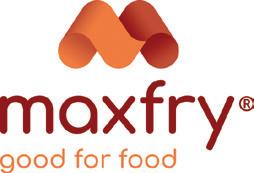
MAXFRY GMBH
Grabenstraße 3
58095 Hagen
Germany
Tel: +49 2331-39 69 711
E-mail: info@maxfry.de
Website: www.maxfry.de
LinkedIn: https://www.linkedin.com/ company/maxfry-gmbh/
Maxfry GmbH was founded in 2002. Since its foundation, the family-owned and managed company has focused on improving the technical properties of vegetable oils and fats. Maxfry® specialises in the thermal and oxidative stabilisation of oils and fats in the food industry. Comprehensive consulting services, as well as olive oil analysis – the only assessment of its kind in the world – complete the company’s portfolio.

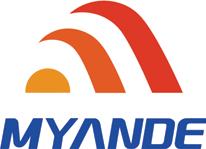
Natural Bleach Sdn Bhd is a pioneer in the promotion of bleaching earths pre-blended with activated carbons for everyday refining.
MYANDE GROUP CO LTD
No.199, South Ji’an Road, Yangzhou, Jiangsu, China
Tel +86 514 87849111
E-mail: info@myande.com
Website: www.myandegroup.com/ LinkedIn: https://www.linkedin. com/company/myande-group-coltd/?viewAsMember=true
Myande Group is a globally leading supplier of complete plants, equipment and services for oils & fats, starch & derivatives, evaporation & crystallisation, material storage and handling, and smart factory industries.
Myande focuses on supplying one-stop engineering services covering general layout plans, process design, R&D, equipment manufacturing, automatic control system, data integration, installation, supervision, commissioning, training etc. Myande Group currently has 130,000m2 of in-house design and manufacture base, in which there are 1,200+ employees including 500 technical staff and 700 manufacturing workers. More than 1,000 plant equipment have been supplied by Myande in around 80 countries since 2003.
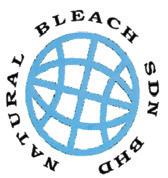
NATURAL BLEACH SDN BHD
11 Jalan SS18/6, Subang Jaya, 47500
Petaling Jaya, Selangor Darul Ehsan, Malaysia
Tel: +603 5633 9305
E-mail: info@naturalbleach.com
Website: www.naturalbleach.com
Natural Bleach Sdn Bhd was established in 1994 to design, manufacture and market environmentally friendly and cost-effective natural and acid-activated bleaching earths and their blends with activated carbons, for use in the refining of edible and non-edible oils.
Our blended products are a direct substitute for conventional bleaching earths, offering superior impurity removal performance, good filtration performance, low oil retention and no breakthrough of fines, leading to fully-refined oils with enhanced appearance and stability.

Cuaco Road Barrio Pampanga
Davao City Philippines
Tel: +63 82 234 0692
E-mail: info@newasiaoil.com
Cherielynntan@newasiaoil.com
Website: www.newasiaoil.com
New Asia Oil Incorporated was founded in 1990. Its primary purpose is to produce and export high-quality, competitively priced crude coconut oil that meets international market standards, including compliance with MOSH MOAH limits.
The company grew over time and was able to expand and venture into manufacturing of RBD oil, coconut fatty acid distillate, cochin oil and copra expeller meal. The company’s incorporators take great pride to achieve significant success having started humbly as copra traders in the 1960s. The company now exports to different parts of the world including Australia, China, Taiwan, Korea, Japan, Europe, India and the USA.
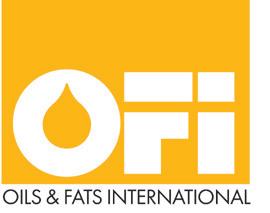
Quartz House, 20 Clarendon Rd. Redhill
Surrey RH1 1QX, United Kingdom
Contact: Mark Winthrop-Wallace, Sales Manager, Tel: +44 1737 855114
E-mail: markww@quartzltd.com. Serena Lim, Editor
Tel +44 1737 855066
E-mail: serenalim@quartzltd.com
Website: www.ofimagazine.com
LinkedIn: https://www.linkedin.com/ company/87178070
https://www.linkedin.com/ groups/4759702/
The Oils & Fats International (OFI) portfolio has been serving the oil crops and animal fats industry since 1985, offering publishing, events, online exposure and social media connections to this global industry.
The OFI magazine is published eight times a year with a total worldwide printed circulation of 6,300 copies and a digital edition reaching over 12,500 recipients. Additional printed copies are circulated at major industry events.
Each issue looks at the entire oils and fats supply chain including feedstocks; commodity trading; transport, storage & logistics; processing, technology & instrumentation; as well as trends, legislation and statistics.
The OFI weekly newsletter delivers the most important news in the oils and fats industry to approximately 12,500 inboxes every week and can be received free of charge via this link: www.ofimagazine.com/e-newsletter

5 Mercury Avenue
Bagumbayan, Quezon City
Philippines 1100
Tel: +63 2 8635 0680
E-mail: contactus@oleofats.com
Website: oleofats.com
LinkedIn: linkedin.com/company/oleofats
Oleo-Fats Incorporated is a leading manufacturer and exporter of speciality food oils and ingredients from the Philippines. With over 30 years of industry experience, we specialise in providing high-quality fats, oils, and customised products tailored to both local and international markets. A commitment to innovation and sustainability, and adherence to the latest technologies and safety standards ensure that we deliver exceptional solutions for diverse food industry needs.

47 Allée d’Irlande, Z.A.C Artoipole 62223 Feuchy, France
Tel: +33 3 21 553600
E-mail: Hello@olexapress.com
Website: www.olexapress.com
LinkedIn: www.linkedin.com/company/ olexa/
Olexa is a leading French company specialising in the design and manufacturing of systems for extracting oils and fats, as well as other specialised applications. With nearly a century of expertise, OLEXA® provides customised solutions worldwide, proudly maintaining a 100% Made in France quality standard.

PATTYN BELGIUM NV
High Hul 2, 8000 – Bruges
Belgium Tel: +32 50450480
E-mail: info@pattyn.com
Website: www.pattyn.com
LinkedIn: https://www.linkedin.com/ company/pattyn-packing-lines
Based on more than 65 years of experience, Pattyn offers high performance packaging lines, improving efficiency and packaging quality, minimising product giveaway, increasing capacity and reducing packaging costs. Thanks to our proven and reliable packaging technology, we can offer total solutions, from box set-up to palletising, and this is 100% made by Pattyn. In this way, your packaging process is completely carefree.
With eight divisions, the Pattyn Group is a global player where more than 500 employees support more than 1,000 customers. This includes a service team of more than 60 people worldwide who will support you wherever you are.

PMI TECH (EUROPE) BV
Helmkamp 48
7091 HR Dinxperlo
The Netherlands
Tel: +31 315 652 803
E-mail: info@pmi-group.nl
Website: https://www.pmi-group.com/ LinkedIn : https://www.linkedin.com/ company/pmi-tech-europe-bv/
Established more than three decades ago, PMI-Technology is one of the largest suppliers of filtration equipment in the world. With a proven track record and innovative capability, the company provides comprehensive support services to its clients all over the world, with local offices in Europe, North America, and Malaysia.
Our products consist of a diverse range of filter presses, pressure leaf and tube filters, bag and cartridge filters, agitators and designing, fabricating, and installing steel works for pressure vessels, tanks, piping and specialised processing equipment for a wide range of engineering-related industries.

POLYTEC GMBH
Polytech GmbH
Polytech-Platz 1-7
76337 Waldbronn
Germany
Tel: +49 7243 6040
E-mail: analytics@polytec.de
Website: www.polytec.com/de/ prozessanalytik or www.polytec.com/eu/process-analytics
LinkedIn: https://de.linkedin.com/ company/polytec
Polytec has been manufacturing and distributing analytical measuring systems worldwide for

more than 40 years. With our Near-Infrared inline (NIR) process analysers for the edible oil industry, we help manufacturers to optimise their quality control, reduce costs and increase yields.

Avenida del Acero 14-16
19200 Azuqueca de Henares Guadalajara, SPAIN
E-mail: info@sepigel.net
Website: www.sepigel.net
LinkedIn: https://www.linkedin.com/ company/sepigel/
Sepigel® is the brand of bleaching earths for the purification, refining and bleaching of oils and fats, manufactured by Minersa Group, an international mining and chemical Spanish group with a sales volume superior to 2M tonnes and production and mining sites in 12 countries in Africa, Europe and America.
Sepigel® has more than 35 years of experience in the market developing highquality solutions, with sales on five continents and a presence in large groups and worldleading refineries. Our extensive know-how and our cutting-edge technology enable us to offer the ideal adsorbent for every type of oil and / or fat: From naturally active clays to highly activated clays.

LTD
R-664, T.T.C. Industrial Area, MIDC Rabale, Navi Mumbai, Maharashtra , India 400701
Tel : +919820029829, +91 22 27696331
E-mail:- sales@sharplexfilters.com
Website : www.sharplex.com
LinkedIn: https://www.linkedin.com/ company/sharplex-filters-india-pvt-ltd/

Sharplex Filters (India) Pvt Ltd is a premier manufacturer of high quality filtration solutions with a major thrust in the edible oil industry. With a strong commitment to innovation and quality, Sharplex provides a range of advanced filtration equipment’s designed to ensure purity and efficiency in edible oil processing. Their product includes vertical and horizontal pressure leaf filters, pulse jet candle filters, spare filter leafs, polishing bag filters, which are engineered to meet the stringent demands of edible oil production enhancing product clarity and safety. Leveraging state of the art manufacturing facilities and team of expert engineers, Sharplex has established itself as trusted partner for the edible oil industry’s filtration needs.

ST Equipment & Technology
101 Hampton Ave, 02494 Needham Massachusetts USA
Tel: +1 781 972-2300
E-mail : info@steqtech.com
Website: https://steqtech.com/
LinkedIn: https://www.linkedin.com/ company/st-equipment-technology
ST Equipment & Technology (STET) is a leading provider of specialised separation technology for powder processing industry.
They offer innovative solutions using their proprietary triboelectrostatic belt separator, which efficiently separates fine particles based on their electrostatic properties.
This technology is used to process a variety of materials, including fly ash, minerals, food, and feed products, improving resource recovery and reducing environmental impact.
STET focuses on sustainable and costeffective methods, delivering high-performance separation equipment that enhances product quality and reduces waste.
Their expertise extends to engineering support, process optimisation, and technical consulting services for clients worldwide.
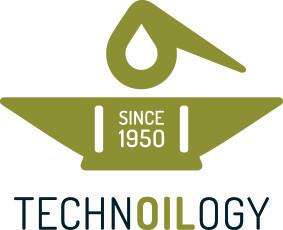
Via D. Federici 12-14
04012 – Cisterna di Latina
Italy
Tel: +39 (0)6 9696181
E-mail: info@technoilogy.it
Website: www.technoilogy.it
Linkedin: https://www.linkedin.com/ company/technoilogy
TECHNOILOGY is an international engineering company specialised in the design and manufacturing of industrial plants for edible oils extraction and refinery, oleochemicals, biodiesel production, waste oil pre-treatment for biofuel production such as HVO and SAF, and used mineral oil re-refining.
The company is owned by the Bernardini family, active in the fats & oils industry since 1950.
With three branch offices in Malaysia, Dubai and India, and 12 representative offices throughout the world, TECHNOILOGY has installed more than 1,450 industrial units worldwide. The company office compound, located 70km away from Rome, includes a highly specialised workshop of 28,000m2 where key components are manufactured.

Trajan Scientific and Medical Stefansbecke 42, 45549 Sprockhövel, Germany
Tel: +49 2339 12090
E-mail: info@axelsemrau.de
Website: www.axelsemrau.de/en
LinkedIn: https://www.linkedin.com/ company/trajan-scientific-and-medical
Trajan Scientific and Medical acquired Axel
Semrau GmbH in 2021. This expanded Trajan’s capabilities in automation, chromatography, and software.
Our major focus is the efficient automation of complex workflows in the laboratory. Sample preparation and analysis techniques of GC-MS and LC-MS are integrated into one workstation. We develop hardware and software which enables time efficient design of the workflows.
Our product range includes the CHRONECT Workstations for MOSH/MOAH for mineral oil contaminants; MCPD for MCPDs and glycidols; analysis of phtalates in edible oil; and other solutions for food analysis using LC-GC technology.
For more information, please visit www.axelsemrau.de/en/

Plot 75, Sector 3, IMT Manesar Gurgaon-122051, Haryana, India
Tel: +91 124 4273011-14
E-mail: sales@uec-india.com
Website: www.uec-india.com
LinkedIn: www.linkedin.com/ company/18227028/
United Engineering is a global supplier of plant, equipment and complete automated solutions for the vegetable oil extraction industry. We specialise in manufacturing screw presses with capacities ranging from 1 TPD to 700 TPD, and offer comprehensive solutions for cold pressing, insect protein extraction and dewatering Presses. Our expertise includes conditioners/ cookers and high-capacity hammer mills. We provide complete engineering, design and equipment for seed preparation, mechanical extraction, filtration and refining of oils, ensuring efficient and high-quality production processes. Additionally, we design, supply, and fabricate Automated Bulk Tank Farms and Cross-Country Piping, and provide General Contracting globally as a process integrator for vegetable oils, sugar, and agriprocessing industries.












BV
Boylestraat 34, 6718 XM Ede
The Netherlands
Tel: +31 318 64 11 44
E-mail: info@crushingmills.com
Website: www.crushingmills.com
LinkedIn: https://www.linkedin.com/ company/87140663
Crushing Mills is the flaking division of the Van Mourik Group.
The Van Mourik Group has decades of experience in the food/feed processing industry and develops and builds complete turnkey installations for the processing of dry materials including for the animal feed industry.
The Crushing Mills Division is an independent Dutch manufacturer of flaking mills. These machines are widely used in, among others, the animal feed, edible oils and food industries on several continents.
Crushing Mills supplies the flaking machines and process knowledge to achieve the correct setup when it comes to various types of grain, oilseeds or pulses and desired end product.

Oils & Fats International (OFI) is the market-leading magazine dedicated to commercial issues within the oils and fats industry. Since 1985, the magazine has gained a reputation for presenting key issues with a business focus and continues to provide an authoritative and objective source of information for everyone involved in this multi-billion dollar industry. OFI is part of Quartz Business Media, UK, a leading international exhibition and publishing company.








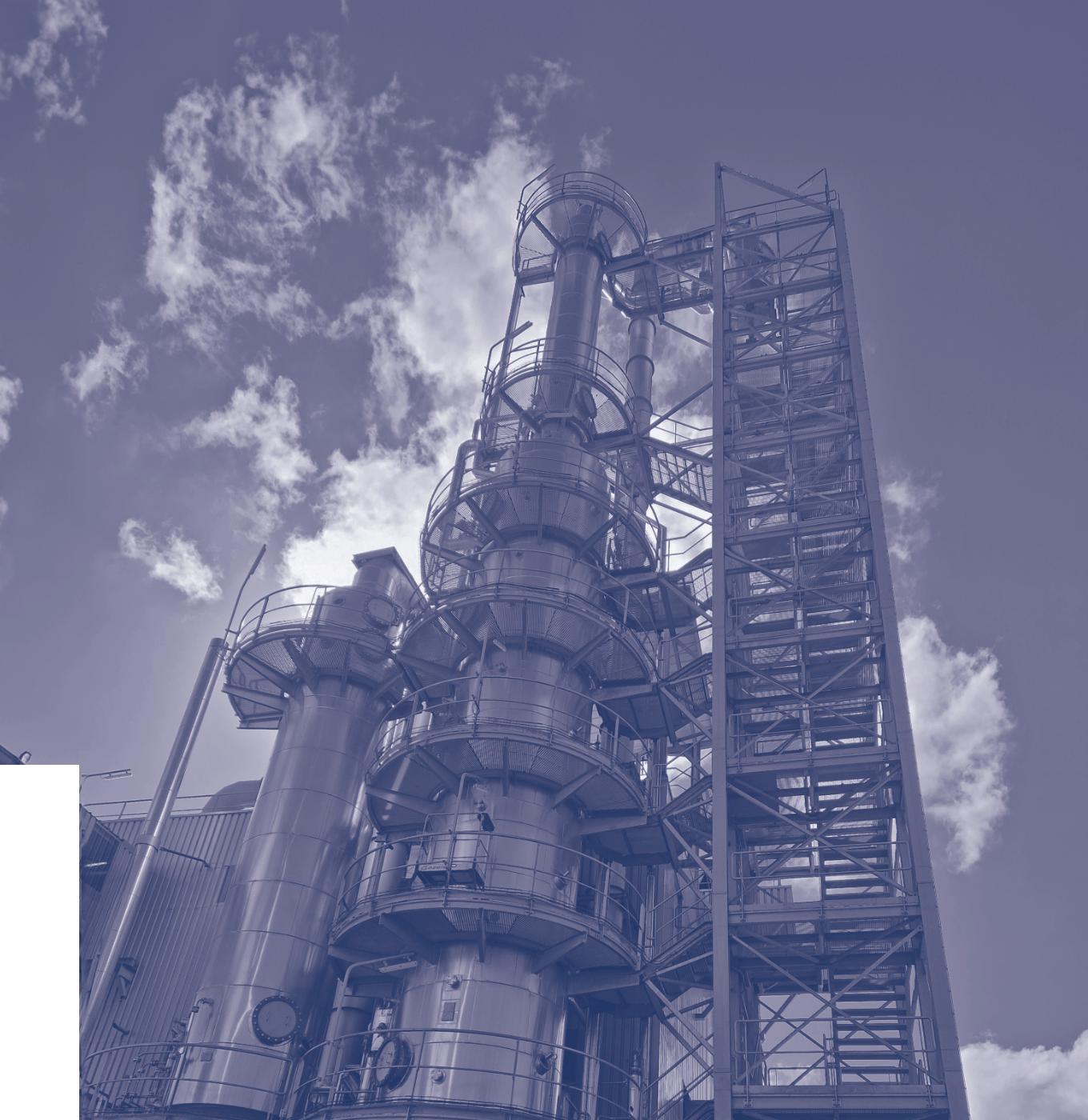

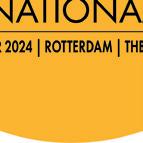




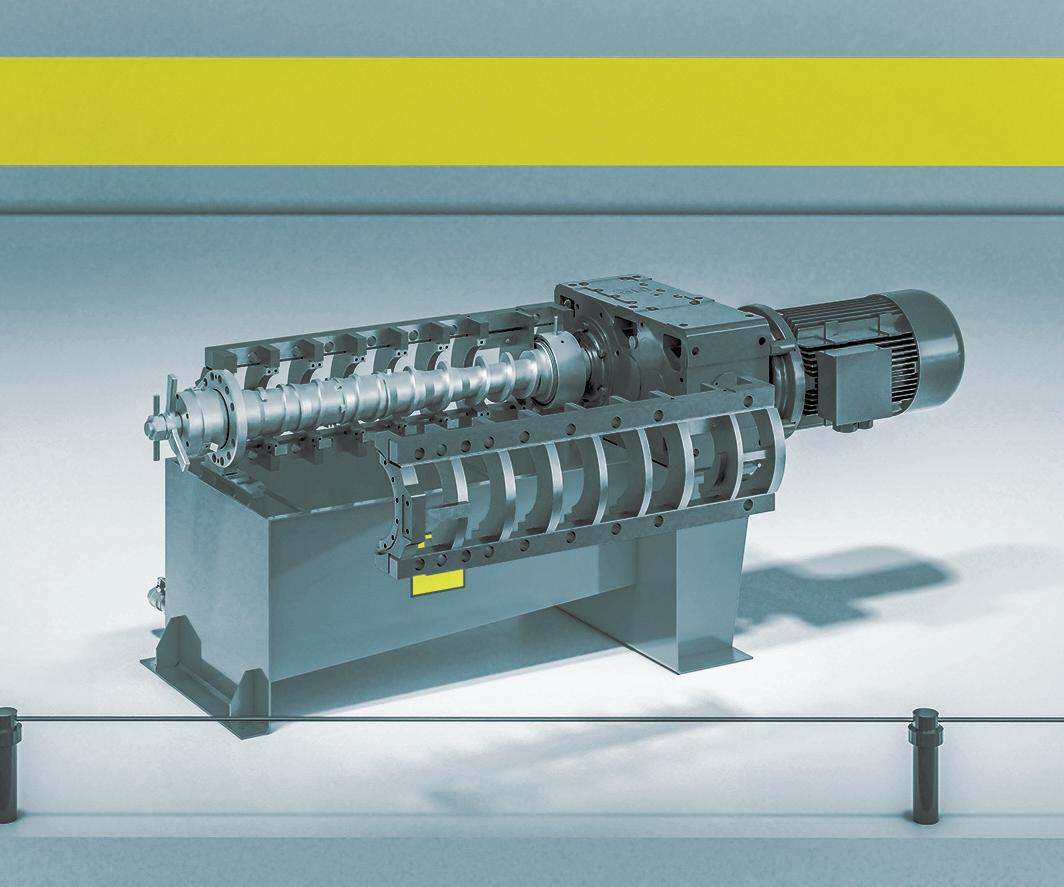
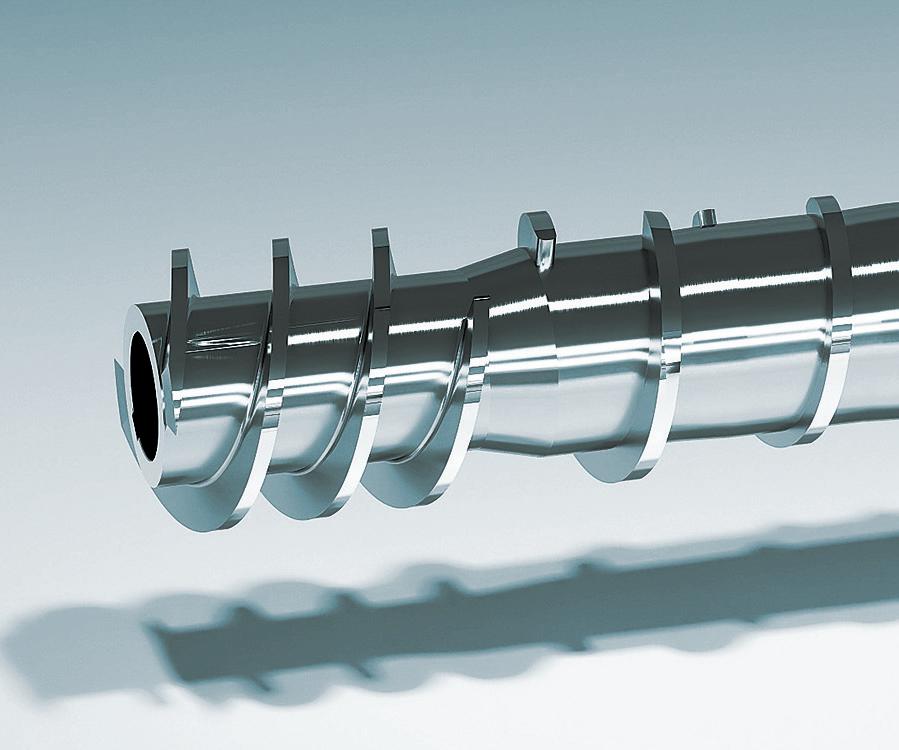










VISITUS ON STANDF3